Introduction
Writing systems
- The japanese writing systems is made with 3 kind of characters: Kanji, Hiragana and Katakana.Hiragana and Katakana represent sound, so they are always pronounced the same way, but there are used differently.
Katakana is used for foreign words (テレビ: "Terebi" = TV) so it's less frequent.
Here's an example:
アメリカ 人 です。
America - person - "is".
Pronouns can be omitted in japanese. like in this example. So this sentence could mean "I am american" or "He/She is american".
アメリカ (A-Me-Ri-Ka) is written in Katakana, like most foreign words.
人 (Jin) is a Kanji. It means person.
です (~ is) is written in Hiragana.
Hiragana
For the sake of simplification, consider that everything can be written in hiragana.Hiragana Chart :
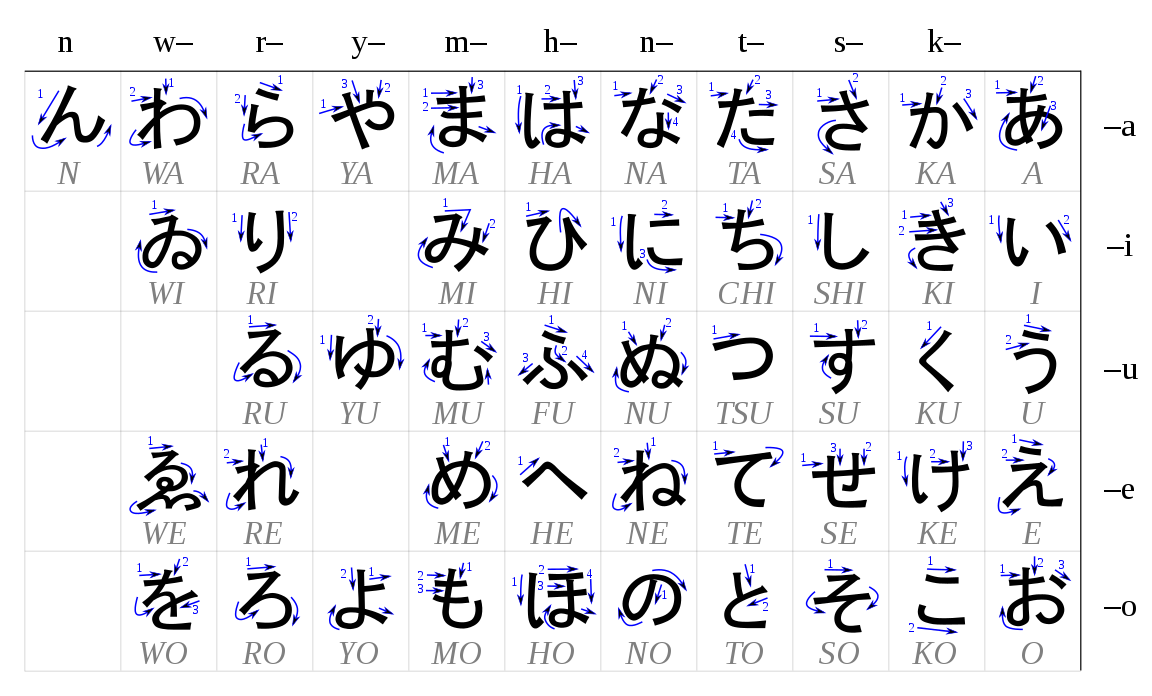
Katakana
Katakana is used mostly for foreign words or onomatopoeia.It's the same sounds as hiraganas but written differently.
It's more rigid in appearance.
Like so : ひらがな (Hi Ra Ga Na) - カタカナ (Ka Ta Ka Na)
Katakana Chart:
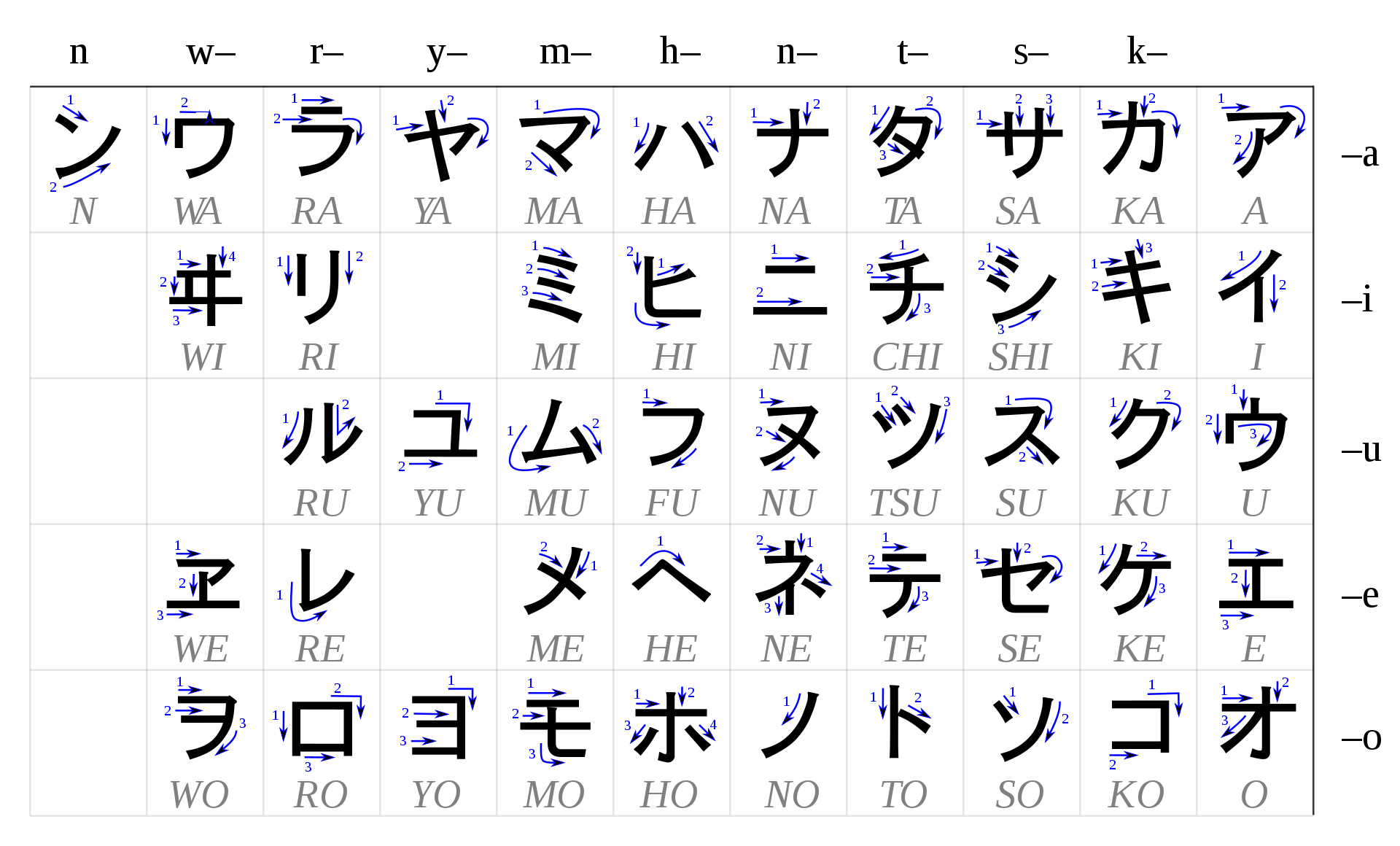
Kanjis
Kanjis are characters borrowed from chinese.They can represent an idea/concept, a sound or both.
They can be read in different very ways.
私 can be read わたし (watashi) or あたし (atashi).
You can think about them like emoticons :
I ❤️ japanese from the bottom of my ❤️.
❤️ is written the same but have different readings (love and heart in this eemple).
The reading are divided in two categories :
- on'yomi (from Chinese)
- kun'yomi (native Japanese)
Some kanjis can have a lot of different readings. That's why it's often recommended in your studies to only focus on the concept/meaning. and learn readings in the context of vocabulary.
However, there are a lot of different opinions on what is the "best way" to study kanjis.
Kanjis are made of small parts called radicals.
明 : bright (日: sun + 月: moon)
Those radicals can be Kanjis themselves.
- 山 (mountain)
- 木 (tree)
- 火 (fire)
There are a lot more to the study of kanjis. but this deck focus on grammar.
Furigana
We saw that Kanji have different readings.To help knowing how to read the kanji, there can be the reading written above the Kanji.
It's written in hiragana and is called furigana.
Furigana are always included in this deck.
Rōmaji
Rōmaji is a way to write japanese sound in english alphabet.It exists so you can pronounce japanese without being able to read it.
Example : ありがと (japanese) = arigato (rōmaji).
Translations
The translations are here to help you understand the sentence.Don't learn them or rely on them too much.
Keep in mind that Japanese and English are two very different languages that work differently.
Some concepts don't translate well, because they don't have a counter part.
It can even be counter productive to find an english equivalent.
The idea is to understand japanese. not translate it in an other language.
Politeness
The Japanese language possesses a speech-level hierarchy that determines how one should address any given person based on various factors: relationship, age, role, respect, etc.Typically, Japanese learners are first introduced to polite speech. This is because polite speech is what is used in most daily interactions.
However, the greatest flaw made by introducing polite speech first lies in the fact that it is not the base form of speech.
Politeness is an auxiliary element to conversation. The purpose is not to provide information other than social implications.
Grammatically, plain speech is what makes up the base form of the language.
It's the basis for conjugation, to which politeness is then added.
As a rule of thumb, the longer the word (with a prefix like お) or the sentence, the more respectful it is.
Polite suffix
Japanese use differents honorifics, usually attached to the name.Sama
The most formal honorific suffix is -sama, and it’s used for God (kami-sama) and royalty (ohime-sama).
San
The most common formal honorific is -san, it translates (approimately) to Ms. and Mr. .
Chan
This is an endearing female honorific. While it’s most commonly used for children, it’s also used fairly widely among family and friends.
Kun
This is the male equivalent of –chan, it’s used for kids and between peers and friends.
You'll also find the prefix お (O) and ご (Go) beforn noun to make it sound more polite.
Omission
In japanese, you can convey a lot of information with a few words.Context, or social awareness plays a massive part in understanding the language.
Pronouns are usually omitted in japanese, implied by context.
Gender and plural
There is no gender and plural in japanese.It is understood by context.
In short sentences given as examples, more than one translation are possible.
学生 can mean student or students, and the student(s) can be a boy or girl.
Pronouns
Japanese usually avoid pronouns and use the person's name instead.Sentence Structure
In Japanese, word order is more flexible than in English.Information is structured around particles.
Particles, not word order, are what determines how each part of a sentence relates to the verb.
They are placed after the word they are attached to.
A usual japanese sentence names a subject, objects marked by particles and ends with the verb.
There are usually ending particles after the verb that give a general tone to the sentence.
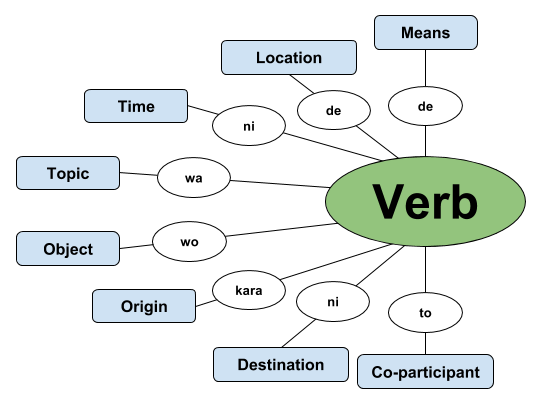
https://8020japanese.com
Basic Sentence
だ - Is
だ is a copula.It's not the verb "to be" but it can be translated as "is".
It is used to declare what one believes to be a fact.
だ can be omitted, but it's very casual.
⚠ No だ and だ's conjugations after い-Adjectives.
Both だ and い-Adjectives express a state of being, one following the other would be a redundancy and grammaticaly incorrect.
私だ。 It’s me. (casual)
本だ。 It’s a book. (casual)
猫だ。 (It) is a cat. (casual)
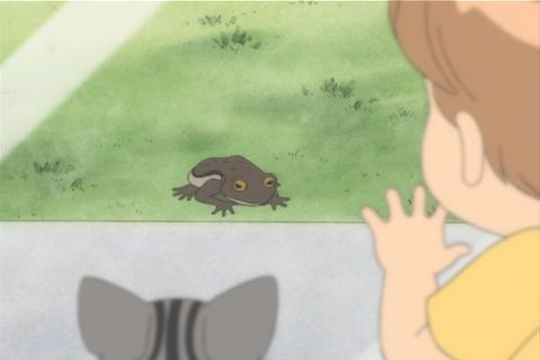
|
蛙だ |
|---|---|
| It's a frog. | |

|
海だ |
| It's the ocean! | |

|
飴だ |
| Candy... | |
です - Is (polite)
です is a copula.It indicates politeness and always goes at the end of a sentence.
In english both だ and です can be translated by the verb "To be", which leads to confusion.
です is used in polite sentences and can be seen as the polite form of だ, but it's not.
They are not the same, They are used differently grammaticaly.
Because です indicates politeness, you can use it after い-Adjectives whithout redundancy, You can't with だ.
トムです。 I am / It is Tom. (polite)
お 母さんです。 She is (my/her/his) mom. (polite)
レストランです。 It is a restaurant. (polite)

|
畑です |
|---|---|
| It's a farm. | |

|
好きです |
| I like you. | |

|
笹子です |
| It's me, Sasako! | |
は - Topic particle
は is a particle that indicates the topic of the sentence."A は B だ" is the most basic sentence structure.
It means A is B.
は is pronounced わ, The prononciation changed over the years but the spelling as は stayed.
トムは 先生だ。 Tom (as the topic of this sentence) is a teacher.
私はトムです。 I am / It is Tom. (polite)
明日は 月曜日だ。 Tomorrow (as the topic of this sentence) is Monday.
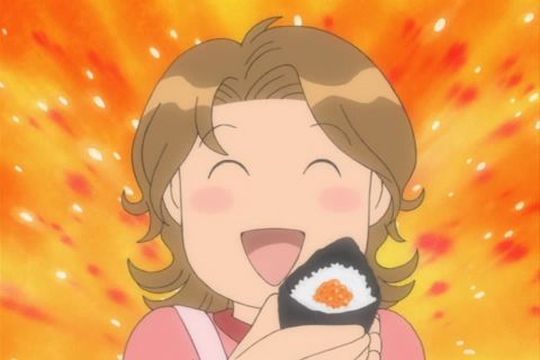
|
私はイクラ |
|---|---|
| I have salmon roe. | |

|
俺は 本物だ |
| I'm the real deal! | |

|
私は 神です |
| I'm a god. | |
じゃない - Is not
To turn a positive sentence into a negative one, you can replace the copula だ by じゃない."A は B じゃない" means A is not B.
The full form is : ではない, but では can be abbreviated to じゃ.
There can be many combinations with various degrees of politeness :
ではありません
じゃありません
ではないです
じゃないです
じゃん
⚠ No だ and だ's conjugations after い-Adjectives.
Both だ and い-Adjectives express a state of being, one following the other would be a redundancy and grammaticaly incorrect.
犬じゃない。 (It) is not a dog.
先生じゃない。 (I) am not a teacher.
一人じゃない。 You are not alone.

|
私は 敵じゃないわ。 |
|---|---|
| I'm not your enemy. | |

|
お 勉強じゃない |
| That's not homework. | |

|
人間は 仲間じゃない |
| Humans are not comrades. | |
ではありません - Is not (polite)
You can replace the copula です by ではありません to make the sentence negative.では can be abbreviated by じゃ.
There can be many combinations with various degrees of politeness.
From polite to casual:
ではありません
じゃありません
ではないです
じゃないです
私は 中学生ではないです。 I am not a junior high student.
彼女はお 医者さんではないです。 She is not a doctor.
彼は 高校生ではありません。 He is not a high school student.

|
落語ではありません |
|---|---|
| It's not traditional story telling. | |

|
伴 音ではありません |
| I am not Tomone. | |

|
そういう 問題ではありません |
| That isn't the issue here. | |
か - Question particle
Add か at the end of a declarative sentence to turn it into a question.Unlike English, word order does not change in Japanese when changing a sentence into a question.
The sentence has to go up in pitch (upward intonation) to indicate a question.
か is like an oral "?".
か is usually used with a period : か。
For casual questions, か can be replaced by the other particle の or just omitted.
お 元気ですか。 Are you fine? (How are you?)
お 名前は 何ですか。 What is your name ?
いくらですか。 How much is it ?

|
僕ですか |
|---|---|
| Me? | |
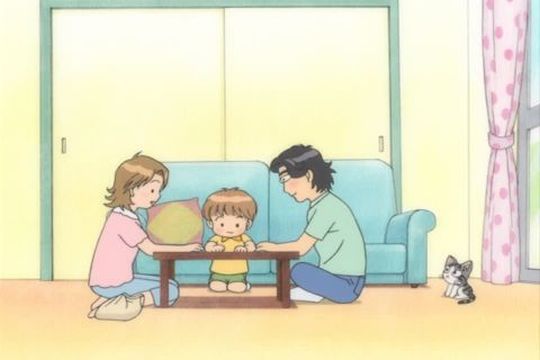
|
陽平 君は 元気ですか |
| Is Youhei-kun well? | |

|
はい! こうですか? |
| Right! Like this? | |
Adjectives
い-Adjectives
There are two type of adjectives, い-Adjectives and な-Adjectives.い-Adjectives are called that way because they always end in い.
い-Adjectives behave like verbs and can be conjugated.
Therefore, they can be placed at the end of a sentence.
You don't need to add a verb or a copula to make a correct sentence.
Because い-Adjectives already behave like verbs, you cannot add だ or one of his conjugation after it.
It would be redundant.
You conjugate the い-Adjective directly.
However, you can add です for politeness.
今日は 暑い。 It is hot today.
面白い 映画。 An interesting movie.
高いです。 That is expensive.

|
すごい! |
|---|---|
| Incredible! | |

|
あ~ 暑い! |
| Man, it's hot! | |

|
大きい…。 |
| It's huge... | |
な-Adjectives
There are two type of adjectives, い-Adjectives and な-Adjectives.They are called な-Adjectives beacuse you attach な to the adjective before a noun.
Few な-Adjectives can also end in い (like 綺麗 : きれい, pretty), but い-Adjectives all end in い.
Conjugating な-Adjectives is the same as conjugating nouns.
By conjugating the copula, That's why you can place the copula だ after a な-Adjectives.
暇な一 日。 A free day. (A a day with nothing to do)
私は 暇だ。 I am free. (I am bored or I have nothing to do)
彼は 静かだ。 He is quiet.

|
静かだ |
|---|---|
| It's quiet. | |

|
元気だよ。 |
| Yeah, I'm okay. | |

|
上手だ。 |
| Very nice. | |
Conjugation - Copulas
だった - Past
You can conjugate the copula だ.The positive past form is: だった.
It can be translated as "was" or "were".
⚠ No だ and だ's conjugations after い-Adjectives.
Both だ and い-Adjectives express a state of being, one following the other would be a redundancy and grammaticaly incorrect.
トムだった。 It was Tom.
大変だった。 (It) was terrible.
便利だった。 (It) was convenient.

|
元気だった? |
|---|---|
| How've you been? | |

|
ダメだったの |
| It didn't work? | |
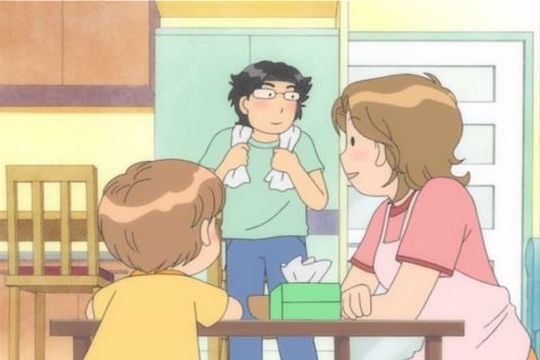
|
大変だったわね |
| It must've been tough outside, right? | |
でした - Past (polite)
You can conjugate the copula です.The positive past form is: でした.
It can be translated as "was" or "were".
ラッキーでした! I was lucky!
犬でした。 It was a dog.
猫でした。 It was a cat.

|
大変でしたね |
|---|---|
| That must have been rough. | |

|
いいお 湯でした |
| That was a great bath... | |

|
残念でした |
| Nice try. | |
じゃなかった - Past negative
You can conjugate the copula だ.The negative past form: ではなかった or じゃなかった.
It can be translated as "was not" or "were not".
⚠ No だ and だ's conjugations after い-Adjectives.
Both だ and い-Adjectives express a state of being, one following the other would be a redundancy and grammaticaly incorrect.
りんごじゃなかった。 (It) was not an apple.
簡単じゃなかった。 That wasn't easy.
昨日は、 日曜日ではなかった。 Yesterday was not Sunday.

|
夢じゃなかった |
|---|---|
| It wasn't just a dream. | |

|
夢 じゃ なかっ た |
| It wasn't a dream? | |

|
えっ 天竜寺じゃなかった? |
| Oh, it wasn't Tenryuuji? | |
ではありませんでした - Past negative (polite)
You can conjugate the copula です.The negative past form: ではありませんでした.
It can be translated as "was not" or "were not".
コーヒーではありませんでした。 It wasn't coffee.
私は 昨日、 暇ではありませんでした。 I didn't have free time yesterday.
チキンではありませんでした。 That wasn't chicken

|
わたくしも 嫌いではありませんでした |
|---|---|
| I must admit, I'll miss it here. | |
Pronoun
何 (なに) - What
何 (なに) means what.When used as a prefix, the reading changes to なん.
It's followed by a counter, like 時 (time). 何時 means what time.
何 or 何だ can also be used as interjection meaning "what!".
何で means "why ? or how ?".
なに! What ! (Interjection)
何 時ですか。 What time is it ?
何ですか。 What is that?

|
何? |
|---|---|
| What? | |

|
何ですか。 |
| What is that? | |
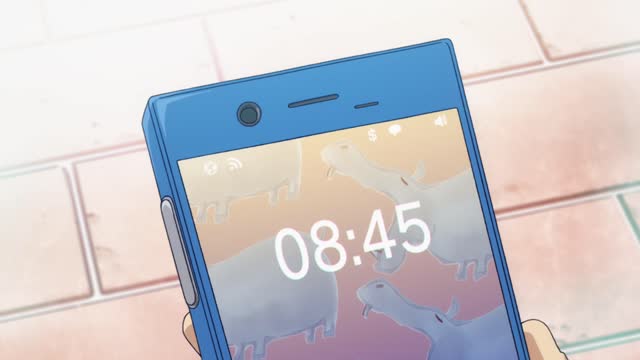
|
えっと 何 時だ? |
| What time is it? | |
これ - This
Demonstratives indicate which entities are being referred to.They follow the same pattern of こ そ あ, ordered by proximity.
これ : This, Close to the speaker.
それ : That, Close to the listener.
あれ : That, Far from speaker and listener.
This pattern is sometimes called Kosoado (こ そ あ ど).
これは 何ですか? What is this?
これは 本です。 This is a book.
これは 犬だ。 This is a dog.

|
こ これは 何ですか? |
|---|---|
| Wh-What is this? | |

|
何 これ |
| What is this? | |

|
これ? |
| This? | |
それ - That
Demonstratives indicate which entities are being referred to.They follow the same pattern of こ そ あ, ordered by proximity.
これ : This, Close to the speaker.
それ : That, Close to the listener.
あれ : That, Far from speaker and listener.
This pattern is sometimes called Kosoado (こ そ あ ど).
それは 本です。 That is a book. (near listener)
それは、ギターです。 That is a guitar. (near listener)
それはケーキです。 That is a cake. (near listener)

|
それ 何 |
|---|---|
| What's that? | |

|
それは 弁当 |
| That's a boxed lunch (bento). | |

|
それは 魚! |
| That's a fish (sakana)! | |
あれ - That over there
Demonstratives indicate which entities are being referred to.They follow the same pattern of こ そ あ, ordered by proximity.
これ : This, Close to the speaker.
それ : That, Close to the listener.
あれ : That, Far from speaker and listener.
This pattern is sometimes called Kosoado (こ そ あ ど).
あれは 何? What is that (over there)?
あれは 電車です。 That (over there) is a train.
あれは 朝ごはん。 That (over there) is breakfast.

|
あれは? |
|---|---|
| What was that? | |

|
あれは どんな 本? |
| What's that book like? | |

|
あれは 何 |
| What was that? | |
この - This (+ noun)
When これ それ あれ are followed by a noun, we replace the れ by の.They follow the same pattern of こ そ あ, ordered by proximity.
The difference between これ and この is that この directly describes what comes directly after it.
この その あの must be followed by a noun.
この : This, Close to the speaker.
その : That, Close to the listener.
あの : That, Far from speaker and listener.
This pattern is sometimes called Kosoado (こ そ あ ど).
この 飲み物は 何ですか? What is this drink?
この 動物は 猫です。 This animal is a cat.
この 時計は 高いですか。 Is this watch expensive?
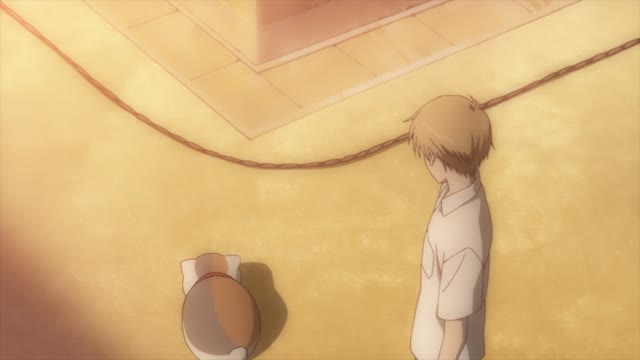
|
この 縄 |
|---|---|
| This rope... | |

|
この 人 |
| This guy. | |

|
何 この 会話 |
| What is this conversation? | |
その - That (+ noun)
When これ それ あれ are followed by a noun, we replace the れ by の.They follow the same pattern of こ そ あ, ordered by proximity.
The difference between これ and この is that この directly describes what comes directly after it.
この その あの must be followed by a noun.
この : This, Close to the speaker.
その : That, Close to the listener.
あの : That, Far from speaker and listener.
This pattern is sometimes called Kosoado (こ そ あ ど).
その 動物はサルです。 That animal is a monkey. (near listener/previously mentioned)
そのバスは 速い。 That bus is fast. (near listener/previously mentioned)
その 仕事は 難しいです。 That job is difficult. (near listener/previously mentioned)
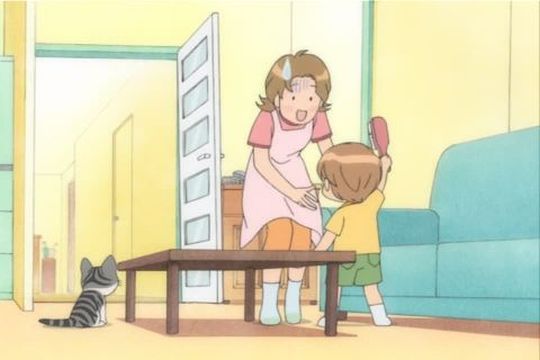
|
そのブラシ |
|---|---|
| That brush... | |

|
その 声は… |
| That voice... | |

|
その 荷物… |
| What's with those bags? | |
あの - That over there (+ noun)
When これ それ あれ are followed by a noun, we replace the れ by の.They follow the same pattern of こ そ あ, ordered by proximity.
The difference between これ and この is that この directly describes what comes directly after it.
この その あの must be followed by a noun.
この : This, Close to the speaker.
その : That, Close to the listener.
あの : That, Far from speaker and listener.
This pattern is sometimes called Kosoado (こ そ あ ど).
あの is also an interjection, when you're unsure about what to say (well; um; er..)
あの 人はトムです。 That person is Tom.
あの ラーメン屋は 美味しいです。 That ramen shop is delicious.
あの 日は 雨だった。 That day (long ago) was rainy.

|
あの 車… |
|---|---|
| That car... | |

|
あのバカ… |
| That idiot… | |

|
あの 林も? そう |
| Those trees? -Yes. | |
ここ - Here
We follow the usual pattern of こ そ あ, for locations as well.ここ そこ あそこ are used to refer to a place.
ここ : Here, Close to the speaker.
そこ : There, Close to the listener.
あそこ : Over there, Far from speaker and listener.
ここです。 (It’s) here.
ここは、 台所。 Here is the kitchen.
ここは 遊ぶところじゃない。 This isn't a place to play.

|
ここだ |
|---|---|
| In here. | |
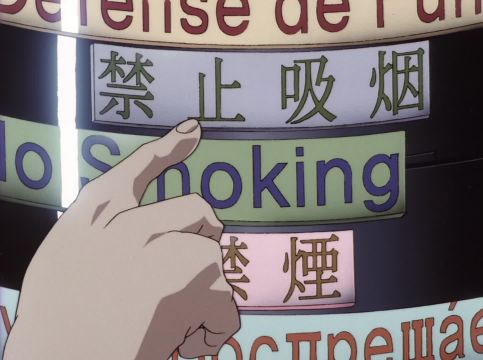
|
ここは 禁煙だ |
| ...no smoking in here. | |

|
ここいいー |
| This is nice. | |
そこ - There
We follow the usual pattern of こ そ あ, for locations as well.ここ そこ あそこ are used to refer to a place.
ここ : Here, Close to the speaker.
そこ : There, Close to the listener.
あそこ : Over there, Far from speaker and listener.
そこ。 There. (previously mentioned or near listener)
たぶん、そこ。 There. probably. (That place)
そこは、トイレです。 That place is the bathroom (toilet). (near listener)

|
そこだ |
|---|---|
| Look at that. | |

|
ほら そこだよ |
| See? There's the dock. | |

|
そこは 暖かく |
| It's warm | |
あそこ - Over there
We follow the usual pattern of こ そ あ, for locations as well.ここ そこ あそこ are used to refer to a place.
ここ : Here, Close to the speaker.
そこ : There, Close to the listener.
あそこ : Over there, Far from speaker and listener.
あそこは 静か。 It is quiet over there.
ほら あそこ。 Look there.
あそこは 寒い。 It's cold over there.

|
あそこだ |
|---|---|
| Over there. | |

|
砂糖は あそこだ |
| The sugar's over there. | |
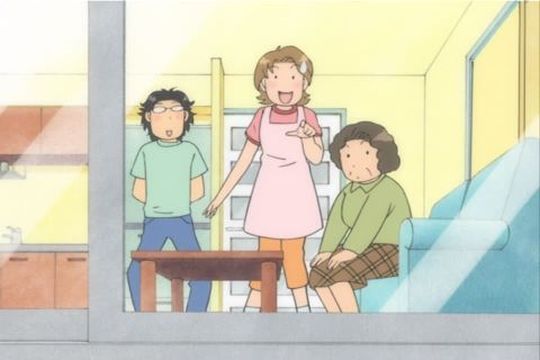
|
ほら あそこ |
| Look there. | |
Conjugation - Present
Stem form
There are る-verbs (Ichidan - group 1) and う-verbs (Godan - group 2).The last hiragana of the verb indicates the group.
る verbs always end in る.
う verbs end in various hiragana, and sometimes end in る as well.
The verb without the last hiragana is called the "stem form".
It's upon that stem form that all conjugations are built.
Verbs are by default presented in what is called the Dictionary or plain-form.
It's called that way because that's how you will find a verb in a Dictionary.
Non Past - Postive Form
The present tense is used to describe something habitual or frequent.It can also represent something you'll be doing in the future.
Because it can describe actions for both present and future, it is sometime called "non past form" as it's more accurate than just present.
Non Past - Negative Form
Ichidan : take off る and add ない (casual).Godan : replace the last う sound with the matching あ sound, Add ない.
Godan : for verbs that end in う, it becomes わ rather than あ.
Non Past - Polite form
All polite verbs end with ます.It's the more polite version of the Dictionary / plain form.
Most textbooks will introduce the polite form has the conjugation "by default", It's because you're expected to speak in formal way before a casual way.
However remember that the polite form is a conjugation form.
Particles
は - Topic particle
は is a particle that indicates the topic of the sentence.But by omitting the rest of sentence, は can be used to ask question, usually about some information shared by the questioner and listener.
晩ご飯は? How about dinner ?
トムさんは。 What about Tom ?
私はジョンです。 I am John.

|
ここは? |
|---|---|
| How about here? | |

|
名前は? |
| Name? | |

|
ご 飯は? |
| What about food? | |
か - Or; whether or not
A particle which marks an alternative, a choice between two things (or more) like “or.”ここかそこ。 Here or there?
コーヒーかお 茶。 Coffee or tea.
今日か 明日。 Today or tomorrow.

|
門か 森か |
|---|---|
| The gate, or the forest? | |
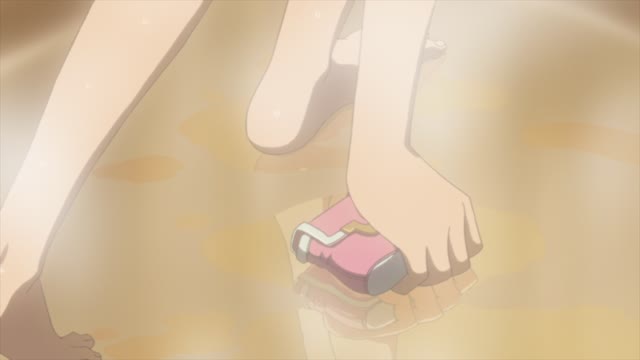
|
答えはイエスかノー |
| The answer is yes or no. | |

|
笹か 竹ください |
| Could I get bamboo or bamboo grass, please? | |
を - Indicates direct object of action
を is used to show the direct object of a sentence.Direct objects receive the action of the verb.
を is pronounced like お.
何を 飲みますか。 What will you drink?
何を 食べますか。 What will you eat?
テレビを 見ます。 I watch TV.

|
何を 作った |
|---|---|
| What did you make?! | |

|
娘を 捕らえろ |
| Get the girl. | |

|
何をする |
| What are you doing? | |
へ - To (direction, state); toward; into
へ and に are both used with locations.They are almost interchangeable.
へ emphasizes the direction of the location, It focuses on the journey.
に emphasizes a specific location, It focuses on the destination.
へ can be translated by "to" or "toward".
学校へ 行きます。 I'll go to school.
どこへ? Where to?
うちへかえります。 I'll return home.

|
みんな! 城へ~! |
|---|---|
| Everyone to the castle! | |
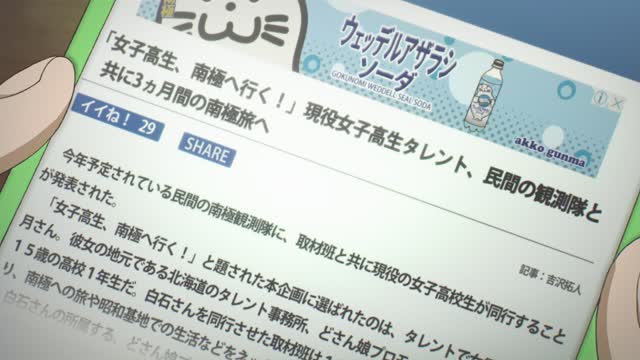
|
南極へ 行く! |
| Is going to Antarctica! | |

|
学校へ |
| ...go to school. | |
に - Direction (To; toward.)
へ and に are both used with locations.They are almost interchangeable.
へ emphasizes the direction of the location, It focuses on the journey.
に emphasizes a specific location, It focuses on the destination.
へ can be translated by "to" or "toward".
学校に 行きます。 I'll go to school.
病院に 行く。 To go to the hospital.
うちにかえります。 I'll return home.

|
家に… |
|---|---|
| To my house... | |

|
君は 家に 戻れ |
| Go back home. | |

|
海に 行きます! |
| We're going to the ocean! | |
に - Place (In; at; on)
The particle に denotes the location where someone or something exists.東京に 住む。 I will live in Tokyo.
日本にいる。 I’m in Japan.
田中さんは、 公園にいる。 Tanaka-san is in the park.

|
じゃあ 一番上に |
|---|---|
| Well then, let's put it at the very top. | |
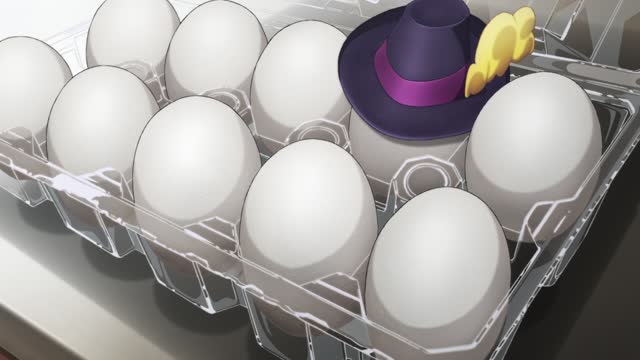
|
昔々 ある 所に |
| Once upon a time. In a certain land. | |

|
なんで 海にいるの? |
| Why is she at the ocean? | |
に - Target
に indicate targets (indirect objects).This is mostly used when you give or do something for someone.
私は 母に 手紙を 書きます。 I write letters to my mother.
私は 弟に 数学を 教えます。 I (will) teach mathematics to my younger brother.
お 父さんにプレゼントを 買います。 I (will) buy a present for father.

|
アシタカが 私に? |
|---|---|
| From Ashitaka? For me? | |

|
あたしに |
| For me? | |

|
みんなに 報告がある |
| I have some news for you all | |
に - Frequency
に follows the frequency of events over a period of time.Used as "per".
彼女は 一週間に 4 回ジムに 行きます。 She goes to the gym 4 times a week.
一週間に 3 回 働きます。 I work 3 times a week.
私は 一ヶ月に 一回 映画館 行きます。 I go to the movies once a month.

|
年に1 回のね |
|---|---|
| It's held once every year. | |

|
一週間に1 回くらい |
| About once a week. | |

|
120 年に一 度 羽化し |
| It hatches once every 120 years | |
に - Time
に follows the specific time you want to talk about, whether it's a date or an hour.Some time-expressions do not need に, like "today" or "tomorrow".
You also don't need に when you are describing regular intervals, like "every week".
金曜日に 行きます。 I will go on Friday.
10 時半に 戻ります。 I'll come back at 10:30.
明日 に来ます。 I will come tomorrow.
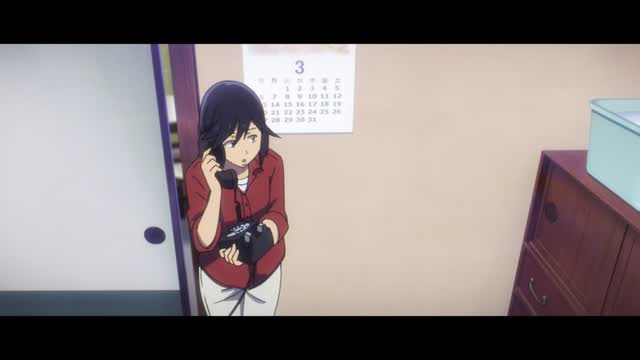
|
では 明日 7 時に |
|---|---|
| Then tomorrow at 7:00. | |

|
また 明日にする。 |
| I'll save it for tomorrow. | |

|
それは 金曜日に。 |
| Move the rest to Friday. | |
で - Range
で can express ranges, in time or space.There is a case that you don’t use the particle で even if you express a period of time,
If you express actions which take place for a while, the particle で is not generally used,
When you use the particle で, it indicates that you will complete actions,
Here are the comparisons :
1時間宿題をします。
do my homework for an hour,
1時間で宿題をします。
complete my homework within an hour.
パスポートは 六月で 切れる。 The passport expires in June.
私は1 時間で 会社に 着きます。 (I will) arrive at the office within an hour.
マンガは 世界で 有名だ。 Manga is famous in the world.
で - Means, method - by, with
で specifies the context in which the action is performed, the means, method or instruments.で follows the tool that you are using, The "tool" doesn't have to be a physical object.
It can be translated with : by, with, in, by means of …
飛行機で 帰る。 To go home by airplane.
私 達は 日本語で 話した。 We talked in Japanese.
ダンはリンゴでジュースを 作ります。 Dan will make juice by (using) apples.

|
これで 行くの? |
|---|---|
| We're going with this? | |

|
いや 名前くらいで |
| No, just by name. | |

|
なぜ 一人で? |
| Why'd you go alone? | |
で - Location of action (At; in; on)
で is used to indicate the location of an action.It can be translated with : at, in, on.
When you use an object to perform an action, で indicates what you are using.
で indicates that someone is doing something in a specific place.
そこで 何をしますか。 What will you do there (at that location).
私は 図書館で 本を 読みます。 (I will) read books at the library.
図書館で 日本語を 勉強します。 I study Japanese at the library.

|
僕 ここでいいよ |
|---|---|
| I'll be fine right here. | |

|
学校で |
| See you at school! | |

|
家で 寝たんだね |
| So he slept at home. | |
で - Amount
で can express amount,In this context, で can be placed after any word which indicates quantity.
私は100 万 円で 車を 買います。 (I will) buy the car for one million yen.
10 人でサッカーをします。 (I will) play soccer with ten people.
一人で 勉強します。 (I will) study alone.
も - Too; also; as well
も is a particle used to indicate that something that has previously been stated also holds true for the item currently under discussion.It corresponds with the English words "also" or "too", and replaces が, は or を when used.
Other particles, such as に, may be used in combination with も.
これも 古い。 This is also old.
これも 便利だ。 This is also convenient.
ノートも 必要。 A notebook is also necessary. (needed. required)
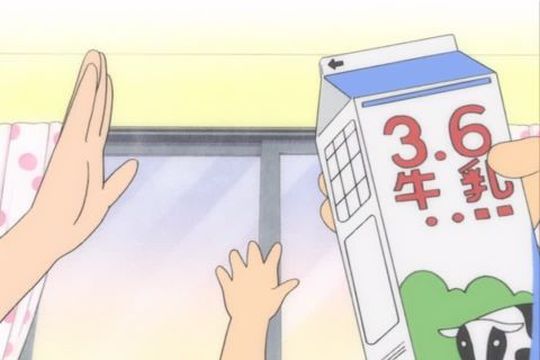
|
私も |
|---|---|
| Me too. | |

|
俺も 学校に 行く |
| I'm going to school, too. | |

|
私も 行こう |
| I'll join you too. | |
の - Possessive ( 's; of; in; at; for; by; from)
の is a particle that connects two nouns.The second noun is the main idea, the first is more specific.
It can be used to describe a possession: 私の本 (I の book = my book).
A and B in AのB relate to each other in various ways, and these relationships are determined by context.
A is the possessor of B.
A is the location where B exists.
B is about/on A.
A is a specific kind of B.
A is the object and B is the subject.
A created B.
...
これは 先生の 本だ This is my teacher's book.
私の 車はこの 車です。 My car is this car.
これは 映画の 雑誌です。 This is a movie magazine.

|
私の 名はアクア |
|---|---|
| My name is Aqua. | |

|
ここは 俺の 家だ! |
| This is my house. | |
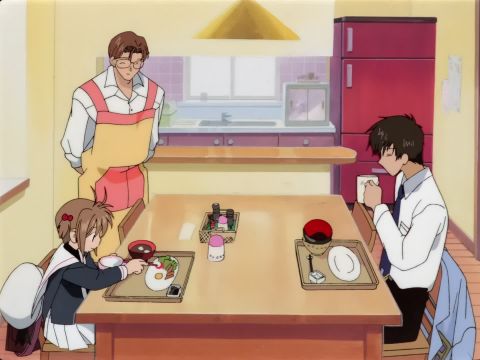
|
これが 私の 家族 |
| This is my family. | |
の - Relative locations
Between two nouns, the first one indicates the nature or attribute of the second one with the help of の.This structure is used to describe locations.
You use the particle の between a reference and the relative location.
In english, it would be translated by "of", like "in front of", "left of"...
Relative locations :
前 (in front)
うしろ (behind)
中 (inside)
猫はテーブルの 上です。 The cat is on the table.
ペンは 机の 下です。 The pen is under the desk.
銀行は 図書館のとなりです。 The bank is next to the library.

|
木の 上 |
|---|---|
| On top of the tree... | |

|
この 下 なんか… |
| There's something under here. | |

|
席は 水 瀬の 隣だ |
| Your seat is next to Minase's. | |
が - Subject marker
A particle which indicates the subject.が and は seem similar when translated in english.
は focus on the subject / theme of the sentence.
が focus on the subject, it identifies something or someone specific.
あれが、いいです。 That (over there) is good.
川が、 細い。 The river is narrow. (subject)
木が、 高い。 The tree is tall. (subject)

|
私が |
|---|---|
| I did! | |

|
俺が |
| Me? | |

|
これが いい! |
| This is the one I want! | |
が - Describing
To describe people physical attributes, we use the particles は and が.トムさんは 髪が 長いです。 Tom has long hair.
トムさんは 頭がいいです。 Tom is bright.
トムさんは 背が 高くないです。 Tom is not tall.
と - With
と is used when you want to say things are being done with someone.It comes after a noun to mean "with noun".
家族と 散歩します。 I take a walk with my family.
先生と 食べます。 I will eat with the teacher.
あなたと 私です。 (It is) you and me.

|
ううん ママと |
|---|---|
| No, I'm with my mom. | |

|
もちろん 僕と |
| With me, of course. | |

|
付き合えよ 俺と |
| Go out with me. | |
だけ - Only; just; as much as~
だけ is a particle that is often equated with the english words “only” or “just”.However, だけ differs from these words in one important respect: it expresses a maximum, not a minimum, limit.
一人だけ。 One person only;
ほしいものはこれだけ。 This is the only thing I want.
いくら 何でも 15 人だけは 来るだろう。 Surely 15 people will come at least.
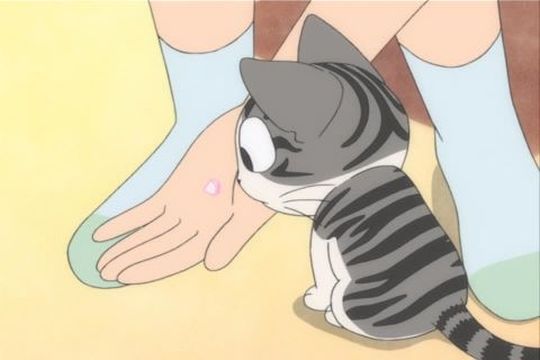
|
ちょっとだけね |
|---|---|
| I'll give you only a bit. | |

|
こいつは 口だけ |
| This one only knows how to bluff. | |

|
一本だけ |
| Just one. | |
Interogative pronouns
どれ - Which
The fourth element in the pattern こ そ あ ど is for questioning.どれ means "which ?".
どれがいいですか。 Which is good? (three or more objects)
どれを 選びますか。 Which will you choose? (three or more objects)
どれが 好ですか。 Which do you like? (three or more objects)

|
どれにしよう |
|---|---|
| I wonder what I should pick? | |

|
どれが 仙道だ |
| Which one of you is Sendo? | |

|
へえどれですか? |
| Which one? | |
どの - Which
The fourth element in the pattern こ そ あ ど is for questioning.どの means "Which ?" and must be followed by a noun.
は is not used with どの, We use が.
どの 寿司屋がいいですか。 Which sushi restaurant is good?
どのパソコンが 好ですか。 Which laptop do you like?
どの 項目をみますか? Which topic do you want to read?

|
どの 人? |
|---|---|
| Who? | |

|
どの 味にします |
| What flavor? | |

|
え? どの 絵が? |
| What? Which painting? | |
どこ - Where
The fourth element in the pattern こ そ あ ど is for questioning.どこ means "where?"
A common way to ask the location of X, is with this question:
X はどこですか。
どこに 行きますか。 Where are you going?
ここはどこ? Where is here? (What is this place?)
トイレはどこですか。 Where is the toilet?

|
ここはどこ? |
|---|---|
| Where are we? | |

|
ここどこ |
| Where am I? | |

|
それじゃどこに |
| So where are we going? | |
誰 (だれ) - Who
だれ means "Who?"Fomal form is どなた.
誰ですか。 Who is it?
誰がしますか。 Who will do it?
誰と 話ますか。 Who will you speak with?

|
誰 |
|---|---|
| Who's this? | |

|
誰 お 前 |
| Who are you? | |

|
誰なんだ お 前ら! |
| Who are you guys anyway? | |
Ending particles
な - Confirmation; admiration, etc
A sentence-ending particle that can used to express the following:- ask for confirmation from listener (…right?)
- express hope (it’d be nice if…)
- express admiration (wow…)
- express uncertainty (I wonder…)
- add general emphasis to what is being said
It can also be written as なあ.
There are some similarities with the other sentence ending particle ね (ne).
これ、 美味しいなあ。 This is really delicious.
頭が 痛いな。 I've got a headache...
すごいなあ! That's too awesome!

|
でかいな |
|---|---|
| He is really big... | |

|
いいな |
| How lucky... | |
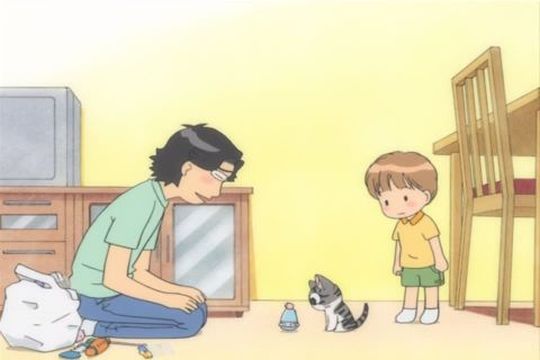
|
おかしいなあ |
| That's strange. | |
わ - Weak emphatic particle
わ is a sentence-ending particle that indicates a slightly emphatic tone.It's mainly used by a female speakers.
わ precedes other sentence ending particles such as ね or よ.
今日は、さむいわ。 It's cold today.
今日は 暑いわ。 It's hot today!
そうですわね I agree.

|
きれいだわ。 |
|---|---|
| It's beautiful. | |

|
私は 敵じゃないわ。 |
| I'm not your enemy. | |

|
大変だわ! |
| This is terrible. | |
ね - Isn't it? Right? Eh?
Japanese has a few sentence ending particles to change the tone or feel of a sentence.ね is used when seeking confirmation or agreement, like "right ?" or "isn't it ?"
いい 質問ですね!︎ That is a good question. isn't it!︎
いいですね。 That’s good right?
昨日、 忙しかったね。︎ Yesterday was busy. wasn't it!︎

|
だいじょうぶかね? |
|---|---|
| Are you feeling all right? | |

|
すごいね |
| That is amazing. | |

|
まあね |
| I guess. | |
じゃん - Isn't it? Right? Eh?
This is the contracted form of じゃない, but it's used in a way to ask "isn't it ?".It can be used to confirm or to criticize something in an informal way.
いいじゃん。 That's good, isn't it!
(石田)くんじゃん Isn't that Ishida?
すごい じゃん。 How cool!

|
ダメじゃん! |
|---|---|
| No way! | |

|
立派じゃん え? |
| They're quite splendid. | |

|
うんいいじゃん |
| Excellent! | |
でしょう - I think; it seems; probably; right?
でしょう is used at the end of a sentence when you talk about a prediction, something uncertain, or to ask confirmation.It has an uncertain tone to it.
Can be translated by "right ?" or "probably".
The contracted form is でしょ.
でしょう is the polite form of だろう.
You can use でしょうか to ask another person's opinion or guess.
これは、いい 車でしょう。 This is a good car (probably).
明日は 雨が 降るでしょう。 It will probably rain tomorrow.
そうでしょう。 Possibly.

|
何でしょう |
|---|---|
| What is it? | |

|
涼しいでしょう |
| It's nice and cool, isn't it? | |

|
何者でしょう? |
| Who could have done this? | |
だろう - I think; it seems; probably; right?
Japanese has a few sentence ending particles to change the tone or feel of a sentence.だろう is used at the end of a sentence to ask confirmation.
Sometimes this grammar is shortened to just だろ, but the meaning is the same.
だろう is more masculine or casual version of でしょう.
Can be translated by "right ?" or "probably".
だろう is the volitional form of the copula である.
ここがいいだろう。 This is a good place. isn’t it? (Here is good. right?)
明日は 晴れるだろうか。 It'll probably clear up tomorrow.
ここは、 右だろう? It's a right here. isn't it?

|
どこだろう |
|---|---|
| I wonder where she is. | |

|
君は 誰だろう? |
| Who are you? | |

|
危ないだろう |
| It's not safe. | |
かしら - I wonder
Used in informal speech, almost exclusively by females, to express a high degree of uncertainty.The male version is かなあ which is used only in fairly informal situations.
どうしたのかしら みんな What are they doing?
こっちじゃないのかしら…。 Maybe she wasn't here.
え~っと これかしら Let's see... I wonder if this is it.

|
何かしら? |
|---|---|
| I wonder what it is... | |

|
そうかしら? |
| Oh, yeah? | |

|
どういう 意味かしら |
| I'm not sure what you mean. | |
かな - I wonder; should i?
かな (kana) basically means “I wonder”, and is mostly used to:- contemplate doing something
- wonder if something will happen
There are also many other subtle meanings which could be implied based on context, including:
- expressing doubt and asking advice
- expressing hope
- offering an opinion
- making a suggestion
- asking a small favor
- expressing desire or intention
外は 寒いかな。 I wonder if it’s cold outside.
トムかな? Is that Tom?
本当かな。 I wonder if it is true.

|
誰かな? |
|---|---|
| I wonder who it is. | |

|
休みかな |
| I wonder if they're closed. | |

|
唯 大丈夫かな? |
| I wonder if Yui's doing okay... | |
よ - You know; emphasis
よ indicates certainty or emphasis, like giving new information to the listener.バスで 帰りますよ。 I will return home by bus. (adds emphasis)
トムはあそこにいたよ。 Tom was over there. (adds emphasis)
飲み物を 買ったよ。 I bought drinks. (adds emphasis)

|
ここよ |
|---|---|
| Here we are. | |

|
すげぇよ! |
| That's amazing! | |

|
これが 友達だよ |
| And that is what friends are. | |
ぞ - I'm telling you; dammit
A sentence-final particle that strongly emphasizes a (usually male) speaker's emotion or conviction about something.It's like a stronger よ, that you will usually be used by strong men in anime or manga, as it's very informal.
よ~し 行くぞ! All right! Let’s go!
頑張るぞ。 I'm going to work hard!
とうとう 日本に 来たぞ。 We’re finally in Japan!

|
いくぞ~! |
|---|---|
| Let’s do it! | |

|
よし 行くぞ! |
| Okay! Let’s go! | |
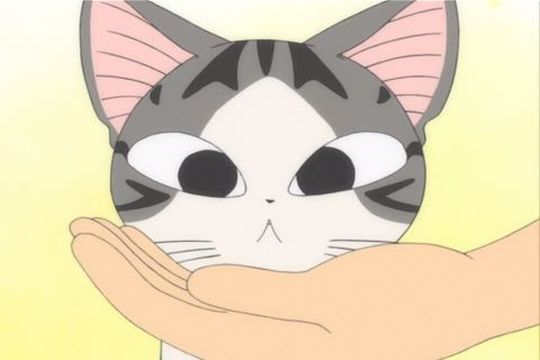
|
ほら 牛乳だぞ |
| There, it's milk. | |
の - It is that ~
With rising intonation, it indicates a colloquial question like the particle か.It's the short form of んですか.
With falling intonation, it serves to soften the statement. Women and children usually employ this second usage.
今日、 何するの。 What are you going to do today?
学校に 行くの。 I'm going to go to school.
お 金が ないの。 See, I don’t have any money.

|
話すの? |
|---|---|
| You're still going to tell me? | |

|
どうしたの |
| What's the matter? | |

|
マジなの? |
| Are you serious? | |
Verbs
する - Do; make; play ...
する can be translated as "to do" but in a broader sense than in english.You can make a noun into a verb by adding する to it.
中山さんはテニスをします。 Mr. Nakayama plays tennis.
何をしますか。 What will you do? (polite)
私は 勉強をする。 I (do) study. (casual)

|
ペンギンさん、 何にする? |
|---|---|
| What would you like, Mr. Penguin? | |

|
さて 何するかな |
| Now, then. What should we play? | |

|
バカにするなよ |
| Hey, don't make fun of me. | |
来る - To come
来る (くる) is a word meaning "to approach the temporal or spatial location ".It is therefore, quite similar to the English verb "to come", however, there are some differences in usage.
来る can also be used to express the occurrence of natural phenomena, such as sunlight, wind, earthquakes or rain.
It can also be used to express that a condition (often something negative, such as illness, injury, etc.) has progressed or advanced to a certain specified state.
It's an irregular verb.
バスが 来る。 The bus is coming
彼女はいつ 来ますか。 When is she coming?
そろそろ 来ますか。 Will you be here soon?

|
来るな! |
|---|---|
| Stay back! | |

|
あ ( 夏目) 様 雨が 来ます |
| Natsume-sama, it's going to rain. | |

|
来るか! |
| Wanna fight? | |
ある - There is; is (non-living things)
The two verbs いる and ある are used to expressed existence and not actions.We can translate it by "there is …", but it refers to the existence and not a location.
You can use it to say someone or something is somewhere.
It can also be used when an event is being held, or having objects.
It's also used with abstact things, like experiences or time, opportunities...
ある is used for non-living things.
いる is used for living things (people, animals).
ある is used for plants.
The negative informal form of ある is not あらない but ない.
この 町には 大学が 三つあります。 In this town are three universities.
仕事がある。 There is work. (casual)
いい 質問がありますか。 Are there any good questions? (polite)

|
あるよ |
|---|---|
| There's one here. | |

|
お 願いがあります |
| I have a favor to ask! | |

|
問題ありません |
| It is not a problem. | |
いる - There is; to be; is (living things)
The two verbs いる and ある are used to expressed existence and not actions.We can translate it by "there is …", but it refers to the existence and not a location.
You can use it to say someone or something is somewhere.
It can also be used when an event is being held, or having objects.
It's also used with abstact things, like experiences or time, opportunities...
ある is used for non-living things.
いる is used for living things (people, animals, but not plants).
ある is used for plants.
この 町には 日本人が 沢山います。 In this town are many Japanese.
二人の 兄弟がいます。 There are two people. (Two people exist.)
田中さんとトムがいます Mr. Tanaka and Tom are there. (exist)

|
( 瀧)くんがいる |
|---|---|
| It's really you! | |

|
人がいる |
| There's a person. | |

|
おれもいる! |
| I'm here, too. | |
Transitive and intransitive verbs
Some verbs in japanese exist like pairs.Transitive verb : an action is done by someone, the verb has an object. We use the particle を.
Intransitive verb : something happens, the verb does not have an object. We use the particle が.
試合を 始めた・ 試合が 始まった I started the match. The match started.
忘れ物を 見つけた・ 忘れ物が 見つかった I found the lost item. The lost item was found.
虫を 集めた・ 虫が 集まった I gathered bugs. The bugs gathered.
Conjugation - Past
Past - Positive Form
IchidanTake off る and add た
Godan
Take off the last hiragana and replace it by ...
く → いた
ぐ → いだ
す → した
るうつ → った
む.ぶ.ぬ → んだ
Past - Negative Form
Take the Non-Past Negative form of a verb, It ends in ない.Take off the い and replace it with かった.
Past - Polite Form
い-Adjectives conjugation
Because い Adjectives behave like verbs, you can conjugate them.Behaving like verbs, they can end a sentence.
To turn い-Adjectives into the negative form, you change the い to くない.
⚠ No だ and だ's conjugations after い-Adjectives.
Both だ and い-Adjectives express a state of being, one following the other would be a redundancy and grammaticaly incorrect.
な-Adjectives conjugation
Conjugating な adjectives is the same as conjugating nouns.By conjugating the copula.
いい conjugation
The い-Adjective いい (good) is an exeption.The word for “good” was originally 良い (よい).
When it is written in Kanji, it is usually read as よい.
All the conjugations are still derived from よい and not いい.
The conjugation pattern is the same as the other い-Adjectives.
You can add です to make it polite.
The honorific polite form of いい and よい is よろしい.
⚠ No だ and だ's conjugations after い-Adjectives.
Both だ and い-Adjectives express a state of being, one following the other would be a redundancy and grammaticaly incorrect.

|
よい 村だ |
|---|---|
| This is a nice village. | |

|
それは 良かった |
| That's good to hear. | |

|
よくないらしい |
| It seems he's in bad shape. | |
か and も suffix
何か - Something
何 means what.If you add か, it becomes "something".
It also works with other questions words:
誰か: someone
いつか: sometime
どこか: somewhere
何か 持って 来ました。 I brought something.
私が 何か 嫌なことをしましたか。 Did I do something you didn't like?
何か 忘れてる Am I forgetting something?

|
何か 言えよ |
|---|---|
| Say something. | |

|
何か 来る |
| Something's coming! | |

|
何かお 探しか |
| Are you looking for something? | |
何も - Anything, nothing
何 means what.If you add も, it becomes "nothing" or "anything.
It also works with other questions words:
誰も: no one
どこも: somewhere
The verb must be in the negative form.
For いつも, the verb can be postive or negative.
いつも: anytime, always
何も 知らないジョン・スノー You know nothing John Snow.
ここには 何も 無い。 There's nothing here.
何も 言うことはない I have nothing to say.

|
あいや… 何も… |
|---|---|
| Oh, no, it was nothing. | |

|
何も 食べないの? |
| Aren't you going to eat? | |

|
本当に 何もないの? |
| Is there really nothing? | |
誰か - Someone
何 means what.If you add か, it becomes "something".
It also works with other questions words:
誰か: someone
いつか: sometime
どこか: somewhere
誰かいますか。 Is someone here ?
誰かが 壊した。 Someone broke it.
誰かがおいしいクッキーを 全部 食べた。 Someone ate all the delicious cookies.

|
誰か 来る! |
|---|---|
| Someone's coming! | |

|
誰かいるの? |
| Is someone there? | |

|
誰かいないの |
| Is anyone home?! | |
誰も - Anyone
何 means what.If you add も, it becomes "nothing" or "anything.
It also works with other questions words:
誰も: no one
どこも: somewhere
The verb must be in the negative form.
For いつも, the verb can be postive or negative.
いつも: anytime, always
誰も 見ていない。 Nobody is looking.
誰も 知らない。 No one knows.
誰もいない。 Nobody's here.

|
誰もいない |
|---|---|
| No one's here. | |

|
誰も いないね。 |
| Where is everybody? | |

|
誰もいませんか? |
| Hello. Is there anybody in there? | |
いつか - Sometime
何 means what.If you add か, it becomes "something".
It also works with other questions words:
誰か: someone
いつか: sometime
どこか: somewhere
いつかまた. Some other time.
未来のいつか。 At some point in the future.
私はいつか 子供を 産む。 I will have children someday.

|
でも いつか… |
|---|---|
| But someday... | |

|
いつか 必ず |
| One day, for sure. | |

|
いつか… 追いつくから |
| You'll catch up eventually. | |
いつも - Always; usually; habitually
何 means what.If you add も, it becomes "nothing" or "anything.
It also works with other questions words:
誰も: no one
どこも: somewhere
The verb must be in the negative form.
For いつも, the verb can be postive or negative.
いつも: anytime, always
いつも 眠い。 Always sleepy.
私はいつも 暇だ。 I'm always bored.
いつも 傍らにいる Always by your side

|
いつもの |
|---|---|
| I want my usual! | |

|
いつものことだな |
| Is a normal thing now.. | |

|
いつも あそこにあるの |
| It's always there. | |
どこか - Somewhere
何 means what.If you add か, it becomes "something".
It also works with other questions words:
誰か: someone
いつか: sometime
どこか: somewhere
どこかへ 行きましたか。 Did you go anywhere ?
どこかに 行きたい。 I want to go somewhere.
どこかの 国。 Some country.

|
どこかへ 行くの? |
|---|---|
| Where are you going? | |

|
また どこか 行くの? |
| We're going somewhere else? | |

|
でもこの 人どこかで… |
| But, I think I've seen her somewhere... | |
どこも - Nowhere
何 means what.If you add も, it becomes "nothing" or "anything.
It also works with other questions words:
誰も: no one
どこも: somewhere
The verb must be in the negative form.
For いつも, the verb can be postive or negative.
いつも: anytime, always
どこもよくないです。 None of the places are good.
どこも変なと 来ないよね? I don't look strange anywhere. right?!
どこへも行きませんでした。 I didn't go anywhere.

|
まだどこもお 休みだな |
|---|---|
| Looks like everything is closed, still. | |

|
どこも 痛くないかい? |
| Do you hurt anywhere? | |
Adverbs
Adjectives into adverbs
An adverb precedes the verb it modifies.You can turn adjectives into adverbs.
These adverbs are normally translated with "-ly" in english.
For い-Adjective, change the final い to く.
For な-Adjective, you add に.
No particles is attached to adverbs.
何かを 小さく 切る。 To cut something into small pieces.
わたしは 毎日 自分の 部屋で 一人 静かに 勉強します。 I study in my own room quietly every day.
簡単に 説明する。 To easily eplain.

|
レグー 早く 早く |
|---|---|
| Reg, hurry, come quick! | |
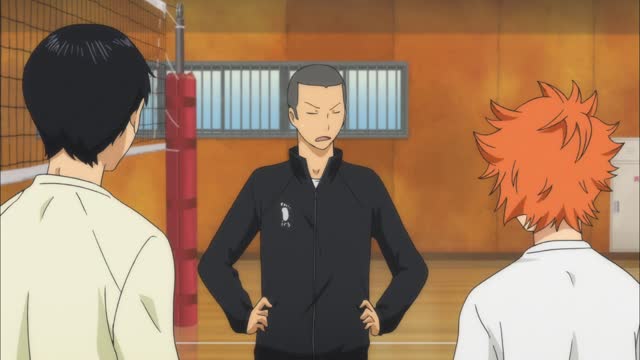
|
全然 全く 全然 |
| Absolutely not. Absolutely not at all. | |

|
皆さん お 静かに! |
| Everyone, quiet, please. | |
毎 (まい) - Every
毎 (まい) is a prefix that is directly attached to words or individual kanji (usually using their on-yomi reading),The resulting kanji compound is a noun/temporal adverb that means "each" or "every".
毎年ですか。 Is it every year?
毎日、 働きます。 I work everyday.
毎日、 忙しいです。 I am busy every day.

|
毎日毎日… |
|---|---|
| Day in and day out... | |

|
毎日 見る 夢 |
| The dream I see every day... | |

|
毎年こうなの? |
| Is it like this every year? | |
よく - Often
You can use frequency adverbs to describe how often you do something.No particles is attached to adverbs.
よく is the adverbial form of いい, so it can also mean "nicely" or "skillfully".
That's the most frequent use.
私は よく喫茶店に 行きます。 I often go to a coffee shop.
ここよく 来るの? Do you come here often?
妹はよく 笑います。 My little sister laughs a lot.

|
よく 喋るガキだ |
|---|---|
| You talk a lot, child. | |

|
よく 言われるよ |
| Yeah, I hear that a lot. | |

|
よくあることです |
| Happens all the time. | |
時々 (ときどき) - Sometimes
You can use frequency adverbs to describe how often you do something.No particles is attached to adverbs.
時 (とき) means time.
時々 (ときどき) means sometime.
私は 時々 喫茶店に 行きます。 I sometimes go to a coffee shop.
時々 背中が 痛い。 I have a pain in my back sometimes.
時々 タクシーに 乗ります。 I sometimes take a taxi.

|
時々 |
|---|---|
| Every now and then. | |

|
鹿も 時々ね |
| Sometimes deers. | |

|
時々ここに 来ていい? |
| Can I visit you once in a while? | |
全然 (ぜんぜん) - Never
You can use frequency adverbs to describe how often you do something.全然 (ぜんぜん) is an adverb that usually precedes verbs in their negative form (or adjectives with negative connotations, such as だめ) in order to express the nuance of "not at all" or "absolutely not".
Although 全然 is usually used in this fashion, it may also be used together with verbs in affirmative form in informal speech, or adjectives with positive connotations, In this case, it expresses the nuance of "very or extremely".
As with all adverbs in Japanese, the adverb precedes the verb/adjective it modifies.
いえ。 全然 。 Nope. Not at all.
私は 全然 テレビをみません。 I do not watch TV at all.
お 酒は 全然 飲みません。 I don't drink alcohol at all.

|
全然だよ |
|---|---|
| Not at all. | |

|
いや 全然 |
| No, no way! | |

|
全然 大丈夫 |
| It's fine, really. | |
もう - Already; anymore; again; other
もう is an adverb used to indicate and emphasize change of state or condition.Its translation is context dependent:
1) "already" or "now" in affirmative declarative sentences
2) "yet" or "already" in affirmative interrogative sentences
3) "(not) any more" or "(not) any longer" in negative sentences.
Like all Japanese adverbs, もう precedes the verb that it modifies.
It can also be used to express irritation.
もうだめだ。 It's no good anymore.
もう 夜です。 It's already nighttime.
もう 帰った。 They already went home.

|
もう 夏だね |
|---|---|
| It's already summer. | |

|
僕 もういいよ |
| I don't wanna play anymore. | |

|
ハハハハッ もう1 回 |
| Once again. | |
すぐ - At once
Adverb indicating short temporal or physical distance.もう すぐにね… Very soon.
はい すぐ 行きます Yes, I'll be down soon.
すぐ お 父さんに 手紙 書いて You need to write a letter to your father at once.

|
今すぐ? |
|---|---|
| Right now? | |

|
はい 今すぐ! |
| Right away... | |

|
もうすぐ 夏休みか |
| It's almost summer vacation. | |
ちょっと - A little
ちょっと means a little bit.It's often used to decline a proposal, in a soft indirect way, without directly voicing disapproval.
ちょっと 待って。 Wait a sec.
ちょっと、 君! Hey, you!
ちょっと 怖い。 I'm a little/quite scared.

|
ちょっと 待ってよ |
|---|---|
| Wait a second! | |

|
ちょっと 失礼 |
| Excuse me a minute. | |

|
ちょっと 外に 出てる |
| I'm going outside for a bit. | |
とても - Very; awfully; exceedingly
沖縄の海はとてもきれいでした。 The sea was very beautiful in Okinawa.今日はとても 暑いですね。 Today is very hot, isn't it?
1 月と 2月はとても 寒いです。 January and February are very cold.

|
とてもいい 子だった |
|---|---|
| She was a great girl. | |

|
とてもかわいい 赤ちゃん |
| It's such a cute baby. | |

|
とても 心の 優しい 人にね |
| And she's a very nice person, too. | |
たくさん - A lot
たくさん is used as an adverb modifying the amount or volume of something.いっぱい also means a lot. The two can usually be used interchangeably.
いっぱい sounds more a bit more colloquial than たくさん.
私は 京都でたくさん 写真を 撮りました。 I took many pictures in Kyoto.
野菜をたくさん 食べました。 I ate a lot of vegetables.
たくさんの 人たちがいた。 There were a lot of people.

|
たくさん 練習するの? |
|---|---|
| Do you practice a lot? | |

|
すごくたくさん 入ったわ |
| I got quite a bit in there. | |
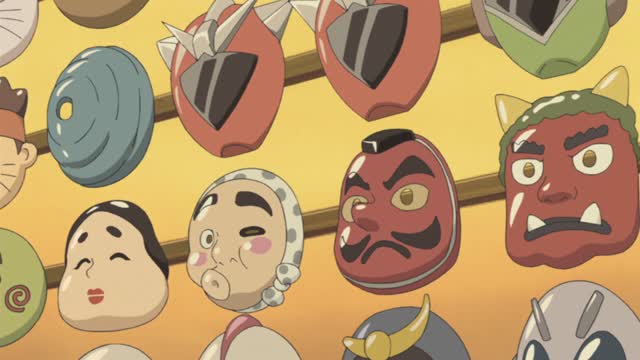
|
わぁ~! たくさんあるね |
| Wow! There're so many! | |
くらい - Approximately; about
くらい is an adverbial particle used to roughly indicate amount or extent.It is usually translated as "about" or "approximately".
It always directly follows the amount/extent that it modifies.
くらい may be freely replaced by ぐらい without a change in meaning.
百 人くらい 集まりました。 About a hundred people gathered together.
この 靴はだいたい2 万 円くらいしました。 These shoes cost about 20.000 yen.
彼は10 歳くらいだろう。 He’s about 10 years old.

|
一週間に1 回くらい |
|---|---|
| About once a week. | |

|
20 回くらい |
| Probably around twenty. | |

|
15 分くらい 前 |
| About fifteen minutes ago. | |
あまり (ない) - (Not) very, (not) much~
あまり litteraly means "too much".When used in negative sentences, it means "not very (much)" instead.
It's usually used in negative sentences.
あんまり is a variant of あまり and usually used in conversation.
In limited situations, あまり can be used in affirmative sentences, too, In this case, it means 'very; too' with a negative implication.
あまり always precedes the verb.
たけしさんはあまり 勉強しません。 Takeshi does not study much.
この 本はあまりよくない。 This book is not very good.
あまり 調子がよくありません。 I don’t feel very well.

|
あまり 感心するなよ |
|---|---|
| Don't be so impressed. | |

|
あまり 高いものは 駄目だぞ |
| Nothing expensive. | |
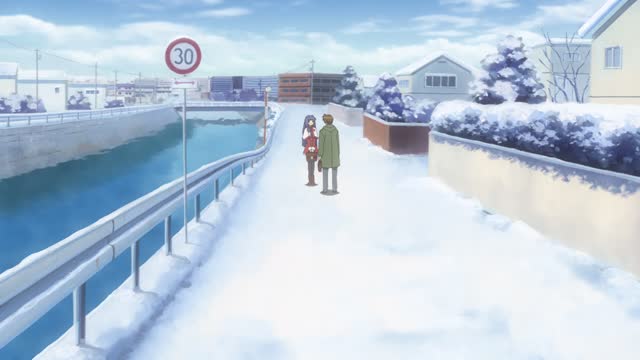
|
いや あんまり |
| No, not really. | |
Numbers
Numbers 1-10
Numbers 1-10 for counters
Number + も
You can add も to a number when you want to say "as many as".Number + しか + Negative
You can add しか to the number and turn the predicate in the negative form whan you want to say "as few as" or "only".Counters
Counters
Japanese use different words when counting items.They are called counters.
The counter is placed after the number.
Here is a few counter eemples :
People: 一人 (nin) *Special eceptions are made for one person (一人, "hitori") and two people (二人, "futari")
(Small) objects: ー個 (ko)
Long thin objects (inc, bottles): ー本 (hon)
Thin, flat objects (inc, sheets of paper): ー枚 (mai)
Drinking glasses: ー杯 (hai)
Places: ー箇所 (kasho)
Seconds: 一秒(byou)
Minutes: 一分(fun)
Hours: 一時間(jikan)
Days: ー日 (nichi)
Weeks: 週間 (shuukan)
Months: ーヶ月 (kagetsu)
Years: ー年間 (nenkan)
Nights (spent overnight somewhere): ー泊 (haku)
Rolls of things (inc, scrolls): ー巻 (kan)
Pages: 一ページ (peeji)
Books: 一冊(satsu)
Letters: 一葉(you)
Homes: 一戸(ko)、一軒(ken)、一棟(mune)
Tatami mats: 一畳 (jou)
Tsubo (3.31 square meter area): ー坪 (tsubo)
Small animals (inc, most insects): 一匹 (hiki)
Large animals (and some insects): 一頭 (tou)
Birds (and rabbits): 一羽 (wa)
Fish: ー尾 (bi)
Chopsticks: 一膳 (zen)
Plates: 一皿 (sara)
Boats, ships: 一隻(seki)
Cars, trucks, etc.: 一台(dai)
Train cars: 一両(ryou)
Flowers: 一輪 (rin)
Beats (of music): 一拍(haku)
Stocks (e.g, on the stock market): 一株(kabu)
リーさんは 切手を三 枚 買いました。 Lee bought three stamps.
ビール二 本お 願いします。 2 bottles of beer please.
何 歳ですか。 How old are you?
Counting people
The counter for people is 人 (にん).One people and two people have irregular readings:
一人: ひとり
二人: ふたり
一人で 寂しい Alone and lonely.
うちは 四人 家族です。 There are four people in my family.
娘が 二人います。 I have two daughters.
Conjugation - Te form
Te form - Conjugation - The て-form is a very versatile conjugation in japanese.
A lot of grammar is
based on the て-form of verbs.
It can be used for:
- Making request
- Connecting activities
-
Giving / asking permission
- Interdictions
Te form - Adjectives Conjugation - You can conjugate adjectives to the て-form.
When two (or more)
adjectives are used to describe some thing or person, they can be combined into one sentence by changing the
first one to the て-Form.
い-Adjectives: change the い to くて
な-Adjectives: add で
柔らかくて
美味しいです。 It's tender and delicious.
あの 店のパスタは、 安くておいしい。 The pasta at that place is cheap and
delicious.
私の 部屋は、 狭くてきたない。 My room is small and messy.

|
堅くて 丈夫 |
|---|---|
| It's hard and sturdy. | |

|
優しくて 頼もしいもの |
| They're kind and reliable. | |

|
濃厚でおいしいです |
| It's so rich and delicious. | |
ている - Ongoing action or current state
The て-form can be joinded by the verb いる to form the ている conjugation.It means either :
- an action in progress
- a past event that is connected to the present.
In casual spoken Japanese the い is often dropped, (食べている → 食べてる)
The polite form is います, The auxiliary verb いる conjugates as る-verb.
When ~ていた, the past tense of ている, is used, it expresses an action that was progressing at certain time in the past or someone or something was keeping the action in the same state for a period of time in the past, and now that action is no longer in that state.
In casual spoken Japanese the い is often dropped, (言っていた → 言ってた)
何をしている? What are you doing?
寿司を 食べています。 I am eating sushi.
今、お 母さんが 病院で 寝ています。 My mother is sleeping in the hospital now.

|
寝ている |
|---|---|
| He's asleep. | |
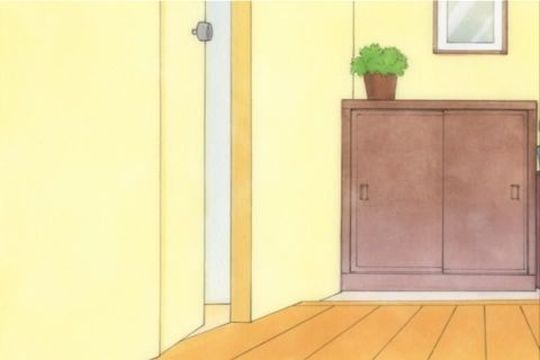
|
開いている |
| It's open! | |

|
うわさは 聞いている |
| I've heard the rumors. | |
てある - Is / has been done (resulting state)
This is used when something is intentionally done and you can see the resulting state of that action.Therefore てある is only used with transitive verbs.
It is similar to using past tense form, but different in that it places emphasis on the action being done intentionally and the end result still being visible.
Take て-form of the verb and add ある.
このドアは 開けてある。 This door has been left open.
テレビ 台の 上に 置いてあるよ。 It has been placed on top of the TV stand. (something is on the TV stand)
明日の 準備をしてある。 I have done my preparation for tomorrow.

|
花が 供えてある |
|---|---|
| Someone left flowers. | |

|
作戦も 考えてある |
| I've thought up a plan, too. | |

|
奇麗に 洗ってあるから |
| I washed it well. | |
Connecting Sentences
Connecting て-form Verbs - Connecting activities
We can use the て-form to connect two activities in one sentence.You can express a string of action that happens one after another : "I did this and then I did that."
The first verb of the sentence is in the て-form, the tense of the second verb (or the last of the sentence) determines when these events take place.
Two verbs cannot be joined by the particle と, which only connects nouns.
今日は、六 時に 起きて 勉強しました。 Today I got up at six and studied.
夏 待つりに 行って 花火を 見ました。 We went to a summer festival and saw fireworks.
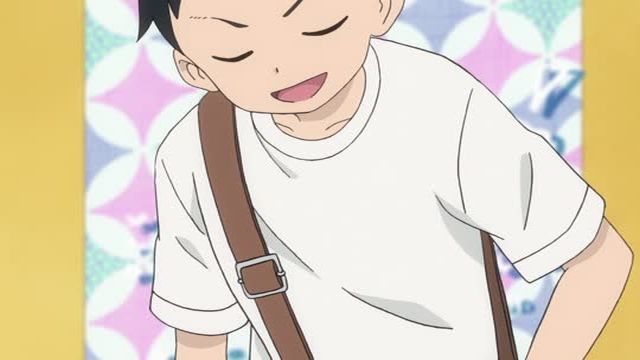
|
早く 帰って 読もう |
|---|---|
| I can't wait to get home and read this. | |

|
開けてみて |
| Open it and see. | |

|
黙って 聞け |
| Be quiet and listen. | |
くて / で - Connecting sentences
The same way you can connect two clauses with verbs, you can use the て-form for adjectives and nouns.It's used like the word "and".
For い-Adjectives, simply use their て-form.
For な-Adjectives and nouns, add で to connect clauses.
あの 店の 食べ物は 安くて、おいしいです。 The food at the restaurant is inexpensive and delicious.
オテルはきれいで、よかったです。 The hotel was clean and we were happy.
山下 先生は 日本人で、ご十 歳ぐらいいです。 Professor Yamashita is a Japanese and he is about fifty years old.

|
堅くて 丈夫 |
|---|---|
| It's hard and sturdy. | |

|
優しくて 頼もしいもの |
| They're kind and reliable. | |

|
濃厚でおいしいです |
| It's so rich and delicious. | |
ないで - Without doing~ ; to do without doing
This means that you don't do one thing while doing something else.Use the negative form of the verb (ない) and add で.
If no action follows ないで, it turns into a request (next lesson).
休まないで 仕事をする Work without taking a break.
何も 言わないで、 出て 行った。 Without saying a word. he left.
昨日 朝ご飯を 食べないで 学校へ 行きました。 I went to school yesterday without eating her breakfast.

|
すげー 見てないで 続けて |
|---|---|
| Amazing... Don't look. Just carry on! | |

|
俺だと 確認しないで 攻撃したのか? |
| In other words, you attacked without being entirely sure it was me? | |

|
ノックもしないで 入り込んで― |
| You come in here without even knocking? | |
Request
てください - Please do
ください is an auxiliary verb which indicates a polite request.To make a request, use the て-form of the verb and add ください.
ください is the imperative form of the verb くださる (the honorific version of くれる).
It's a rather direct way to ask someone to do something, when you are in a position of authority.
You can make a request more polite by using 〜てもらえませんか or 〜ていただけませんか.
Usually it's written in kana, but the kanji form for ください is 下さい.
食べてください。 Please eat.
やめてください。 Please stop.
この 本を 読んでください。 Please read this book.

|
聞いてください |
|---|---|
| Listen to this! | |

|
待ってください。 |
| Please wait a second. | |

|
ギター 教えてください |
| Please teach me how to play guitar. | |
ないでください - Please don't do
To request that someone refrain from doing something, use the negative short form of a verb and でください.ここで写真を撮らないでください。 Please don't take pictures.
行かないでください。 Please. don't go.
それを 食べないでください。 Please don’t eat that.

|
聞かないでください |
|---|---|
| Please don't ask. | |

|
笑わないでくださいね |
| Promise you won't laugh, okay? | |

|
気にしないでください |
| Please don't worry about it. | |
Permissison
てもいい - Give permission
To give permission to someone to do something, you can use the て form of the verb and add もいい.いい is the adjective for good.
It means that doing is okay.
You can add です after いい to be more polite.
In casual speech, you can drop the も.
高くてもいいです。 It is all right if it's expensive.
これを 見てもいい? Is it alright if I look at this?

|
弟子にしてもいいよ! |
|---|---|
| Sure, I'll make you my apprentice! | |

|
じゃあ からかってもいいんだね |
| I can tease you, then. | |

|
宿題 写してもいいよ |
| You can copy my answers. | |
てもいいですか - Ask permission
てもいいですか is a simple and casual way to ask permission to do something.In casual from, you can drop も and just use ていい with a rising intonation to indicate a question.
ここで 煙草を 吸ってもいいですか。 May I smoke here?
ビールでもいいですか。 Will beer do?
食べてもいいだろう。 It is okay if I eat. right?

|
見てもいい? |
|---|---|
| Can I look? | |

|
食べてもいいか |
| Can I eat it? | |

|
座ってもいいか? |
| Mind if I sit here? | |
なくてもいい - No permission needed
なくてもいい is used to tell someone that they don't have to do something, it's not necessary.なくて is the negative て-form.
Can be shortened to なくたっていい when spoken or even なくていい.
なくてもかまわない is a similar Expression.
It uses the word かまわない, meaning "don't care" or "don't mind".
学校に 行かなくてもいい。 I don't need to go to school.
好きじゃないなら、 食べなくてもいいですよ。 If you don't like it, you don't need to eat it.
来なくてもいいですよ。 You don't need to come.

|
別に 飛ばなくてもいいよ |
|---|---|
| You don't really need to fly. | |

|
そんなことは 気にしなくてもいい |
| You don't need to worry about that. | |

|
勝たなくてもいいよ |
| We don't need to win... | |
Interdiction
てはいけない - Interdiction, must not do
This form can be used as a strong way of saying something is prohibited.This phrase is referring to the acceptability of the action and not the possibility of the the action being executed.
This is used when someone is talking about set rules and regulations.
You can think of it as "must not" and "not allowed".
いけない is a more casual form of いけません.
てはならない also expresses prohibition and is a little stronger than はいけない.
In a conversation, ては is sometimes shortened to ちゃ, So, you can say ~ちゃいけません in a daily conversation to tell the listener not to do something.
Also, as a casual variation, there is てはだめだ.
この 部屋に 入ってはいけません。 You must not enter this room.
仕事に 休んではいけない。 You must not take time off from work.
ここから、 始まってはいけない。 You must not start from here.

|
決して 手を 出してはいけないよ |
|---|---|
| Don't touch it. Do you understand? | |

|
目を 合わせてはいけない |
| Number one: Don't make eye contact. | |
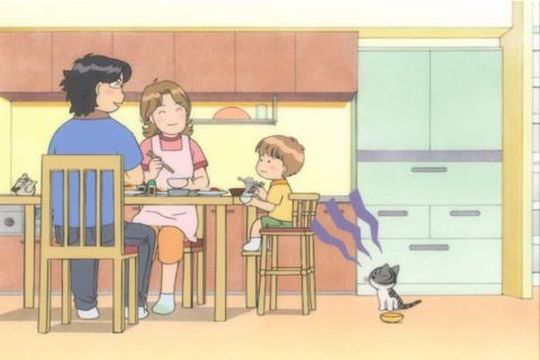
|
お 腹 壊してはいけないからな |
| We don't want to upset her stomach. | |
な - Don't
The stem form of a verb and な is an extremely strong imperative.It tends to be used mostly by males in very informal speech, or by a superior to a subordinate.
行くな。 Don't go!
話をするな! Don't talk !
お酒をのんだら運転するな! Don't drive after you drink!

|
来るな! |
|---|---|
| Stay back! | |

|
死ぬな! |
| Don't die! | |
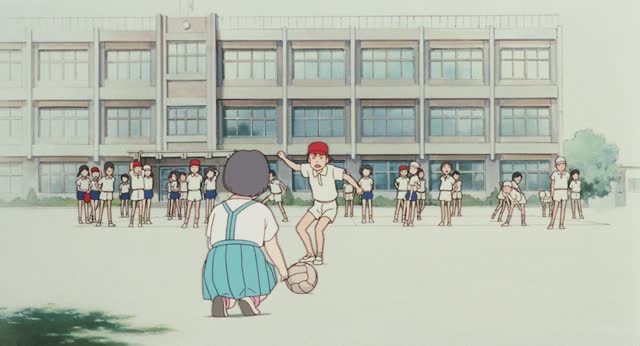
|
さわるな さわるな! |
| Don't touch it, don't touch it! | |
Obligation
なければいけない - You must
When you say you must or need to do something.This shows some kind of duty or responsability.
なければ means if not.
いけない means not good or wrong.
From polite to casual:
ければなりません (polite)
ければいけません (polite)
ければいけない (casual)
ければならない (casual)
きゃだめだ (rude)
きゃ (rude)
仕事に 行かなければいけない。 I have to go to work.
覚えにくいけど、 覚えなければいけません。 It's difficult to remember. but I must.
彼に 会いたくないけど、 会わなければいけません。 I don't want to see him. but I must.
なければならない - Have to, need to, must, should
The phrase, taken as a whole, is used to indicate necessity, or make an assertion that something is expected to exist in a certain state.It is therefore equivalent to the English phrases "have to", "should" or "must".
なければ means if not.
ならない is the negative form of なる.
8 時に 駅まで 彼女を 迎えにいかなければならない。 I have to be at the station to pick her up by 8 o'clock.
髪の毛が長いから、切らなければならない。 My hair is long, so I have to cut it.
母を 手伝わなければならない。 I have to help my mom.
ないといけない - Must do; have an obligation to do
The phrase "といけない" means that it is not acceptable or permitted to do something, and in this structure it is preceded by the negative of a verb.Therefore, it is not acceptable or permitted not to something; hence, the action must be or has to be carried out.
This double negative structure results in a pattern roughly equivalent to the English "have to" or "must do" something.
This can also be conjugated and used as:
- ないといけません (naito ikemasen) more formal.
- ないとダメです (naito dame desu) alternate version.
- ないと (naito) short version.
そろそろ 寝ないといけない。 I have to sleep soon.
私は 家に 帰らないといけない。 I have to go home.
今から 勉強をしないといけない。 I have to study now.

|
2 個 買わないといけないの? |
|---|---|
| So you have to buy two decks? | |

|
実践もしておかないといけないよ |
| but you need to gain experience, too. | |

|
どうして 毎日 働かないといけないの? |
| Why do I have to work every day? | |
なくちゃいけない - Must do; need to; gotta do
You use なければいけない to say it's necessary to do something if not … or otherwise ...なければ means if not.
いけない means not good or wrong.
The casual form often used when speaking is なきゃいけない.
Likewise, なくちゃ means "unless"
日本語を 勉強しなくちゃいけない。 You must study Japanese.
もっと 文法を 勉強しなくちゃいけない。 I must study more grammar.
食べなくちゃダメ。 Must eat !

|
助け合って 生きていかなくちゃいけないの |
|---|---|
| We have to support each other. | |

|
自分のことは 自分でしなくちゃいけないから |
| You have to do everything on your own. | |

|
くそっ 天才の 証明をしなくちゃいけないのに |
| Damn, I have to prove that I'm a genius. | |
なくてはいけない - Must do; need to do
Meaning: must do; need to do.急がなくてはいけない。 I have to hurry.
寝なくてはいけない。 I must go to sleep.
日本語をもっと 勉強しなくてはいけない。 I really need to study Japanese more.

|
誰かが… 誰かがやらなくてはいけないんだ |
|---|---|
| Someone... Someone has to do it! | |

|
もう ここから いなくならなくてはいけない |
| I can't stay here any longer. | |

|
しなくてはいけないことが… |
| There's something I have to do. | |
なくてはならない - Must do; need to do
Meaning: must do; need to do.もう 行かなくてはならない。 I must go now.
毎日 勉強をしなくてはならない。 You must study every day.
君が 決めなくてはならないよ。 You have to decide.

|
会社に 戻らなくてはならないので |
|---|---|
| I must get back to the office. | |

|
倒さなくてはならないんだ |
| He must be defeated! | |

|
自分を 抑え 冷静でなくてはならない |
| A coach need to be in control of himself and calm. | |
Like and dislike
好き - To like
好き (すき) means like.In japanese, "To like" is an adjective (a な Adjective) and not a verb.
You can think of it as "desirable".
It usually works with が that indicates the object of the adjective.
私はステーキが 好きです。 I like steak.
サッちゃん、 好きだよ。 Satchan. I like you.
好き? Do you like (it)?

|
好きです |
|---|---|
| I like you. | |

|
私も 好き |
| I like them, too! | |

|
好きじゃないよ |
| No, I don't. | |
のが好き - To like doing
好き (すき) means like and is a な-Adjective.Add の after the short form of a verb to express the idea of "doing ".
So: Verb + のが + 好き means to like doing .
私は 本を 読むのが 好き。 I like reading books.
私はサッカーをするのが 好き。 I like playing soccer.
私は 文法の 勉強をするのが 好き。 I like studying grammar. (grammar study)

|
どんなのが 好きなんだろう |
|---|---|
| I wonder what type he likes. | |

|
カワイイものが 好き かな |
| Oh, I like cute things. | |

|
そういうのが 好きなんだよ 俺は |
| Now, this is the kind of stuff I like. | |
嫌い (きらい) - To dislike
You use 好き to say you like something or like doing something,嫌い (きらい) works the same way to say "don't like".
Although it ends with い, it's a な-adjective, just like 好き.
マンガが 嫌い。 I don't like manga.
マンガを 読むのが 嫌い。 I don't like cleaning my room.
パイナップルが 嫌い? Do you dislike pineapple?

|
雨は 嫌いだ |
|---|---|
| Ahh, I hate the rain. | |

|
あー 大嫌いだ! |
| I hate you so much! | |
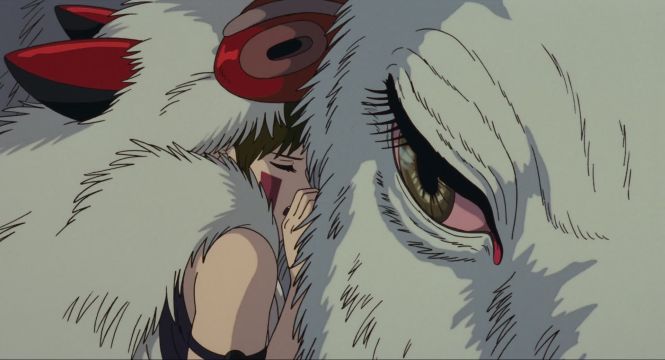
|
人間はキライ |
| I hate humans! | |
To be good / bad at
のが上手 (のがじょうず) - To be good at
上手 (じょうず) is a な-Adjective that means skillful, or good at.Add の after the short form of a verb to express the idea of "doing ".
Connect the two with が to mean someone is good at doing something (or just good at).
In casual form, only 上手 is used and it's much more frequent.
When talking about yourself you can use the な-adjective とくい instead of 上手.
トムは 料理を 作るのが 上手です。 Tom is good at cooking meals.
上田 先生はテニスがお 上手です。 Professor Ueda is good at tennis.
私は 文法を 勉強するのが 得意です。 I’m good at studying grammar.

|
上手だ。 |
|---|---|
| Very nice. | |

|
踊りが 上手なのね |
| He's a good dancer. | |

|
ボートこぐの 上手なのね |
| You're very good at rowing. | |
のが下手 (のがへた) - To be bad at doing
下手 (へた) is a な-Adjective that means unskillful, or bad at.Add の after the short form of a verb to express the idea of "doing ".
Connect the two with が to mean someone is bad at doing something (or just bad at).
In casual form, only 下手 is used and it's much more frequent.
When talking about yourself you can use the な-adjective 苦手 (にがて) instead of 下手.
たけしあさんは 英語を 話すのが 下手です。 Takeshi is not a good speaker of japanese.
私は 日本語を 話すのが 苦手です。 I'm not good at speaking japanese.
彼はお 箸を 使うのがへただ。 He is bad at using chopsticks.

|
表現するのが 下手? |
|---|---|
| You're not good at expressing yourself? | |

|
嘘が 下手ね |
| You're terrible at telling lies. | |

|
もしかして 私の 掃除 下手? |
| Am I doing a crappy job of cleaning? | |
詳しい - Knowledgeable
詳しい (くわし) is an い-adjective meaning detailed, accurate or well-acquainted.You can use it with に to say someone knows a lot about something.
たけしはカメラに 詳しいい。 Takeshi knows a lot about cameras.
彼は 地理に 詳しいの。 He's knows a lot about geography.
彼はコンピューターに 詳しい。 He is very familiar with computer.

|
詳しい 人は? |
|---|---|
| Do you know anyone who might? | |

|
高校生が 詳しいのね |
| You know a lot for a high school kid. | |

|
へえ 詳しいな |
| I didn't expect you to know that. | |
Conjunction
そして - And; and then; thus; and now~
This is used to express supplemental information.それで: "and therefore", to introduce the consequence of what comes before it
そして: "and last but not least", to say something remarkable
それから: "and then", to add an item that comes later in time or in order of the importance
そして 行ってしまった。 And then (he) was gone.
そして 私はあなたに 出会った。 And then I met you.
そして、 私は 朝ごはんを 食べました。 And then, I ate breakfast.
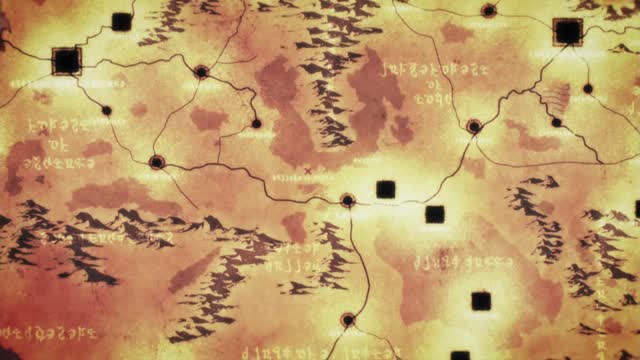
|
そして もう 1つ |
|---|---|
| And there is one more. | |

|
そして 死神が 来た… |
| And now the Shinigami's here. | |

|
そして 俺は 孤立した |
| And then… I found myself all alone. | |
それから - And; and then; after that; since then
This is used to express supplemental information.それで: "and therefore", to introduce the consequence of what comes before it
そして: "and last but not least", to say something remarkable
それから: "and then", to add an item that comes later in time or in order of the importance
それから、 私は 昼ごはんを 食べました。 And then, I ate lunch.
あなたはそれからどうするのですか。 What will you do after that?
それから、 私たちはアイスを 食べました。 And then, we ate ice cream.

|
それから どうしたの |
|---|---|
| So what happened after that? | |

|
それから 彼女はエリカ |
| And this is Erica. | |

|
いや いいけど それから |
| No, not really. Go on. | |
それで - And therefore
This is used to express supplemental information.それで: "and therefore", to introduce the consequence of what comes before it
そして: "and last but not least", to say something remarkable
それから: "and then", to add an item that comes later in time or in order of the importance
昨日は 熱がありました。それで、 学校を 休みました。 I had a fever yesterday. So, I took the day off from school.

|
それで このお 点なの |
|---|---|
| That's why you did so badly? | |

|
それで 話って? |
| So what did you want to talk about? | |

|
なんで それで 元気ないの? |
| Why would you be down because of that? | |
し~し - And what’s more; not only ~ but also ~; so
A conjunction to indicate "and" in an emphatic way.It can also be used to give a list of reason for a situation.
今日はテニスもしたし、 映画も 見た。 I not only played tennis but also saw a movie today.
このアパートは 奇麗だし、 安いです。 This apartment is clean, and what's more, it's inexpensive.
彼は 掃除ができるし、 料理も 作れるし、 結婚してよかった。 He can clean and cook. I am glad that I married him.

|
私かわいくないし 暗いし |
|---|---|
| I'm not cute and I'm gloomy. | |

|
別に 誰も 見てないし |
| Not really. No one's looking. | |

|
味もないし |
| And it had no taste. | |
しかも - Moreover; furthermore; besides; on top of that; what's more;
Conjunction that is used to add information to what has been just been said/stated.彼は 面白くて、しかもハンサムだ。 He's interesting, and what's more, he's handsome.
彼女はインテリで、しかも 美人ですね。 She is not only intelligent but also beautiful.
その 店の 料理は 美味しいし、しかも、 安い。 The food at the restaurant is delicious; moreover, it is cheap.
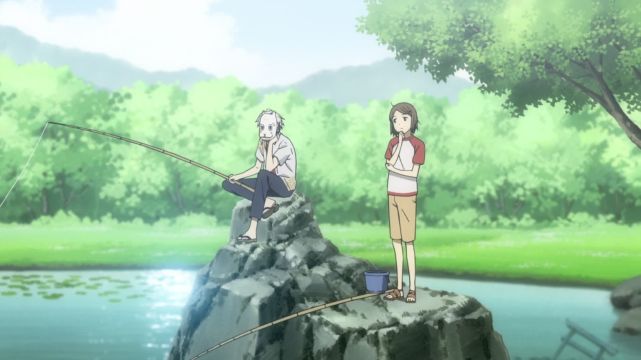
|
しかも 夜だし… |
|---|---|
| On top of that, it's at night. | |

|
しかも 隣は 女子 |
| Worse, I'm sitting next to a girl. | |

|
とても 古い 魔法だよ しかも 強力だ。 |
| Ancient sorcery. And powerful, too. | |
そこで - Therefore
Conjunction used to indicate a cause-and-effect relationship between what precedes it (cause) and what follows it (effect).It may also be used to change the topic of conversation.
It's used at the beginning of a sentence.
さて そこで 問題 So, here's a question for you:
そこでた 作戦が あるんだけど In that case, I have an idea!
そこで 思ったんだけど So I was thinking...

|
そこで 気付けよ 俺 |
|---|---|
| I should've realized then! | |

|
さて そこで 問題 |
| So, here's a question for you: | |

|
そこでやつに 言ったんだ |
| That's when I said to him... | |
Disjunctive conjunctions
けど - But; however; although~
This grammar is used just like but in english, between 2 contradicting ideas.It can be translated by but, however, although.
From polite to casual:
けれども
けれど
けども
けど
仕事は 辛いけど 楽しい。 Work is tough, but fun.
金はないけど 夢はある。 I don't have money, but I have dreams.
スポーツは 上手じゃないけど、 好きです。 I'm not good at sports, but I like them.

|
私は 好きだけど |
|---|---|
| But I like it. | |

|
魚はいるけど |
| But I do need fish, though. | |

|
まぁ 止めないけど… |
| Well, I won't stop you... | |
でも - But; however; though~
でも simply means but or however.It is often used to start a new sentence, or to connect two contradicting ideas.
It is very similar to しかし, which is a bit stronger.
私は 魚が 好すきです。でも 肉も 好きです。 I like fish. But I also like meat too.
動物が 好きです。でも、 犬が一ばん 好きです。 I like animals. But I love dogs the most.
日本人ともっと 話したいです。でも、 私の 日本語はあまり 上手ではありません。 I want to speak to Japanese people more. But my Japanese is not so good.

|
でも、ほら |
|---|---|
| But look at this. | |

|
でも 皆 私のせいで 死にました |
| But everyone died because of me. | |

|
何でもねえ |
| It's nothing. | |
が - But, however
が, like "but" or "however" in English, combines two sentences which express contrastive ideas.Can be used simply as a transition word to connect two sentences.
だが, だけど, でも, しかし and けれども express the same idea as が.
However, the first four cannot make compound sentences like が does; they must occur at the beginning of a sentence.
それはいいですが… That’s okay. but ...
難しいですが、 頑張ります。 It is difficult. but I will do my best.
大変だったが、しました。 It was terrible/hard however. I did it.

|
すまないが 水を |
|---|---|
| Sorry, but could you bring some water? | |

|
分かってる… が! |
| I know that, but... | |

|
が 倒れない |
| But... but he's still standing! | |
しかし - But; however~
This is often used to start a new sentence, but can be used mid sentence between 2 opposing ideas as well.It is very similar to でも.
日本は 大好きです。しかし、 日本の 夏がとても 暑いです。 I love Japan. However, the summer is very hot!
今日のクラスはむずかしかったです。しかし 楽しかったです。 Today's class was difficult.. But, it was a lot of fun!
冬は 寒い、しかし 私は 好きだ。 Winter is cold, but I like it.

|
しかし 君も 死ぬぞ! |
|---|---|
| But you'll die, too. | |

|
えっ しかし 殿下! |
| H-However, Your Majesty! | |

|
しかし まあ 夜のことだし |
| Still, this happened at night. | |
Unsorted
自分 - Self, own
自分 (じぶん) is the universal Japanese reflexive pronoun,In English, one must specify "myself", "himself", "yourselves", etc..
However, in Japanese 自分 by itself can fulfill all of these roles.
自分 may also be used as a first-person pronoun (Usually by male speakers).
自分でやりなさい! Do it by yourself!
彼は 自分のことをよく 知らない。 He doesn't know much about himself.
彼は 自分が 雇った 人とうまくやってない。 He isn't getting along well with the people that he himself hired.

|
自分で できるから |
|---|---|
| I'm able to do it myself. | |

|
自分でかけろ |
| Call them yourself. | |

|
自分でやります |
| Oh, I do those by myself. | |
すぎる - Too much
すぎる is a helping verb that means "too much".You can use it when something is beyond normal or proper.
As a main verb, it means to pass through, to go beyond.
すぎる follows the adjective base, replacing the い or な.
It conjugates as a regular る-Verb.
早く 起きすぎました。 I got up too early.
この 本は 高すぎます。 This book is too expensive.
この 町は 静かすぎます。 This town is too quiet.
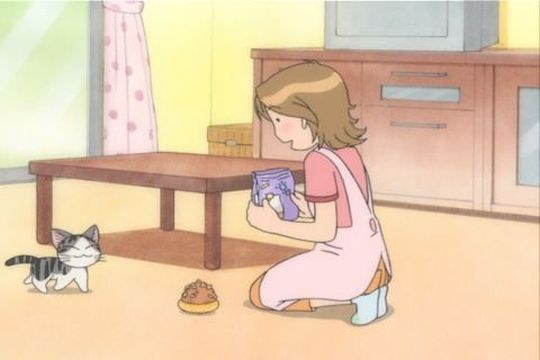
|
入れすぎちゃった |
|---|---|
| I overfilled it. | |

|
リアルすぎ |
| This is too real. | |

|
食べすぎかな |
| Is this too much? | |
と思う - I think
You can use the Expression と思う to talk about your own thoughts.It combines the quotation particle と and the verb to think 思う (おもう).
It's placed after a plain form phrase.
To say that you don't think, it's more common to use ないと思います instead of と思いません。
明日は、 映画を 見に 行くと 思う。 I think I will go see a movie tomorrow.
たけしさんはメアリーさんが 好きだと 思います。 I think Takeshi likes Mary.
メアリーさんはたけしさんが 好きじゃないと 思います。 I think Takeshi likes Mary.

|
いいと 思うよ |
|---|---|
| I think it's a good thing. | |

|
変だと 思ったよ |
| I knew something wasn't right. | |

|
彼女に 告白しようと 思うんです! |
| And I want to confess to her! | |
Conjugation - Volitional
Volitionnal form - Let's, shall (casual)
The volitionnal form expresses the will of the speaker.It's also used to suggest something or push someone to do something with you.
よう is the casual form.
The polite form uses the conjugation of ます, ましょう.
You will mostly see the polite form.
日本語を 勉強しなくてはいけない。 頑張ろう! We have to study Japanese. Let's do our best!
今日は 早く 帰ろう。 Let's go home early today.
ここで 働きたいから、いい 履歴書を 書こう。 I want to work here. so I'll write a good resume. (volitional)
Suggestion
ましょう - Let's, shall (polite)
ましょう is used to suggest something, as an invitation.It can be translated by "let's".
It's used to suggest a plan of action.
It's the volitional form of ます, or the polite volitional form.
映画に 行きましょう。 Let's go to a movie.
バスで 行きましょう。 Let’s go by bus.
寿司を 食べに 行きましょうか。 Shall we go eat some sushi?

|
行きましょう |
|---|---|
| Let's go! | |

|
入りましょう |
| Let's go in! | |

|
そうしましょう |
| Let's do that! | |
ましょうか - Shall I ~; used to offer help to the listener
ましょうか is used as an indirect, roundabout way of expressing one's intentions, or making an invitation.荷物をもちましょうか。 Shall I carry your bag?
飲みに 行きましょうか。 Shall we go for a drink?
じゃあ 私搜してきましょうか。 Would you like me to look for her?

|
どうしましょうか |
|---|---|
| What should we do? | |

|
何 買いましょうか |
| What should we get? | |

|
お 茶にしましょうか |
| Shall I make some tea? | |
ませんか - Why don't you
ませんか is used to ask someone if they would like to do something.It implies that it's ok if someone does not want to do the action.
It's a suggestion rather than an invitation.
The negative form makes the suggestion a bit softer.
Without the negative form, the sentence is simply a question instead of being an invitation.
The short form of a verb (ない) without か can be used intead of ません to be more casual.
一緒に 映画を 見ない。 Won't you see a movie with me ?
金曜日に、 買い物に 行きませんか。 Won't you go shopping on Friday (with me)?
カラオケで、 歌いませんか。 Won’t you sing at karaoke (with me)?

|
一緒に 見ませんか? |
|---|---|
| Want to look over it together? | |

|
気が 進みませんか? |
| Are you not interested? | |

|
今度 一緒にご 飯 食べませんか |
| Would you like to go for lunch sometime? | |
Want
たい - I want to
たい is an auxiliary adjective.It's used to say "I want to + Verb".
It only applies for thing YOU want to do, You cannot use it to speak about other people's intentions.
たい turns the verb into an い-Adjective, so you can conjugate it like any other い-Adjective.
You can use that to say you don't want something.
The particle が can replace を when a verb is in the たい form.
You can add です after たい to make it more polite.
私は 日本へ 行きたいです。 I want to go to Japan.
公園に 遊びに 行きたくない。 I don't want to go play in the park.
質問を 答えたかった。 I wanted to answer the question.

|
帰りたいよ |
|---|---|
| I want to go home. | |
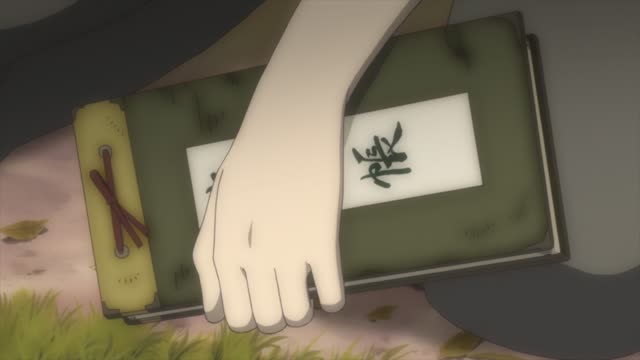
|
俺はやりたい |
| I want to do it. | |
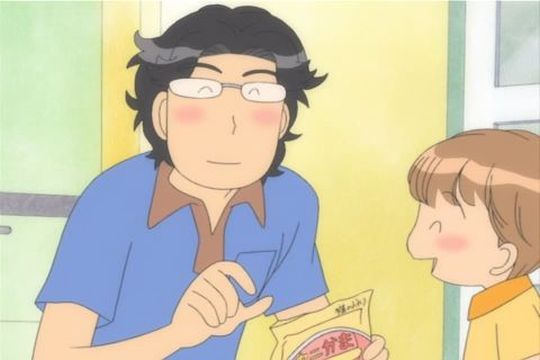
|
僕もあげたい |
| I want to give her one too! | |
欲しい (ほしい) - I want
ほしい is an い-Adjective that means "want" or "desirable".The object of desire is usually followed by the particle が and then ほしい.
You can conjugate ほしい like any い-Adjective.
Like たい, it only applies for things relating to you.
You cannot use it to speak about other people's intentions.
私は 車が ほしいです。 I want a car.
お 金がたくさんほしい。 I want a lot of money.
誕生日にお 金がほしい。 I want money for my birthday.

|
欲しい… |
|---|---|
| I want it. | |

|
私は 手袋が 欲しいのよ |
| I've been wanting gloves myself. | |

|
欲しいなら あげるわよ |
| I'll send it to you if you want. | |
て欲しい (てほしい) - To want someone to do something
When the subject wants someone to do something.You can use the て-form of a verb and the adjective ほしい.
The person the wish is directed to is marked with に.
Only appropriate for use with people on the same social level or lower than the subject.
ピーターに 歌たってほしいです。 I want Peter to sing.
パンを 買って 来てほしい I want you to buy some bread.
一緒に勉強してほしいです。 I want you to study together with me.

|
遊んで 欲しいの |
|---|---|
| You want me to play with you? | |

|
もう 一度 考えてほしい |
| Please reconsider! | |

|
聞いてほしいんですか? |
| You want us to listen? | |
たいと思っている - I have wanted to
When you have wanted to do something for some time, you can use たいと思っている.たい is added to the verb stem to say "I want to + Verb".
思う (おもう) means to think.
ている conjugation is used when a past event is connected to the present.
禁煙したいと 思っている。 I want to quit smoking.
仕事を 辞めたいと 思っている。 I want to quit my job.
早く 自立したいと 思っている。 I want to be independent as soon as I can.

|
知りたいと 思った |
|---|---|
| I thought I wanted to know. | |

|
一休みしたいと 思ってたとこ |
| I felt like having a break. | |

|
僕もアルバイトしたいと 思って |
| I was also thinking of working part-time. | |
がる - To feel, to think, show sign of
がる is an auxiliary verb.It's used when a person other than the speaker "shows signs of ~."
お 前は 怖がらないね You don't seem afraid.
怖がらないで… Don't be afraid.
私の 弟は 強がる。 My younger brother acts tough

|
怖がることはないんだよ |
|---|---|
| You have nothing to be afraid of now. | |

|
女の子が 会いたがっています |
| There's a girl who wants to see you. | |

|
チー あんなに 外に 出たがっているのに |
| Chi wants to go out so much. | |
がり - Someone tends to; has a tendency to; has a sensitivity to~
がる is used to say that someone is appearing to be a certain way.がり changes the meaning to describe a personality, tendency, or sensitivity towards something.
While がる is usually used when talking about others, がり can be used to talk about both others and oneself.
When talking about someone’s personality, Japanese people will usually add 屋 (や) at the end.
Another option, which is more friendly, is to add 屋さん (やさん) at the end instead.
怖がり tends to scare easily
恥ずかしがりやの 子供 shy child
寒がり Someone who is sensitive to the cold.

|
強がり? |
|---|---|
| Are you just trying to act tough? | |

|
その 強がりが 死を 呼ぶぞ |
| That bravado will get you killed. | |

|
アハハハ 怖がり 過ぎだよ |
| You're way too scared. | |
欲しがって - Someone wants
ほしい is used to express a personnal feeling.You cannot use it for another person, because you can't know how they feel.
Therefore, the third person's desire is usually expressed by 欲しがっている.
It comes from the verb 欲しがる (ほしがる)
Literally: be showing the sign of wanting (something).
弟は 僕の 自転車を 欲しがっています。 My little brother wants my bike.
トムさんは、 友達を 欲しがっています。 Tom wants a friend.
鳥が 餌を 欲しがっている。 The bird wants food.

|
手下を 欲しがっていたな。 |
|---|---|
| You wanted help. | |

|
だから 徽章を 欲しがってる |
| That's why I want the insignia! | |

|
てめえが 欲しがってたんじゃねえか |
| Isn't that what you want? | |
たがる - Someone wants to
To describe your observation to the effect that somebody wants to do something, you must use たがっている instead of たい.Like たい, it's an auxiliary verb.
鈴木さんはアメリカへ 行きたがっている。 Mr. Suzuki is showing signs of wanting to go to America./ Mr. Suzuki wants to go to America.
リサがあのサンドイッチを 見て、 食べたがった。 Risa saw the sandwich and wanted to eat it.
娘はいつもスポーツをしたがる。 My daughter always wants to play sports.

|
貧乏な 国が 飛行機を 持ちたがる |
|---|---|
| Poor countries want airplanes. | |

|
蒸しパン みんな 食べたがってるよ |
| Everyone wants to eat your steamed buns. | |

|
父上が 行きたがっていた。 |
| My father had wanted to go there. | |
たいと言っていました - Someone wants to
You can use たいと言っていました to describe someby else desire to .たい only applies to your own desires.
Somebody else wishes are usually reported either as quotations, observations or guesses.
と言っていました is used to quote what someone else (he, she, they) says or think.
It combines the quotation particle と and the verb to say 言う (いう).
メアリーさんはチベットに 行きたいと 言っていました。 Mary said she wanted to go to Tibet.
Reason
から - Because, since
から is a particle that connects two subjects to show a reason or cause.The first object is the reason or explanation and the second is the result or situation.
You can inverse the two but から is awalys attached to the reason / explanation.
The second object can be omitted.
Noun and adjective require a copula (だ / です) so it doesn't get mixed up with から meaning "from".
から becomes だから or ですから.
The の before だから indicates that the speaker is emphasizing what he's saying, usually a personal judgement.
It can be shortened to ん.
来年 日本へ 行くから 日本語を 勉強しています。 I'm studying Japanese because I'm going to Japan net year.
歌うのが 好きだから、カラオケに 行きます。 Because I like singing. I go to (do) karaoke.
私は 犬が 好きですから。 Because I like dogs.

|
笹子さんじゃないから |
|---|---|
| Because you're not Miss Sasako. | |

|
好きだから |
| Because I love her. | |

|
いや 天才ですから |
| That's because I'm a genius. | |
のだ (のです) / んだ (んです) - The explanation is that ~; The reason is that ~; The fact is that ~; It is that ~
んだ or んです is used at the end of a sentence to ask or give a reason or an explanation.It's the shortened form of のです or のだ.
Instead of just making a statement, you indicates a reason for something.
のだ is used in writing and is more formal than んだ, used in speaking.
You can replace だ by です.
It can go after a short form, negative or postive, past or present.
When it follows a noun or a な-Adjective, な comes in between.
何をしているんですか。 What are you doing?
日本語を 勉強しているのです。 I'm studying Japanese.
いいのですか。 Is it okay? (asking for reassurance)

|
何 急いでんだ |
|---|---|
| Why's he in such a hurry? | |

|
何やってんだ |
| What are you doing? | |

|
本当なんです |
| …but it’s the truth! | |
で - Reason for action
で indicates a weak causal relationship between two conditions or events.It directly follows noun phrases and な-adjectives, but cannot be used after い-adjectives, which have their own て-form.
山口さんは 病気で 学校を 休みました。 Because Mr. Yamaguchi was ill, he didn't come to school.
私は 風邪で 仕事を 休みます。 (I will) be absent from work because (I caught) a cold.
電車が 雪で 止まります。 The trains will stop due to the snow.

|
え〜? 雨の 音で 聞こえない |
|---|---|
| I can't hear you because of the rain. | |

|
オレのせいで |
| Because of me... | |

|
しかしうまいで |
| But, he is surely very talented. | |
ので - So; since; because
ので is a conjunctive particle that expresses causes, reasons and motivations, similar to から.から can mark subjective or objective causes/reasons while ので marks objective ones, emphasis on the cause.
ので is more formal than から.
ので can also be shortened to んで in casual form.
お 酒を 沢山 飲んだので 眠くなった。 Because I drank a lot of sake. I got sleepy.
その 本は 高かったので 買わなかった。 Because that book was expensive. I didn't buy one.
土曜日なので、 旅行に 行きたい。 Because it is Saturday. I want to go on a trip.

|
忙しいので…。 |
|---|---|
| I'm a little busy. | |

|
暗いのでこれを |
| Take this. It's dark. | |

|
子供だったので |
| I was only a child. | |
Modifying nouns
Modifying Nouns - Qualifiers - Adjective + noun, verbs + noun
Adjectives can be used to describe a noun.い-Adjectives can be placed directly before the noun.
With な-Adjectives, you need な between the adjective and the noun.
When a noun is described by an adjective that way, the entire phrase can be modified in the same way we modify sole nouns.
You can also use verbs instead of adjectives to qualify nouns.
面白い 人。 An interesting person.

|
髪の 長い 人 |
|---|---|
| The guy with long hair... | |

|
私はいい 人だと 思うわ |
| I think he's a good person. | |

|
こんな 大きな 猫が |
| A cat this big. | |
Modifying Nouns - Relative clause - Sentence + noun
Adjectives and verbs can be used as qualifiers to a noun.You can use that sentence as just "one noun" in a middle of a bigger sentence.
A qualifying phrase like this, which has a sentence-like structure of its own, is technically known as a "relative-clause".
食べている 人。 The person who is eating.
あそこで 本を 読んでいる 学生はみちこさんです。 The student who is reading a book over there is Michiko.
たばこを 吸わない 人が 好きです。 I like people who do not smoke.

|
使役している 妖怪だ |
|---|---|
| They're Youkai that serve me. | |

|
前に 飼ってた 犬の 名前 |
| It was the name of a dog I used to have. | |
Modifying Nouns - がある
The most basic way to modify a noun : is Adjective + Noun.But you can modify the noun with another noun.
It can be translated like this : "B that has A" or "B with A".
は cannot be used.
が can be replaced with の(this marks a relative clause).
家がある 人。 People that have a house.
花がある 木。 A tree that has flowers.
お 金がある 人。 A person that has money.

|
殺せない 人間もいる… |
|---|---|
| So, there are some people whom you can't kill. | |
どう
どう - How; in what way
どう is an interrogative adverb used to ask about the state of someone or something, to suggest something, or to ask about the way in which something is done.It can be translated by "How".
You can use はどうですか to ask another's opinion of something, or to ask about the state of someone or something.
The polite version of どう is いかが.
試験はどうでした。 How was the exam?
あなたのお母さんの調子はどうですか? How is (your mother's health)?
水のおかわりはどうですか? How would you like some more water?

|
どうですか |
|---|---|
| How is it? | |

|
どうでした お 仕事のほうは |
| Wh-What was it like?! How was the work?! | |

|
どうする? |
| What should we do? | |
どんな - What kind of; what sort of
Meaning: what kind of; what sort of.This sentence pattern is used to ask about the state or character of a person, thing, etc.
どんな 仕事をするのですか。 What kind of work do you do?
どんな 食べ物が 好きですか。 What kind of food do you like?
今日はどんな 天気ですか。 How is the weather today?

|
どんな 時? |
|---|---|
| Like when? | |

|
どんな 具合? |
| How's it coming? | |

|
どんな 用事? |
| What did you need? | |
どうして - Why; for what reason; how
どうして has two main meanings:- To ask why or for what reason
- To ask how / method
The formal form is なぜ.
It can be used mid-sentence or to start new sentence.
どうして日本に行きましたか。 Why did you go to Japan?
どうして日本語を勉強していますか。 Why are you studying Japanese?
この 字はどうして 書くんですか? How do you write this character?

|
どうして |
|---|---|
| Why?! | |

|
どうしてだろう? |
| Why's that? | |

|
エレン どうして 泣いてるの |
| Eren, why are you crying? | |
どうやって - How; in what way; by what means
じゃ、どうやって やるの? Well, then, how do you do it?このスープどうやって 作ったの? How did you make this soup?
この まどを どうやって あけるの? How do you open this window?

|
どうやって 止めるか |
|---|---|
| What can we do to stop him? | |

|
どうやって 投げてんだ |
| How'd he throw that? | |

|
どうやって 行くつもり? |
| How do you plan to get there? | |
Comparison
より...のほう - More than, less than
より...のほう is used to compare two things to show that one is better than the other.より means "rather than" and modifies the noun before it.
You can think of it as a particle attached to the element with the least value.
You can omit either one if the context is understood.
You can replace のほうが by simply は.
In japanese, adjectives have the same shape in noncomparative and comparative sentences.
There is no alteration like "great/greater".
The idea of comparison is expressed by adding something to the nouns that are compared.
It's often used to describe the speaker's opinion about something, Usually with が好き or いい.
They can be used with nouns or verbs.
電車は 車より 速いです。 Trains are faster than cars.
車で 行くほうがバスで 行くより 安いです。 Going by car is cheaper than going by bus.
月曜日より、 日曜日の 方が 好き I like Sunday more than Monday.

|
前よりもかわいい |
|---|---|
| It looks better than before! | |

|
思ったより 広いね |
| It's a lot bigger than I thought. | |

|
私の 写真のほうがいいもん! |
| My picture is better! | |
ほど … ない - Not as … as
Used when comparing two topics that have something in common.Something / Someone is not as … as something / someone else.
You can use either より or ほど or both.
私はケンほど 強くありません。 I'm not as strong as Ken.
僕は 君ほど 速く 歩けません。 I can't walk as fast as you can.
電車は 飛行機ほど 速くない。 Trains are not as fast as planes.

|
かわいいですか? 私ほどじゃない。 |
|---|---|
| Is she cute? Not as cute as me. | |

|
梓さんほどうまく 作れないですけど |
| I'm not as good as you, though. | |

|
僕より 家に 詳しくなってない |
| I think you know my house better than I do. | |
と...と、 どちら - Between … which one
When you want to compare two things.Attach the particle と after each noun and add どちら.
You are asking : "between noun 1 and 2, which …".
You can also add が好き or がいい.
It means which one do you like, or which one is good.
どちら can be replaced by the more casual どっち.
マンガと、 新聞を 読むこと、どちらが 好きですか。 Between reading manga and reading the newspaper, which do you like? (polite)
布団とベッドと、どちらが 好き? Which do you like better, futons or beds?
苦いコーヒーと 甘いコーヒーとどちらが 好みですか。 Between bitter coffee and sweet coffee. which one do you prefer?

|
警察と 私の 店と どちらがお 好みかな? |
|---|---|
| Would you rather deal with the galactic police, or me, Miss Queen of Hearts? | |

|
シシ 神の 首とタタラ 場と どちらが 大切なのだ |
| What's more important, the head of the Deer God or the ironworks?! | |
の中で~が一番~ - The most … out of …
When you compare three or more things, you express which one is the best with 一番 (いちばん)一番 is an adverb meaning "the best", or "the most". Litteraly "number one".
の中で~が一番~ indicates the best out of a list.
のほう and どっち are not used in statements of comparison among three or more items.
Normal questions like だれ, どれ, なに, いつ and どこ are used instead.
クラス(の 中)で 大川さんが 一番 頭がいい。 Mr. Okawa is the brightest in the class.
日本で 一番 奇麗な 所はどこですか。 Where is the most scenic place in Japan?
この 中で 一番 好きな 食べ物は 何? Among these foods. what is your number one favorite food?

|
あたしたちの 中で 誰が 一番 強いのかね? |
|---|---|
| Which one of us is the strongest? | |

|
課題 図書の 中で 一番 薄い 本って 「 仔(こ) 豚 物語」だったよね? |
| Of all the books to review, the thinnest one was Piglet Story, right? | |

|
家の 中で 一番 偉い人のことだ |
| The most important person in the house. | |
Time
時 (とき) - When, at the time
The kanji 時 has different readings. It's used as じ to tell the hours of the day.Like 六時 (ろくじ), 6 o'clock.
Here, it's とき.
とき marks a time when an action takes place.
It can be translated as when.
Subject 1 + とき + Subject 2,
When subject 1 happen(ed), subject 2.
If the ending of the sentence is in past tense, both events happened in the past.
When something hasn't happened yet, or when it happens often, you can use a regular plain form verb before とき.
私は 日本にいた 時(に)お 茶を 習いました。 I learned the tea ceremony when I was in Japan.
散歩するときは 音楽を 聴く。 I listen to music when I take a walk.
僕は 静かな 時しか 本を 読まない。 I read only when it's quiet.

|
あの 時… |
|---|---|
| That night... | |

|
小学校の 時さ |
| Back in grade school, | |

|
あっ あの 時の… |
| Oh, now I remember. | |
時間 - Duration
The duration of an activity is expressed with a bare noun like 一 時間.It doesn't need to be followed by a particle.
一時間 待ちました。 I waited for an hour.
私は 昨日 日本語を三 時間ぐらい 勉強しました。 I studied Japanese fo about 3 hours yesterday.
昨日七 時間 半 寝ました。 I slept for seven and a half hour last night.

|
時間は |
|---|---|
| How much time left? | |
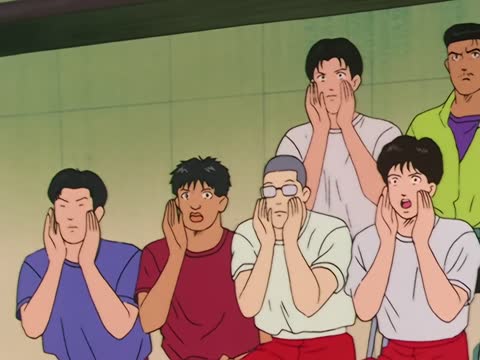
|
時間がない |
| There is no time left! | |

|
時間って 止まるのね |
| I guess time really can stop, huh? | |
間に (あいだに) - During, while, between
Noun meaning both "the entire space between," and "the entire time period".Can also be used to refer to a relationship between two people.
私が 寝ている 間に 妻が 帰ってきた。 My wife came home while I was sleeping.
トムとの 間に 何かあったの? What are you doing up this early?
私が暇な間に、電話をかけてください。 Please call me while I am free.
頃 (ごろ) - About
十一 時ごろに 寝ます。 I will go to bed at about eleven.一時ごろ 帰りますよ。 I'll be back at one o'clock.
8 時ごろに 帰りました。 I went home around 8 o'clock.

|
小さい 頃からよ |
|---|---|
| Ever since I was a kid. | |

|
小学生の 頃 |
| Back when I was in grade school. | |

|
いつ 頃からお 参りに |
| When did you start worshipping him? | |
前に - Before, ago
前 (まえ) means before.It can be use for both location and time.
We use 前 when an action took place before another one.
The verb before 前 must be in non-past plain form.
ご 飯の 前に 手を 洗いましょう。 Let's wash our hands before dinner.
前にここに 来ました。 I’ve been here before.
三 年 前に、 日本へ 来ました。 I came to japan three years ago.

|
でもその 前に! |
|---|---|
| But before all that... | |

|
前にも 言ったはずだ |
| I told you earlier | |

|
前に 飼ってた 犬の 名前 |
| It was the name of a dog I used to have. | |
から - From (time, location)
から is particle which indicates a starting point or a source.The source can be a location, a time, a person …
パーティーは八 時から 始まります。 The party starts from eight o'clock.
駅からバスで 来た。 I came from the station by bus.
太陽は 東から 昇ります。 The sun rises in the east.

|
先から 何をしている |
|---|---|
| What have you been doing this entire time? | |

|
誰からだ |
| Who's it from? | |

|
東京から 来たの |
| I'm from Tokyo. | |
あとで - After doing~
後 (あと) is a noun that means after.With the particle で it becomes an adverb.
後で話がある。 We will talk later.
私はアルバイトの後で、疲れている。 I am tired after my part time job.
じゃ また 後でね Okay, see you in a bit.

|
あとでつきあえよ |
|---|---|
| Come with me after class. | |

|
あとで 教えるから |
| I promise I'll tell you. | |

|
あとで 見せてあげる |
| I'll show you later. | |
てから - After doing~
You can use から to say after doing .The verb has to be in the て-Form.
The difference with 後(あと) is that てから conveys a stronger and immediate relation between the two events.
雪子は 晩ご飯を 食べてから 映画に 行きました。 After eating her supper, Yukiko went to a movie.
日本語の 勉強をしてから、 日本に 行きます。 After studying Japanese, I will go to Japan.
私は 友達に 電話してからうちを 出た。 I left home after making a call to my friend.

|
大人になってから |
|---|---|
| When I became an adult. | |

|
ご 飯 食べてからにするよ |
| Okay, after I eat. | |

|
ここに 来てから 思っている |
| I've been thinking since we arrived here. | |
ながら - While
ながら describes one person (only one) doing two actions simultaneously.One of the action can be shorter or longer in time than the other.
It's only used when one person is doing actions, not when 2 persons are doing 2 actions at the same time.
The verb before ながら is in the stem form, the one after can be in any form.
田口さんはいつも 新聞を 読みながら 朝ご飯を 食べます。 Mr. Taguchi always reads a newspaper while eating his breakfast.
日本語の 勉強をしながら、 音楽を 聞くのが 好き。 I like to listen to music while I do my Japanese studies.
泣きながら 家族を 見送った。 I saw my family off in tears.

|
笑いながら |
|---|---|
| Laughing all the while. | |

|
話しながら 行こう |
| We can go while we chat. | |

|
全員 歩きながら 聞け |
| Everyone, listen to me while we walk. | |
まで - Until; as far as; to (an extent); even~
まで is the equivalent of the English Expression "until."It can be a time, location …
Often used with から to mean "from … to …"
昨日は三 時から五 時まで 友達とテニスをしました。 Yesterday I played tennis from three to five with my friend.
私が 行くまでうちで 待っていて 下さい。 Please wait at home until I get there.
映画が 始まるまで、 友達と 話した。 I talked with my friend until the movie started.
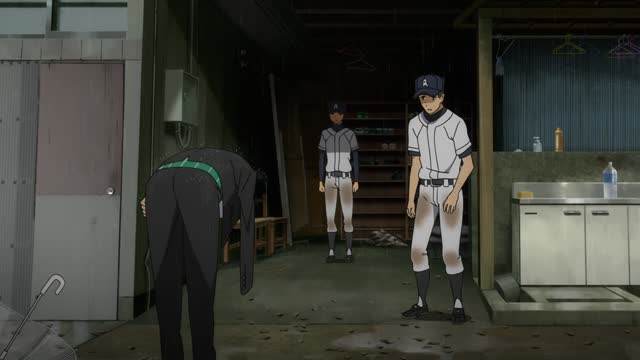
|
今まで 悪かった |
|---|---|
| I'm sorry about everything till now! | |

|
ここまでや |
| It's over. | |
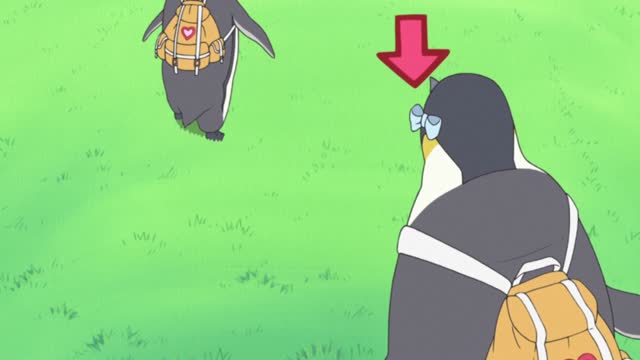
|
ここまではだよ |
| To this point. | |
までに - By the time
までに is a compound word composed of the particle まで and the particle に used to describe a dealine.The use of the に particle indicates that something will occur within the limit set by まで,
までに is therefore similar to the English words "by." "before" and "within", with the appropriate translation depending on the context.
私は十 時までに 帰ります。 I'll come home by 10 o'clock.
明日までに 電話をください。 Please call by tomorrow.
八時半までには学校に行きたい。 I want to get to school by 8:30.

|
12 歳までにね |
|---|---|
| By the time we turn 12. | |

|
冬までに 間に合った |
| We made it before winter. | |

|
今日までに 決めるって |
| I told you to pick one by today. | |
まだ - Still; (not) yet
まだ is an adverb used to indicate a lack of change, It is translated with one of two possible meanings:1) When used in combination with verbs in positive form, まだ is usually translated as "still".
2) When used in combination with verbs in negative form, まだ is usually translated as "(not) yet".
The concept which まだ expresses is opposite to that of もう.
木村 君はまだ 昼ご飯を 食べている Mr. Kimura is still eating his lunch.
お 酒はまだありますか。 Do you still have sake?
宿題はまだ終わっていません。 I'm not done with my homework yet.

|
まだです |
|---|---|
| Not yet, sir! | |

|
まだ 中にいる |
| He's still inside. | |

|
まだ 追ってくる! |
| They're still chasing us! | |
まだ ていない - Have not yet~
Expression used to say something has not happened yet.It combines まだ (yet) and a verb in the negative ている form.
It means either :
- an action in progress
- a past event that is connected to the present.
In casual spoken Japanese the い is often dropped (食べている → 食べてる).
まだ 食べていません。 I haven’t eaten yet.
その 本をまだ 読んでいません。 I haven’t read that book yet.
彼は、まだ 答えていません。 He still hasn’t answered.

|
まだ 来てないな |
|---|---|
| It still hasn't come. | |

|
まだ 終わってないだろ |
| We're not done yet. | |

|
まだ 見てないの |
| You haven't read it? | |
Purpose
ために - In order to
ために is used to show a purpose for an action.Objective + ために + Action.
The objective can also be a person.
Both ために and ように represent purpose and are distinguished by the word that precedes it.
ために follows plain form verbs or nouns with の.
ように follows plain form verbs, negative verbs or potential verbs. It does not follow a nouns.
ために is used when the speaker has control.
ように is used when the outcome desired is beyond the control of the speaker.
私は 日本のことを 知るために 日本へ 行く。 I'll go to Japan (in order) to learn about Japan.
君のために 何でもするよ。なぜなら、 愛しているから。 I would do anything for you because I love you.
家を 買うためにローンを 組んだ。 I took a loan in order to buy a house.

|
晴子さんのために |
|---|---|
| For Haruko-san! | |

|
そう 復讐のために |
| Yes, for revenge! | |

|
戦うんだ 人間のために |
| I'm going to fight for humanity! | |
ために - Because of
ために can also be used for an uncommon result.Both ために and ように represent purpose and are distinguished by the word that precedes it.
ために follows plain form verbs or nouns with の.
ように follows plain form verbs, negative verbs or potential verbs. It does not follow a nouns.
ために is used when the speaker has control.
ように is used when the outcome desired is beyond the control of the speaker.
私は 父が 死んだために 大学に 行けなかった。 I couldn't go to college because my father died.
雪のために 学校が 休みになった。 The school was closed because of the snow.
台風のため、 試合が 中止になった。 The game was canceled due to the typhoon.

|
何のために? |
|---|---|
| What for? | |

|
このために 生きてる |
| Now this is what I live for! | |

|
うん ギター 買うために |
| Yeah, so I can buy a guitar. | |
ように - So that
ように is used to express a goal the person wants to achieve.Objective + ように + Action.
Both ために and ように represent purpose and are distinguished by the word that precedes it.
ために follows plain form verbs or nouns with の.
ように follows plain form verbs, negative verbs or potential verbs. It does not follow a nouns.
ために is used when the speaker has control.
ように is used when the outcome desired is beyond the control of the speaker.
読めるように 字を 奇麗に 書いて 下さい。 Please write it neatly so that I can read it.
風邪を 引かないように 気をつけています。 I'm taking care of myself so that I don't catch a cold.
例えば 風邪をひかないように、 暖かい 服装をする。 For example. I wear warm clothes so that I won't catch a cold.

|
悔いは 残さないようにな |
|---|---|
| So we don't have any regrets. | |

|
みな、 失礼のないように |
| Please show them all due respect. | |
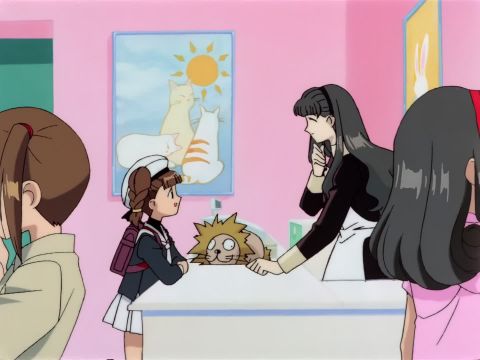
|
はい 寂しくならないように |
| Yes, so it won't be lonely. | |
に行く (にいく) - To go do
When you talk about going somewhere to do something.The verb has to be in the stem form, Add に and conjugate 行く.
Instead of 行く, you can also use 来る, or 帰り.
トムさんは 日本に 日本語を 勉強しに 来ました。 Tom came to Japan to study Japanese.
スーさんは 図書館に 本を 借りに 行きます。 Mary goes to the library to borrow a book.
今日 楽しみに 来ました。 I came to have fun today.
にする - To decide on
This is a slight different meaning from Adjective + する.Here, it is used when the speaker expresses a decision he has made.
今日は 何にしますか。 What have you decided on? (= What will you have?)
私は 焼き肉にします。 I've decided on grilled meat. (= I'll have grilled meat.)
今回はどこにしますか。 Where have you decided to go this time?(= Where do you want to go this time?)

|
よう 何にする? |
|---|---|
| Hey. What will it be? | |

|
私も 調査 兵団にする |
| I'm going to the Recon Corps too. | |
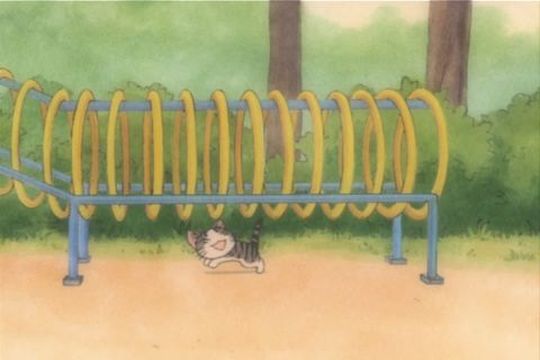
|
チーが 近くにする |
| I'm making this my home! | |
Showing example
たり~たりする - Do such things as a and b
This expression is used to indicate an incomplete set of actions or states.Contrary to the て-Form, たり implies you did more than the things listed and they weren't in that exact order.
It is formed with verbs or い-adjectives by adding -り to the end of the plain past form.
It can also be used with な-adjectives or nouns by adding だったり.
Add り after each past tense plain form verb you want to list, then add する or します.
The helping verb する at the end of the sentence indicates the tense of the sentence.
私 達は 歌ったり 躍ったりした。 We did things like singing and dancing.
このレストランのステーキは 大きかったり 小さかったりします。 Steaks at this restaurant are sometimes big and sometimes small.
家でゲームをしたり、 食べたりした。 At home. I did things like play video games and eat.

|
写真を 撮ったり |
|---|---|
| I can take pictures! | |

|
ゲームしたり お 酒 飲んだり |
| We play games, drink booze... | |

|
私 宿題 忘れたり 給食 残したり |
| I forgot to do my homework and didn't finish my lunch... | |
方 (かた) - The way of doing something; how to do
かた means "how" or "way" to do something.Attach it to a verb to mean "How to ", ot "the way is done".
Since 方 is a noun, it can be followed by は and を.
It turns the verb into a noun phrase, So when using it in a sentence with other nouns, を and に become の.
パソコンの 使いかたがわかりません。 I don't know how to use a computer.
ケーキの 作り方を 知っていますか? Do you know how to make a cake?
彼の 生き方は、かっこいいです。 His way of living is really cool.
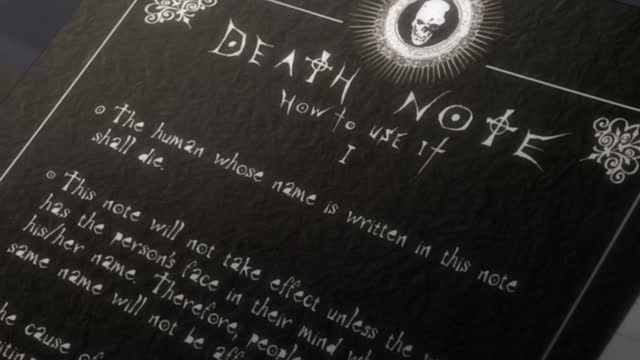
|
使い方: |
|---|---|
| How to use it... | |

|
そんな 生き方… |
| Anyone who lives like that... | |

|
今の 言い方だと― |
| The way you said that | |
Need
いる - Need
いる usually means there is.But it can also means that something is needed, necessary.
As it is an intransitive verb, the necessary/required item is marked with the subject-marking "ga" particle.
旅行にはお金と時間がいる。 To travel, you need time and money.
何がいりますか。 What do you need?
お前の力がいる I need your help.

|
それにはお 前の 力がいる |
|---|---|
| And I need your help to do that! | |

|
まあ 覚悟はいるわな |
| Well, you need resolve, all right. | |

|
ど…どれくらい いるんだよ |
| How much do you need? | |
必要 (ひつよう) - Need, necessary
必要 (ひつよう) is an adjectival noun meaning "necessity" or "neccessary".お 金が 必要です。 I need money.
あなたの 手は 洗う 必要がある。 Your hands need to be washed.
その 必要はない。 There is no need of that.

|
その 必要はない。 |
|---|---|
| I don't need to. | |

|
逃げる 必要ない |
| Run? There's no need for that. | |

|
必要だから 呼んだまでだ |
| I called you because I have a need for you. | |
Even
まで - Even, to the extent
まで is the equivalent of the English Expression "until."But まで can also be used when we want to make something sound extreme.
It is often used to describe your judgements about something surprising.
It can be translated by "even" or "to (an extent)".
Adding も can indicate surprise to an event or satisfaction with a result.
妹は 朝にまで] 風呂に 入ります。 (My) younger sister takes a bath even in the mornings.
電車の 中でまで] 勉強をしています。 (I) study even on the train.
怪我をしてまで] 私を 助けてくれました。 (He/she) even got an injury but still helped (me).

|
相手の 人の 名前まで… |
|---|---|
| You even know his name. | |

|
宮城お 前まで |
| Miyagi, even you've lost control now. | |

|
フッ 言うまでもなかったな |
| I didn't even have to say it. | |
も - Even, as many
も is a particle that can follow many types of words and phrases.It may be used to imply the existence of other similar items without specifically mentioning them, or for emphasis.
僕は ローマ字も 読めない。 I can't even read romaji.
その 話は 聞いた 事もない。 I haven't even heard that story.
私は 虫も 殺せない。 I can't even kill insects.

|
ひとつも? |
|---|---|
| Not even one? | |

|
それも? ああ |
| Even that one? Yeah. | |

|
仲間もできたしね |
| And I even have a crew! | |
でも - Even
Particle originating from て-form of です and the particle も ("also"), meaning "even".When used in combination with interrogative words, such as なに, だれ, etc., they adopt the meaning "any".
Thus, なんでも (the "i" is dropped) means "anything", だれでも means "anyone", etc.
どちらでもいいですよ。 Either way is okay.
そこでもいい。 Even there is fine.
雨でも 家へ 帰ります。 I will return home even if it rains.

|
10も 年上でも? |
|---|---|
| Even if there is a ten-year gap? | |
Interjection
わあ - Wow
When you find something exiting.It's like the english "wow!".
わあ、 良いね、このセーター。 Wow, this is a nice sweater.
わあ、すごい くるま じゃん! Whoa, what a cool car!
わあ、 本当に 面白い 道だね。 Wow, it’s really an interesting road, isn’t it?

|
わあ~! |
|---|---|
| Yeah. | |
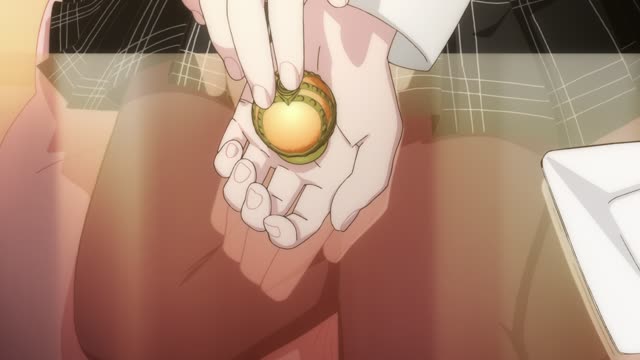
|
わあきれい |
| How pretty! | |

|
わあ! かわいい… |
| Wow, she's so cute! | |
へえ - Really ?
When you find something amusing or hard to believe, or midly surprising: "Oh, is that right ?"へえ、すごいな! Wow, that's amazing !
へえ、そう なんだ。 Wow, really!
へー きれいなネコ What a beautiful cat.

|
へえ 珍しい |
|---|---|
| Wow, that's rare. | |

|
あら あら へえ |
| My, my... Oh? | |

|
へえタイムマシン |
| A time machine... | |
List
と - And
と is used to list things exhaustively."A, B, C and D" is usually expressed as "AとBとCとD."
と connects noun phrases only.
Thus, it cannot be used for 'and' in sentences.
コーヒーと 牛乳。 Coffee and milk.
英語と 日本語を 話します。 I speak english and japanese.
私はフルーツとパンも 食べます。 I eat fruit and also bread.

|
カミナとシモンだ |
|---|---|
| I'm Kamina, and this is Simon. | |

|
母と 子 |
| Mother and child... | |

|
金と 女 |
| Money and women. | |
や - And … (making list)
や connects two nouns to make a non-exhaustive list.や is similar to と.
The difference is that や implies there are more items to the list.
It is often used with など, which means "etc."
バスや 電車で 行く。 To go by bus and train. (but not limited to)
その 花壇には 赤や 黄色の 花が 咲いていた。 There were red. yellow and other color flowers blooming in the flower garden.
夏休みは 家族で 山や 海に 行きました。 I went to the places like the mountain and the sea with my family during summer vacation.

|
草花や 水や 風… |
|---|---|
| Plants, water, and wind... | |

|
俺や 君だって |
| So are you and I. | |

|
橋や 街やロケット |
| …bridges, cities, and rockets… | |
など - And so on; and the like; for example; things like ~
など is a marker that indicates exemplification.It can be used in 2 ways.
Usually it's used for emphasis, like なんか.
✕など... means "like or similar to ✕".
The second way, is similar to the English "and so on" and "et cetera" in that it is used to conclude a list of examples with the implication that there are more that are left unsaid.
女の子へのプレゼントにはぬいぐるみなどが人気です。 Stuffed animals and other stuff like that are popular presents for girls.
魚にはサンマなど、たくさんの種類があります。 There are so many different kinds of fish. like pike. to name just one.
雨や風などの被害が出ています。 There has been some damage from wind. rain. etc.

|
お 前などに 用はない。 |
|---|---|
| I don't have any business with the likes of you. | |

|
王 選など 無意味じゃ |
| This selection is pointless. | |

|
誰にも 敵などいないんだ |
| No one has any enemies. | |
とか - Such as x and y
A conjunction that lists two or more items, actions or states as inexhaustive examples.食べるとか 飲むとかする To eat and drink (among other things)
明日とかあさってはどうですか How about tomorrow or the day after?
明日の 夜とかどう? How about tomorrow night?

|
外は 車とか 危ないし |
|---|---|
| There are cars and other dangers outside. | |

|
歌… とか |
| Songs... and stuff. | |

|
観察 用のノートとか お 弁当とか |
| A notebook for observations and lunch, among other things. | |
Planning to do
つもり - Plan to ~; intend to ~
つもり follows verbs in the present tense short form to describe what a person is planning to do.つもり following a verb in the negative form decribes what you are not planning to do.
日本に 行くつもりだ。 I intend to go to Japan.
山下 先生は 明日 大学に 来ないつもりです。 Professor Yamashita does not intend to come to school tomorrow.
お 寺を 見に 行くつもりでしたが、 天気がよくなったから、 行きませんでした。 We were planning to visit a temple. but we didn't. because the weather was not good.

|
行くつもりだな |
|---|---|
| Do you plan on going? | |

|
そのつもりです |
| That's my plan. | |

|
どうするつもりだ? |
| What are you planning? | |
つもりで
日本に行ったつもりで、日本語を勉強しています。 With the intention of going to Japan, I am studying Japanese.今月末までに完成させるつもりで、毎日努力を出した。 With the intention of finishing by the end of the month, I worked on it everyday.
お土産のつもりで買ったが、食べてしまった。 I bought it with the intention of as a gift, but ended up eating it.
うと思います - I am thinking of
This pattern is used to show your intentions to someone.It uses the volitional form of the verb, and the verb 思う, to think.
日本の 会社で 働こうと 思います。 I intend to work for a Japanese company.
帰ってから、おかしを 食べようと 思います。 I think I will eat candy after returning home.
私は 外に 座ろうと 思います。 It's a nice day. I think I'll sit outside.

|
手伝おうと 思って |
|---|---|
| I thought I'd help. | |

|
遊ぼうと 思ったのに |
| I wanted to play. | |

|
驚かそうと 思ってね |
| I thought I'd surprise you. | |
てみる - Try doing
You can use the て-Form of a verb and the helping verb 見る (みる) to express the idea of trying something.You are not sure of the outcome of your action or it can be something you try for the first time.
みる can be conjugated like a normal verb.
私はやってみる。 I will try to do it.
沖縄へ 行ってみてください。 Please try to go to Okinawa.
私も 食べてみたいです。 I'll try to eat too.
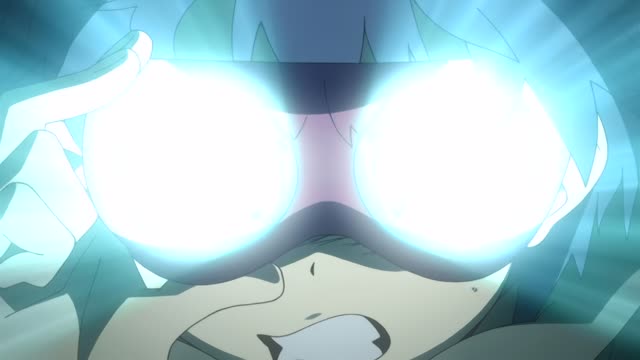
|
やってみる |
|---|---|
| I'll see what I can do. | |

|
試してみるさ |
| Just try me! | |

|
俺が 話してみるからさ |
| I'll try talking to her. | |
Unsorted
予定だ(よていだ) - Plan to, intend to
This can be used in combination with either a Verb or Noun to express plans or intention to do something.会議は月曜日の予定です。 The meeting is planned for Monday.
学校で研究をする予定です。 I plan to do research at school.
私は晩ご飯を作る予定だったが、彼がご飯を食べて帰って来た。 I had intended to to make dinner, but he ate before coming home.

|
プロの 作家も 来る 予定だったのに! |
|---|---|
| A professional author was supposed to go, too! | |
Seems like
そう - Looks like
そう means "it looks like", "it appears".You add it to the adjective to say that something seems ... "adjective".
In case of い-Adjective, take out the い and add そう.
いい becomes よさ, add そう.
In case of な-Adjective, take out the な and add そう.
そう is a な-Adjective, when used as an adjective before a noun, it becomes そうな.
Use the conjugation before そう to tell the difference between "hearsay" or "it looks like".
雨が 降りそうだ。 It looks like it will rain.
あの 車が 高そうだ。 That car looks expensive.
あのレストランの 寿司は 美味しそうです。 This restaurant's sushi looks delicious.

|
うまそう |
|---|---|
| These look great! | |

|
うん 大丈夫そう |
| They look fine! | |

|
いい 子そうですね |
| She looks like a good girl. | |
よう - Appears; seems; looks as if ~
ようだ can mean: it appears as if..., it seems as if..., it looks as if..It indicates that the speaker has assessed the situation, and has made a certain judgement about it.
It's a guess based on facts.
You cannot use the polite form before よう.
誰か 来たようだ。 It seems that someone has come.
彼女は 眠いようです。 It looks like she's sleepy.
かなり 悪い 言葉のようだ。 It seems that they're quite bad words.

|
辛いようだな |
|---|---|
| It looks painful. | |

|
留守のようだな |
| Looks like there's no one home. | |

|
ここのようですわね |
| This looks to be the place, huh? | |
のように - Like
"Noun A + のような + Noun B" means "a B similar to A".B has the same quality or appearance of A, or A is an example of B.
You use "A のように" when you want to describe an action which is "done in the same way as A"
はビールを 水のように 飲む。 He drinks beer like it's water.
ハムスターのように 口に 食べ物を 入れた。 I stuffed food in my mouth similar to a hamster.
スープのようなカレー。 Soup-like curry.

|
昔の 私のように |
|---|---|
| Just as you tested me, long ago. | |

|
水のようになるんだよ |
| You have to be like water... | |

|
祖父のように |
| ...like my grandfather. | |
みたい - Appears; seems; looks as if ~
Equivalent to the English phrase "looks like".夢みたい! It's like a dream!
これを 使ったみたい It looks like she used this.
私なんか バカみたい。 I feel like a fool.

|
夢みたい! |
|---|---|
| It's like a dream! | |

|
これを 使ったみたい |
| It looks like she used this. | |

|
夏じゃないみたいだ |
| It's almost like it's not even summer. | |
まるで - Quite, as if, practically
Adverb meaning "quite", "as if", "practically" and so on.It is usually found together with you da or mitai.
When used with the negative verbs it means "completely", "totally" and so on.
まるで 夢のようだ。 It's like a dream.
まるで 戦争だ。 It's practically war.
まるで 眠れなかった。 I couldn't sleep at all.
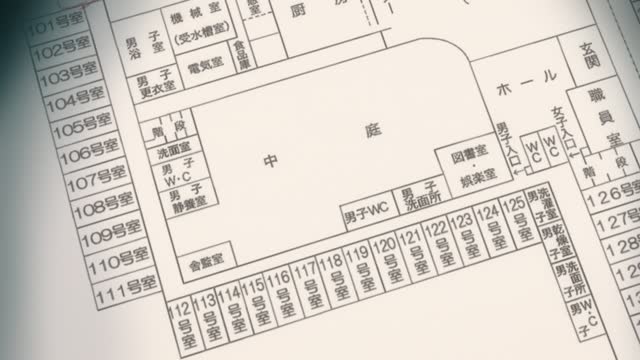
|
まるで 監獄 |
|---|---|
| It's just like a prison! | |

|
まるで 猿だな |
| You're almost like a monkey. | |

|
まるで 生きているような |
| Why does she look so alive? | |
Hearsay
そう - I've heard that
Something you heard from someone else.You are not 100% clear that it is the truth, so you are indicating that you got the information from another source.
Use the conjugation before そう to tell the difference between "hearsay" or "it looks like".
When ~そうです comes after な-Adjectives and nouns, we need the copula だ before it.
雨が 降りそうです。 It looks like it might rain.
あの 人が 新しい 日本語の 先生だそうだ。 Apparently that person is the new Japanese teacher.
そういう 人いるかな。 I wonder if there is someone like that.

|
俺の 村でもそう 言ってた |
|---|---|
| I've heard that from my village too! | |

|
強い 民族だったそうだ。 |
| I heard they were a strong people. | |

|
今日も 満員御礼だそうだ |
| Apparently it's packed out there today. | |
と言っていました - Someone said...
You can use the Expression と言っていました to quote what someone else (he, she, they) says or think.It combines the quotation particle と and the verb to say 言う (いう).
It's placed after a plain form phrase.
と言っていました indicates that you were there and heard the phrase (I heard him saying "...").
と言いました is more appropriate if you weren't there.
テイさんは 明日 祭りがあると 言っていました。 Tei said there would be an festival tomorrow.
スーさんは 明日 試験があると 言っていました。 Sue said there would be an exam tomorrow.
メアリーさんも 来ると 言っていましたから。 Because Mary said she would also come.

|
黙れと 言っている |
|---|---|
| I said, silence! | |

|
ウソだと 言ってくれ |
| Someone tell me I'm dreaming! | |

|
私は 動くなと 言った |
| I told you not to move. | |
らしい - It seems like; i heard; apparently~
らしい is used to say:- It seems like~
- I heard~
- Apparently~
- Typical of~
It's an auxiliary verb.
何も 知らないらしい。 It seems you don't know anything.
何でも 彼は 町を 出たらしい I heard that he has left town anyway.
近くで 火があったらしい Apparently there was a fire in the vicinity.

|
本当らしい |
|---|---|
| I'm told it's true... | |
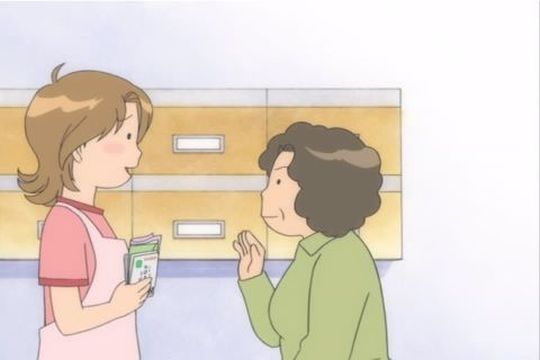
|
らしいわよ |
| Yes, according to rumors. | |

|
よくないらしい |
| It seems he's in bad shape. | |
Quotation
と - Quotation
The particle と can also be used to mark the end of a thought or a quotation.Often proceeded by the plain form of a verb, and followed by verbs like 言う: to say.
「重いですか」と聞きました。 He asked, 'Is it heavy?'
メモに「私は今から学校に行きます」と書きました。 I wrote, 'I am going to go to school now.' on a note.
「晩ごはんを作った」と言った。 I said, 'I made dinner.'

|
「ハンター」と 呼ぶ |
|---|---|
| ...as Hunters! | |

|
「 僕ら」だと |
| “We," you said? | |

|
リコといいます |
| My name's Riko. | |
って - Quotation
って is the casual form of と in spoken japanese.It can also replace そうです to quote something that you've heard.
トロってなんですか。 What is Toro ?
もう 帰ったって 思ってたよ。 I thought you'd already gone home.
彼女は 遅れて 来るって 聞いたよ。 I heard that she's going to come late.

|
“ 犬”って 言ったな |
|---|---|
| You called me a dog, didn't you? | |
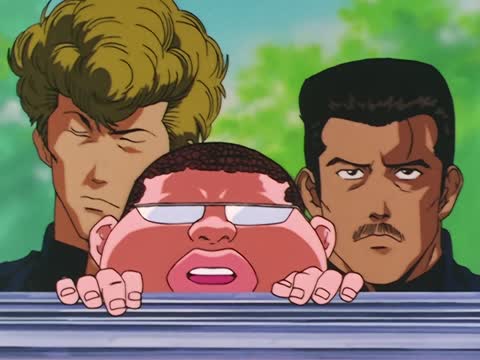
|
流川ってやつが |
| The one called Rukawa. | |

|
デートだってさ |
| She called it a "date." | |
という - Called ~, that ~
Combination of the quotation-marking particle と and the verb 言う, meaning "to say."This phrase is followed by a noun, as in "--という " and it marks the information which identifies or explains the following noun.
私の 出身は、「つ」というまちです。 I'm from a city called 'Tsu.'
ポケモンというゲームを知っている? Do you know the game called/named Pokemon?
これは 何という 花ですか? What's this flower called?

|
“ウェリンバラ”という 所よ |
|---|---|
| The area is called Wedinburgh. | |

|
ノルウェーという 名の 土地だ |
| In a land called Norway. | |

|
福田という 男だ |
| That person was Fukuda. | |
Conjugation - Conditional
ば - If
The ~ば conditional is used to indicate a condition, and an action, or state that will come to exist or be performed whenever that condition holds true.Like the other Japanese conditionals ("なら", "たら" and "と") it corresponds to the English "if" conditional.
You usually the "A ば B" pattern when the condition "A" guarantees a good result in B.
Otherwise たら is more appropriate.
もっと 背が 高ければいいのになあ。 I wish I were taller.
明日雨が降れば、映画を見に行くつもり。 If it rains tomorrow, then I will go watch a movie.
今日サッカーの練習に行けば、明日は行かなくてもいい。 If you go to soccer practice today, then you don't have to go tomorrow.

|
勝てば 生きる |
|---|---|
| If you lose, you die. | |

|
武器があれば… |
| If I had a weapon... | |

|
戦わなければ 勝てない |
| If you don't fight, you can't win! | |
Conditionals
たら - If ... Then
There's a few grammar points for conditionnals: ば, なら, と, たら.たら is used to express an assumed condition.
"A たら B" basically means "if A then B".
When you say "A たら B" you cannot express a sequence of events in which B occurs before A.
B can only takes place at the same time A comes true, or later.
If after expressing a condition, we invite somebody to do something together, or we express a request or a hope, and use たら.
You can use と instead of たら under a certain condition where something always occurs.
雨に 濡れたら 風を 引くよ。 If you get wet with rain. you may catch a cold.
雨が 降ったら、 帰りましょう。 Let's go back if it rains.
明日も 来れたら 来るね。 I'll come back tomorrow if I can.

|
よかったら どうぞ |
|---|---|
| You're welcome to try them if you'd like. | |

|
負けたら? |
| And what if you lose? | |

|
俺が 行ったら ダメだ |
| It won't work if I go. | |
と - When..., Will always happen
If と comes after a verb or an adjective, it indicates a condition.It translates into as soon as, when, or if.
We use と, when we show that under a certain condition, something always occurs as a law of nature, a habit, or an expected result.
Verbs take the short form before と.
あの 雲が 見えると 雨が 降ります。 When you see the clouds, it will rain.
うるさいと 勉強 出来ません。 If it is noisy, I can't study.
早く 家を 出ないと 電車に 間に合わないよ! If you don't leave quickly, you won't make the train!

|
見つかるといいな |
|---|---|
| It would be nice if you found him... | |
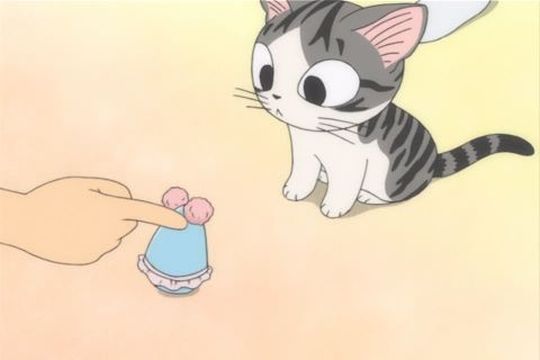
|
こうすると、ほら |
| If you do this, see. | |

|
敵と 遭遇した 場合… |
| When encountering an enemy... | |
なら - If; in the case that~
なら is the hypothetical form of the "だ" copula.It introduces the conditions under which a given hypothetical statement will hold true.
Unlike other conditionals in Japanese ("と", "たら" and "ば"), the "なら" conditional does not have a strict "if CONDITION, then RESULT" ordering.
Rather, it indicates that the result will occur if the conditions expressed are true or *will ever* be true.
の can be use as emphasis before なら.
旅行に行くなら、おみやげを買ってきてください。 If you are going on a trip, buy me some gifts.
宿題が難しいなら、一緒にしよう。 If the homework is hard, let's do it together.
トムが 行くなら 私も 行く。 If Tom goes, I will, too.

|
私なら… |
|---|---|
| If it were me... | |

|
なら いいの? |
| Will you go out with me, then? | |

|
欲しいなら あげるわよ |
| I'll send it to you if you want. | |
ばあい - In the case, if
場合 (ばあい) Expresses the consequence of a hypothetical situation.もしもの 場合わね If something happens...
日本語の勉強を始める場合はいい教科書を買わなくてはいけない。 In the event that you start studying Japanese you have to buy a good textbook.
私の犬の場合は家族と一緒です。 In the case of my dog, he is like family.

|
高いところにいればあいつらは 怖くないさ |
|---|---|
| If you're in a high place, they aren't scary. | |
Wish
といい - I hope
といい is used for when you want something to happen.Litteraly means "good if". In english, we would use expression like "I wish" or "I hope".
You can also use it to suggest someone should do something.
試合に 勝つといいですね。 I hope we win the game.
楽しいといいです。 I hope it is fun.
日本に 来て 彼女と 一緒に 住むといいね。 My wish is for my girlfriend to come to Japan and live with me.

|
また 会えるといいね |
|---|---|
| It'll be nice if we meet again. | |

|
殺せるといいですね |
| I do hope you can! | |

|
見つかるといいな |
| It would be nice if you found him... | |
たらいい - It would be nice
といい and たらいい show that the action in the sentence is desirable.Litteraly means "good if". In english, we would use expression like "I wish" or "I hope".
毎日、 好きな 番組が 見れたらいい。 It would be nice if I could watch my favorite TV show everyday.
別に、 自由にしたらいいでしょう。 It would be nice to just do whatever you want. wouldn't it?
明日と 明後日も 晴れるといいですね。 It would be nice if the weather was clear tomorrow and the day after. wouldn't it?

|
ああ 入れたらいいな |
|---|---|
| It'd be great if I could get in... | |

|
だったらいいな |
| I hope so. | |

|
どうしたらいい |
| What should I do? | |
ばいい - It’d be good if
Shows that the action in the sentence is necessary and sufficient to achieve a goal.Litteraly means "good if". In english, we would use expression like "I wish" or "I hope".
運動すればいいだろう。 It would probably be good if you eercised.
ドライブに 行きたいなら、 運転免許を 取ればいいです。 If you want to go driving. it would be good to get a driver's license.
道の 案内を、 誰に 聞けばいいのか 分からない。 I don't know who would be good to ask directions from.
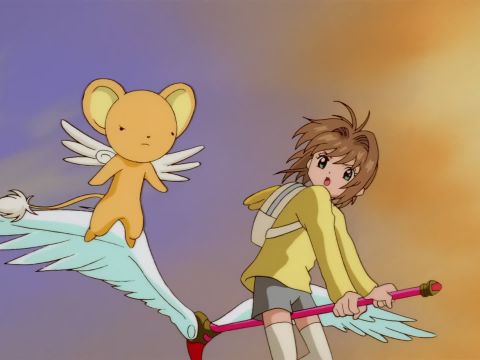
|
どうすればいいの? |
|---|---|
| What should I do? | |

|
見ればいいんだろ |
| I'll check it out, all right? | |

|
そいつに 聞けばいい |
| We can ask him. | |
Expressing change
くする - To make something ~
This grammar point express that a situation is changed through a person's will.A change occur due to an effort on the speaker's part.
なる expresses a change that is not is someone's control.
早くしてくれよ Make it fast, please.
お 前は 絶対にチームを 強くする You will definitely make our team strong.
もうちょっと 安くしてもらえますか。 Could you make this a little cheaper?

|
火を 強くしてくれ |
|---|---|
| Add more wood to the fire. | |

|
( 千) 早くしろよ! |
| Hurry up, sen! | |

|
早くするのじゃ |
| Now! Hurry! | |
くなる / になる - To become
なる is the verb to become. You can use it to express a change.なる follows nouns and both types of adjectives.
Adjective + なる express change like Adjective + する.
However, なる refers to a change that is not in someone's control.
With い-Adjectives, remove the い and くなる.
With な-Adjectives, add に and then なる.
どうなってんだよ? What's going on?
日本語の 勉強が 楽しくなりました。 Studying the Japanese language is fun now (it wasn't before).
日本語の 勉強が 好きになりました。 I have grown fond of studying the Japanese language.

|
春になりますね |
|---|---|
| Spring comes! | |

|
鼻 赤くなる |
| My nose is turning red! | |

|
寂しくなるの |
| It'll be lonely around here. | |
なくなる - Become no more
Expresses the idea that someone/something is not in some state any more or that someone/something does not do something any more.最近、お 酒を 飲まなくなりました。 I don't drink alcohol any more.
夏になると暑くて眠れなくなる。 When the summer comes, I can't sleep well because it's hot.
アルコールを 飲むと、 判断力がなくなる。 If you drink alcohol, you'll lose your sense of judgment.

|
わ…なくなりました! |
|---|---|
| It's gone! | |

|
え… いなくなるって? |
| Disappear? | |

|
君はもう 来なくなる |
| You... You won't come again... | |
て行く - Continue on
行く means to go.When used as an auxiliary verb following the て form of another verb, it indicates a change or action that has started at some point in the past (or present) and will continue into the future.
日増しに 涼しくなっていく。 It's getting cooler day by day.
毎日、 会社に 弁当を 持って 行く。 I take a boxed lunch to work every day.

|
中庭には どうやって 行くのかな |
|---|---|
| I wonder how you get to the courtyard. | |

|
ううん 歩いて 行くんだ |
| Nope. We're gonna walk. | |

|
送って 行かなくていいの? |
| I'll see you home. | |
Guess
かもしれません - Might, maybe, probably
The phrase かもしれない is used to express possibility or uncertainty.It's similar to the ending particle でしょう.
You can translate it with "perhaps", or "might be".
It's made from 知る (しる) : to know, in the non-past negative form.
The more casual form is : かも.
それは 危険かもしれない。 That's probably dangerous.
あしたは 天気がよくないかもしれない。 The weather may not be good tomorrow.
遅れるかもしれない。 I will probably be late.

|
なんかきれいかも |
|---|---|
| I think I like this. | |

|
今夜 死ぬかもしれない |
| Someone might die tonight. | |

|
確かにそうかもしれません |
| That may be true... | |
はず - Expected to
Use はず to make a statement you are confident about.It implies a strong expectation.
It can be translated as "it must be" or "it has to be".
It directly follows verbs and adjectives in plain form
Add の between a noun and はず.
この 本が 難しいはずがない。 There is no way this book is difficult.
ここから富士山が見えるはずだ。 One should be able to see Mt. Fuji from here.
明日には よくなるはずだ I should be fine tomorrow.

|
変わってるはずだ |
|---|---|
| No wonder she's so strange. | |

|
一緒のはずだろ? |
| It should be the same. | |

|
忘れるはずはない |
| I'd never forget that. | |
Order
なさい - Do... (Command)
なさい is an honorific form of する.It'scombined with the stem form of the verb to create an imperative, or a strong way to give instructions, requests.
It is from a position a superiority (parent, teacher, boss).
Can be shortened to just な in the casual form.
本を 開けなさい。 Open your book.
早く帰りなさい Hurry up and go home!
野菜を食べなさい Eat your vegetables!
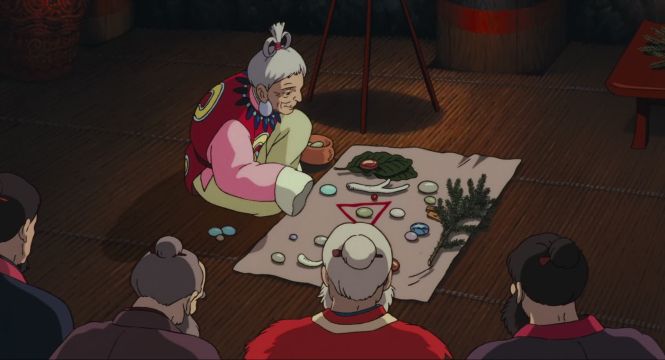
|
見なさい |
|---|---|
| Look. | |

|
あたしに 任せなさい |
| Just leave it to me! | |

|
さあ こっちに 来なさい |
| Now, come over here. | |
ほうがいい - It’d be better to
It's a sentence-final Expression used to strongly suggests someone to do something.方 (ほう) means direction, manner, way, method...
いい means good.
When the advice is in the affirmative ほうがいい generally follows the past form of a verb.
When the advice is in the negative ほうがいい generally follows the present form of a verb.
日本語の 本を 読んだほうがいいです。 You'd better read Japanese books.
お 医者さんに 聞いたほうがいい。 It would be better to ask a doctor.
帰った 方がいい。 It'd be better to go home.

|
離れたほうがいい |
|---|---|
| We should distance ourselves. | |

|
やめたほうがいい |
| You shouldn't. | |

|
死んだほうがいいかな |
| Maybe it would be better to just die... | |
ないほうがいい - It’d be better not to
You can use ほうがいい to tell someone it would be better to not do something.Use the negative form of the verb and ほうがいい.
雨が 降らない 方がいい。 If it does not rain. it'd be better.
タバコを 吸わない 方がいい。 It'd better not to smoke cigarettes.
一人で 行かない 方がいい。 It would be better not to go alone.

|
動かないほうがいい |
|---|---|
| You shouldn't move. | |

|
知らないほうがいい |
| It is better not to know. | |

|
行かないほうがいいよ |
| It's better that you don't go. | |
Pronoun
Adjective + の - one - One
When a noun follows an adjective, and when it's clear what you are refering to, you can replace the noun with pronoun の, "one".You can use の to avoid repetition.
黒いセーターを 持っています。 赤いのも 持っています。 I have a black sweater. I have a red one too.
安い 辞書を 買いに 行きました。でもいいのがありませんでした。 I went to buy an cheap dictionary, but there were no good ones.
新しいのは 彼の 車だ。 The one that is new is his car.

|
昨日の |
|---|---|
| The one from yesterday! | |

|
キミは 昨日の |
| You're... the one from yesterday. | |

|
あの 時の |
| The one from before! | |
Nominalizer
こと - Nominalizer (To~; ~ing; that)
The nominalizer こと turns not just a verb or adjective but an entire sentence into a noun phrase.Once a sentence has become a noun phrase, it can be used anywhere a regular noun phrase can be used.
In contrast to another nominalizer の, こと tends to indicate something the speaker does not feel close to, or he's not involved with.
He is stating the sentence in general or objective terms.
The nominalizer の, however, indicates something which the speaker can directly perceive or empathize with.
日本語を 話すことは 難しい。 Speaking Japanese is difficult.
スポーツをすることが 好き。 I like playing sports.
想像することは 大切なことです。 Using your imagination is important.

|
やることは 山ほどある |
|---|---|
| We have many things to accomplish. | |

|
殺すことだ。 |
| to kill a certain man! | |

|
他にすることはないのか? |
| Don't you have anything better to do? | |
の - Nominalizer (That~; to do something; doing something)
A nominaliser which is used when the nominalised sentence expresses a directly perceptible event.In contrast to another nominalizer の, こと tends to indicate something the speaker does not feel close to, or he's not involved with.
He is stating the sentence in general or objective terms.
The nominalizer の, however, indicates something which the speaker can directly perceive or empathize with.
日本語を 教えるのは 難しい。 Teaching Japanese is difficult.
私は 雪子さんがビールを 飲むのを 見ました。 I saw Yukiko drink beer.
日本へ 行くのは 簡単です。 Going to Japan is easy.
Experience
たことがある - To have done something before
たことがあります is used to indicate a past experience of doing something.It can only be used to talk about things in the far past, not something recent.
Therefore the verb is always in the past tense.
We cannot use this expression when we have done something repeatedly.
We cannot use いつも, たいてい or よく.
私は 馬に 乗ったことがあります。 I have ridden a horse before.
幽霊を 見たことがありますか。 Have you ever seen a ghost before ?
今で 見たことがないので 分かりません。 I don't know. I've never seen it.

|
聞いたことがあるんです |
|---|---|
| I heard of something... | |

|
あんたに 聞きたいことがある |
| There's something I want to ask you. | |

|
この 夢… 前にも 見たことがある |
| This dream... I've seen it before... | |
ことがある - Happens occasionally
ことがあります means that something happens occasionally.It's used after a plain form verb and placed at the end of a sentence.
ことがある is the more casual form.
この 部屋では wifiの 速度が 遅くなることがあります。 There are times when the wifi gets slow in this room.
トムは3 日間くらいお 風呂にはいらないことがあります。 Tom sometimes doesn't take a shower for three days.
学校に送ってもらうことがある。 I sometimes get a ride to school.

|
胸が 痛むことがあるの |
|---|---|
| Sometimes my heart hurts... | |
Conjugation - Potential
Potential form - Able to do something (potential)
The potential form られ (る / ます) has different meanings.- Someone's ability to do something (capability or possibility).
It can be translated by "can do".
- Permission to do something under a certain circumstance.
- Something is possible
When in the potential form, verbs can be attached to the particle を or が.
All the other particles remain the same when the verb is turned into the potential.
あの 山が 見えますか。 Can you see that mountain over there?
10 分 待てますか。 Can you wait 10 minutes?
もう 一度 言ってください。 周りがうるさくて 聞こえません。 Please say it once more. It is so noisy that I am unable to hear you.

|
またどこかで 会える? |
|---|---|
| Can we meet again? | |

|
降りれる? うん |
| Can you get down? Yup. | |

|
やれるか |
| Can you do it? | |
出来る (できる) - Can, be able to -
出来る (できる) is the potential form of する.ができる is used to describe your ability to do something, like the verb "can".
It also expresses the nuance that someone is good at something, especially when used together with adverbs such as よく.
出来る and the potential form can be used interchangeably.
It can also mean that something is completed / finished, or appeared / has been made.
田口さんは 中国語を 話すことが 出来る。 Mr. Taguchi can speak Chinese.
晩御飯ができました。 Dinner is ready.
新幹線に 乗れば 大阪まで三 時間で 行くことが 出来る。 If you take the bullet train. you can get to Osaka in three hours.

|
そんな できません |
|---|---|
| I... can't do that... | |

|
未来 予知が 出来るのさ |
| It can actually predict the future. | |

|
そんなことができるの |
| You can do that? | |
見える / 見られる - Can see
見える means that something or someone is spontaneously visible.見られる means that the subject of the sentence can see something or someone actively rather than passively.
見られる is the potential form of 見る.
窓から(は) 海が 見える From the window the ocean is visible.
私には 木の 上の 小さな 鳥が 見えた。 I could see small birds on the tree.
東京タワーからは 東京の 町がよく 見える From Tokyo Tower you can get a good view of the towns of Tokyo.

|
見えるのか |
|---|---|
| Can you see them? | |

|
何も 見えないよ! |
| I can't see anything! | |

|
見られたか |
| He saw me? | |
聞こえる / 聞ける - Can hear
聞こえる means that something or someone is spontaneously audible.聞ける means that the subject of the sentence can hear something or someone actively rather than passively.
聞ける is the potential form of 聞く.
見られる is the potential form of 見る.
聞こえる? Can you hear me?
変な 音が 聞こえる。 I can hear a strange noise.
俺様の 言うことを 聞け! Listen to what I say!

|
ああ 聞こえる |
|---|---|
| Yeah. I can hear you. | |

|
そこのお 前 聞こえたぞ |
| You there! I heard that! | |

|
怖くて 聞けないんだ |
| I'm too scared to ask... | |
To give and receive
あげる - To give
In japanese, different verbs are used, depending on wether you are speaking from the perspective of the giver or the receiver.あげる: you or someone is giving something to someone else.
くれる: someone is giving something to you.
もらう: you receive something or someone receives something from someone else (but not you).
私はその 女の人に 花をあげます。 I will give the woman flowers.
あの女の人は男の人に 時計をあげました。 The woman gave the man a watch.
友達にプレゼントをあげます。 I'll give you a present to my friend.

|
俺があげた |
|---|---|
| I gave it to her. | |

|
あげます! |
| You can have this. | |

|
誰かに… あげる |
| Give it to someone... | |
もらう - To be given
In japanese, different verbs are used, depending on wether you are speaking from the perspective of the giver or the receiver.あげる: you or someone is giving something to someone else.
くれる: someone is giving something to you.
もらう: you receive something or someone receives something from someone else (but not you).
The polite form of this verb is 頂く (いただく).
水をもらえますか。 Can I have some water, please?
これ 誰にもらったの? Who gave you this?
男の人がお 金をもらった。 The man received money.

|
もらった |
|---|---|
| I got it now! | |

|
もらいます |
| I'll take that. | |

|
いいヒントをもらった |
| You've given me a good clue. | |
くれる - To receive
In japanese, different verbs are used, depending on wether you are speaking from the perspective of the giver or the receiver.あげる: you or someone is giving something to someone else.
くれる: someone is giving something to you.
もらう: you receive something or someone receives something from someone else (but not you).
In sentences with くれる, the subject of the sentence is the other person.
With もらう, the emphasis is on you receiving something, the subject of the sentence is you.
写真をくれるですか。 Are you going to give it to me?
それ 誰がくれたの? Who gave you that?
父が 本をくれました。 My father gave me a book.

|
くれるの? |
|---|---|
| I can have this? | |

|
くれるのか? |
| For me? | |

|
ん?え ッくれるの? |
| For me? | |
てあげる - To do for; to do a favor
This structure is used when you do something for someone.The addition of the helping verb あげる doesn't change the basic meaning of the sentences, but put focus on the fact that the actions were performed on demand or as a favor.
It's not used when you do something for someone superior than you.
母に 花を 買ってあげた。 I bought flowers for my mother.
今回だけは 許してあげる。 I'll forgive you just this once.
良いことを 教えてあげる。 I’ll teach you something good.

|
僕が 言ってあげるよ |
|---|---|
| I'll tell them for you. | |

|
守ってあげてね |
| You have to protect her, okay? | |
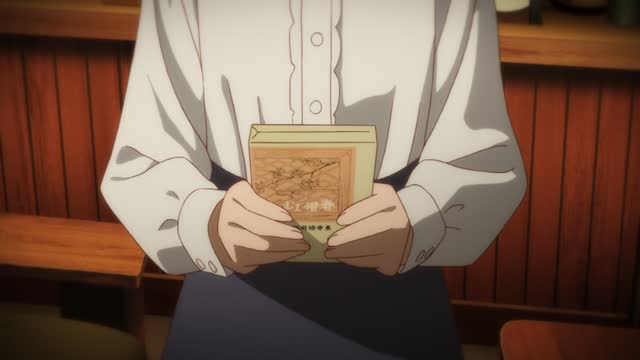
|
これ 貸してあげる |
| I'll lend you this. | |
てもらう - To get somebody to do something
もらう is used when you receive something from someone else.てもらう can be used when you receive an action from someone else.
The subject is the beneficiary.
The subject is usually the speaker, and the expression is used to show thankfulness.
友達に韓国語を教えてもらいました。 My friend taught me Korean.
バッグを 持ってあげますよ。 Let me carry your bag for you.
晩ご飯を 作ってあげるよ。 I will make dinner for you.

|
話してもらおう |
|---|---|
| Let me hear it. | |

|
働いてもらうぜ。 |
| We have some work for you. | |

|
それより 見てもらいたい |
| Anyway, look at this. | |
てくれる - To do a favor; do something for someone
くれる is used when someone gives you something.てくれる can be used when someone does an action for you.
The subject is the benefactor.
塩 取ってくれる? Can you pass me the salt?
それ 取ってくれる? Can you give me that?
姉はいつも 私を 助けてくれる。 My older sister always helps me.

|
やめてくれ |
|---|---|
| Please, stop! | |

|
待ってくれ |
| H-Hey, hold on! | |

|
聞いてくれ |
| Listen to me. | |
ところ
V + ところ - About to -
The meaning of ところ depends of the tense of the verb just before it.With a verb in plain form, it means "about to ".
It can shortened to とこ.
春江は 晩ご飯を 食べるところです。 Harue is just about to eat her supper.
外にランチを 食べに 行こうと 思ったところ、 雨が 降り 始めた。 Right when I was on the verge of thinking about going and having lunch outside. it started raining.
勉強をしていたけど、 今は 休んでいる。 I was studying but am taking a break right now.

|
ない これから 探すところだ |
|---|---|
| Don't got one. I'm just about to look for one. | |

|
間違えるところだった |
| I was about to make the wrong move. Pfft. | |

|
家に 帰るところです |
| I'm just heading home. | |
V + ところ - In the middle of -
The meaning of ところ depends of the tense of the verb just before it.With a verb in ている form, it means "in the middle of ".
The difference with just the ている form is that your put emphasis as "right now".
春江は 晩ご飯を 食べているところです。 Harue is in the midst of eating her supper.
今、 映画を 見ているところです。 I am in the middle of watching a movie right now.
ちょうど 今 晩ご飯を 作っているところなので、 早く 帰って 来て。 Just now. I am in the middle of making dinner. so hurry home.

|
昼寝しているところ |
|---|---|
| Here he is sleeping. | |

|
ダラダラしているところ |
| Here he is lazing around. | |
V + ところ - Just did -
The meaning of ところ depends of the tense of the verb just before it.With a verb in past form, it means "just did ".
ばかり implies "a little while ago", while たどころ means "happened just now."
春江は 晩ご飯を 食べたところです。 Harue has just eaten her supper.
服を 脱いでいたところに、 母が 部屋に 入ってきた。 My mom came into the room just as I was taking my clothes off.
旅行に 行ったところに、 台風が 来てしまった。 Just as I was leaving for a trip. a typhoon unfortunately came.

|
笑ったところがそっくり |
|---|---|
| You look just like her when you smile. | |

|
いいえ 今 来たところ |
| No, I just got here. | |

|
俺も もうやめたいと 思っていたところだ |
| I was thinking of calling it quits, anyway. | |
Auxiliary verb
Causative form
The causative form has two meanings according to context:-The "coercive causative" meaning, "make or force someone or something to do something"
-The "permissive causative" meaning, "let someone or something do something"
You need context to be sure which it is.
The helping verbs てあげる, てもらう, てくれる usually imply it's a "permissive causative".
電車でお 母さんが 赤ちゃんを 笑わせている The mother is making her baby laughing on a train.
祖母の 死は 私たちを 悲しませた。 My grandmother's death made us feel sad.
その 仕事は 私にさせてください。 Please let me do that work.
Passive form
This is used to express the idea of relunctantly being forced to do something that has to be done.Or you can simply express your dissatisfaction using the passive sentence.
- The "victim" is affected by an event. Marked with the particle は or が.
- The "vilain" performs an action which causes the suffering. Marked with に.
- The "evil act" is described with the passive form of a verb.
私はお母さんに叱られました。 I was scolded by my mother.
サンドバッグのように 殴られた。 I was hit like a punching bag.
私の 牛乳を 全部 誰かに 飲まれた。 Someone drank all of my milk.
Causative - Passive sentence
Causative-passive sentences are the passive version of causative sentences.You can use them when you want to say that you were made to do, or harassed or talked into doing something you didn't want to do.
嫌なことをさせられた。 I was made to do awful things.
お 腹がいっぱいなのに、ケーキを 食べさせられた。 I was made to eat the cake even though I was full.
私は 兄に 宿題をさせられた。 I was forced to do homework by my older brother.
Imperative form
The command form is often used at the time of an emergency, threat or hostiles situations, or for signs, such as traffic.逃げろ。 Run away.
来い。 Come !
直す - To redo / correct something
直す (なおす) means to take out, to put out.When attached to the stem form of a verb, it indicates that an action will be redone with the expectation that the outcome will be more favorable than the previous or current one.
思い直して 良かった I am glad I changed my mind.
計算をやり 直した。 I redid the calculation.
急いでやり 直します。 I'll do it over immediately.

|
やり 直すしかねえですね |
|---|---|
| We'll have to start over. | |

|
直すって 言ったろ |
| Faye, I told you I'll fix it. | |

|
できるさ 僕が 自分で 直すんだ |
| I can do it! I'm going to fix it myself! | |
Extra Polite
Honorific expressions - Exalt the subject of the sentence
Japanese use a super polite language called 敬語 (けいご) when you are speaking to someone above your rank.That includes customers, bosses...
In that case we use honorific verbs.
Those verbs cannot be used to describe our own actions.
Extra modest expressions
Talk modestly of what you do Some verbs are changed if you want to use talk modestly about your own actions.These verbs are almost always used in their long forms because the purpose of using them is to be polite to the person you are talking to.
Humble experssions
Demote the subject and raise the profile of another person When you do something out of respect for somebody, you can sometimes describe your action using a verb in the humble pattern お + verb stem + する.Not all verbs can be used this way.
する compound verbs do not follow this pattern, instead they have the prefix ご, or お.
ていらっしゃいます
If a sentence has the helping verb ている, you can use the honorific form: ていらっしゃいます instead.
|
見ていらっしゃいます…か…? |
|---|---|
| Are you watching? | |

|
泣いていらっしゃいます |
| She is crying. | |
てくれてありがとう
When you want to express gratitude to someone for action they did, you can use the て-form and くれてありがとう.誘ってくれてありがとう。 Thanks for inviting me.
心配してくれてありがとう Thank you for worrying about me.
知らせてくれてありがとう Thanks for letting me know.

|
来てくれてありがとう |
|---|---|
| Izumi-kun! Thanks for coming. | |
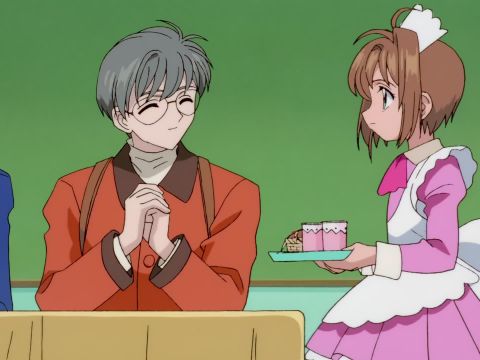
|
誘ってくれてありがとう |
| Thank you for inviting me. | |

|
助けてくれてありがとう。 |
| Oh, thank you for helping me. | |
でございます
The most polite form of the Japanese copula.こちらはアメリカから来たマイケルでございます。 This is Michael from America.
トイレはあちらでございます。 That's the bathroom over there.
ご 予約でございますね。 It's a reservation, right?

|
こちらでございます |
|---|---|
| This is where you'll be staying. | |

|
白 様でございます |
| It was you, Shiro-sama. | |

|
完敗でございます |
| I lost completely. | |
ございます - To be, to exist (the polite form of いる/ある)
ございます is the polite form of both いる and ある.京都ホテルでございます。 This is the Kyoto Hotel.
ご 予約はございますか。 Do you have reservations?
ほかにご 質問はございますか Do you have any other questions?

|
おはようございます |
|---|---|
| Good morning. | |
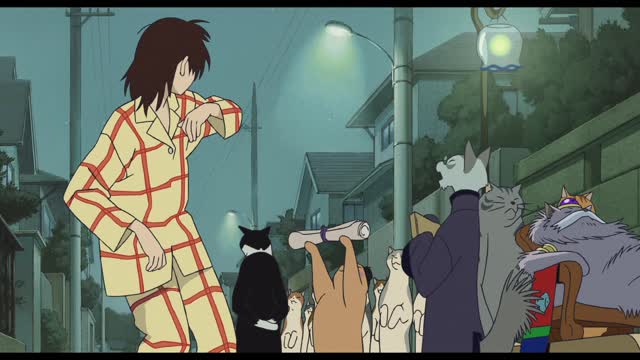
|
目録にございます |
| Here's your program. | |

|
おめでとうございます |
| Congratulations. | |
お~, ご~ - Honorific prefix
Prefix that are used to show respect.お usually precedes words of Japanese origin or words commonly used in daily life, whereas ご precedes words of Chinese origin.
However this rule has many exceptions.
お 名前 Name
お 美しい Beautiful
ご 住所 Adress

|
お 名前は? |
|---|---|
| What's your name? | |
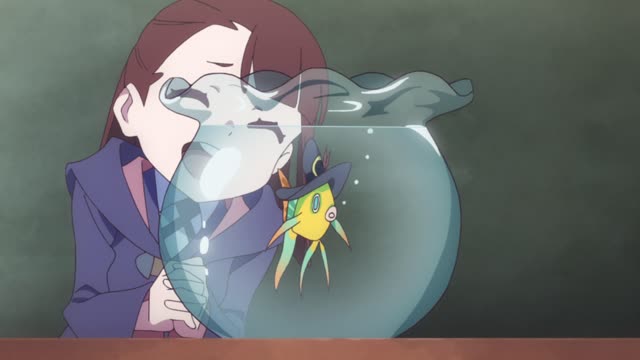
|
色鮮やかで お 美しい |
| It's very vivid and beautiful. | |

|
ご 注文は |
| May I take your order? | |
いたす - To do (polite form of する)
する can be conjugated to the polite form.It is used to say that you yourself will do something.
失礼いたします。 Excuse me.
この 仕事は 私がいたします。 I will do this job.
失礼いたします。 Goodbye.

|
感謝 致します |
|---|---|
| Thank you very much. Huh? | |

|
了解 致しました |
| I understand. | |

|
どう 致しますか? |
| What shall we do? | |
いらっしゃる - To be; to come; to go (polite version)
This is the more polite version of いる, 来る, 行く, and can take on either of these meanings.It can be conjugated to various forms like a regular verb.
formal positive: いらっしゃいます
formal negative: いらっしゃいません
The customary Japanese service industry greetings "いらしゃい" and "いらしゃいませ" are the plain and polite imperative form.
いらしゃいませ Welcome (in shops, restaurants ...)
1時に先生がいらっしゃいます。 The teacher will be here at one o'clock.
本を読んでいらっしゃる。 He is reading a book.

|
いらっしゃい |
|---|---|
| Welcome! | |

|
いらっしゃいませ |
| Can I help you? | |

|
トルケル 軍と 共にいらっしゃる |
| He's with Thorkell's army. | |
Polite Request
お~ください - Please do (honorific)
Used to express a polite request.The verb in the stem form comes between お and ください.
It has the same meaning as てください, but it's more polite.
お 入りください。 Please come in.
おくつろぎください。 Please make yourself comfortable.
フライトをごゆっくりお 楽しみください。 Please enjoy your flight.

|
お 待ちください |
|---|---|
| It will be out shortly. | |

|
お 座りください |
| Please, have a seat. | |

|
お 忘れください |
| Please forget that. | |
ていただけませんか - Could you please~
Similar to てください, this is used to make polite request.いただく means to receive.
ていただけませんか is extremely polite and is best used with strangers or superior.
The more casual forms are:
てくれませんか
てくれない
すみませんが、 少し 待っていただけませんか。 I'm sorry, but could I get you to wait for just a moment?
こちらに 名前を 書いていただけませんか。 Could I get you to write your name here?
お 金を 借していただけませんか。 Could I get you to lend me some money?

|
いろいろ 教えていただけませんか? |
|---|---|
| ...would you care to tell me a few things? | |

|
岡崎さんも、 一緒に 来ていただけませんか? |
| Won't you join us? | |

|
私と 踊っていただけませんか? |
| May I have this dance? | |
お ~ になる - To do (honorific)
お + Stem form of the Verb + になる is a formation of an honorific expression to show respect to the person who is doing something.Some verbs have a specific honorific form:
する ("to do") なさる
来る ("to come") いらっしゃる
いる ("to be") いらっしゃる
見る ("to see") ご覧になる
寝る ("to sleep") お休みになる
こちらで、お 休みになってください。 Please take a rest over here.
次の 電車にお 乗りになってください。 Please get on next train.
早く 元気になってくださいね。 Get well soon!

|
お 世話になりました |
|---|---|
| Thank you for your time. | |

|
お 休みになりました |
| They've gone to bed. | |

|
今回も 社長にはお 世話になるで |
| I'm counting on your help again. | |
ておられる
おられる is the honorofic form of おろ, which is like いる (people or animals exist).When it is connected with the て-form of another verb, it expresses the speaker's respect to the person who is doing the action indicated by the verb.
社長は、 今、 昼食を 食べておられます。
The President is having lunch now.
会長は、お 部屋で 休んでおられます。 The Chairman is resting in his room.
校長先生は、 今、 会議をしておられます。 The principal is having a meeting now.
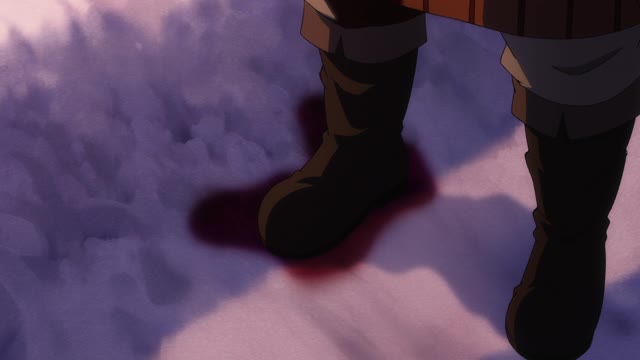
|
血をだいぶ 失っておられる |
|---|---|
| You've lost a lot of blood. | |

|
主は 全てを 見ておられる… |
| The Lord sees everything. | |

|
こちらは 我らネコの 国を 治めておられます― |
| the King of the Kingdom of Cats. | |
させて もらいたい - I would like you to let me do something
~させてもらいたい is often used to express the speaker's desire to do something.It is extremely polite expression.
させて is the て-form of させる, to make someone do, or to allow someone to do.
もらうたい is the たい-form of もらう, to receive.
僕の 意見を 言わせてもらいたい。 I would like you to let me express my opinion.
質問させてもらいたいんですが。 Could you let me ask a question?
一 晩 泊めてもらいたいんだけど。 I'd like to stay for one night.
させて頂く - (humble) to let me do something
Humble expression that is used to ask for the listener's permission about something you are going to do for the listener.今日は、お 休みさせて 頂きます。 I would like to take a day off today.
ここに 荷物を 置かせて 頂きます。 Please let me leave my baggage here.
犬に 触らせて 頂けませんか。 Do you mind if I pet your dog?
Suggestion
たらどうですか - Why don't you do ~?; What about doing ~?<Br><br>
A phrase which expresses a suggestion (literally: How would you feel if you do something?)たら is the conditional form of the verb.
たらどうですか after a verb conveys advice or recommendation.
It can have a critical tone, criticizing the person for not having performed an activity already.
In casual speech, it can be shortened to たらどう or たら.
もっと一生懸命やったらどうですか。 How about trying a little harder?
電話して聞いたらどうですか。 Why don't you call and ask?
もっと 勉強したらどうですか? Why dont you study more?

|
オリンピック 目指したらどうですか |
|---|---|
| Why not shoot for the Olympics? | |
ばよかった - Should have; i wish
ばよかったです expresses a regret that you should have done something but you didn't.ば is the conditional form of a verb.
よかった is the past tense of いい.
So litteraly, it would have been good if...
僕もみんなと 一緒に 映画に 行けばよかった。 I should have gone to see the movie with my friends.
本当のことを 教えてくれればよかったのに。 You should have told me the truth.
俺のことどう 思ってるのか 聞いとけばよかった I should've asked her how she felt about me.

|
言えばよかったじゃないか |
|---|---|
| You should have said it. | |

|
髪くくってくればよかった |
| I should've tied my hair back. | |

|
言ってくださればよかったのに |
| You should have told me so... | |
でも - Or something
This でも is a particle that indicates exemplification. It is often used in a proposal or request.When you invite or request the listening party to do something, you can use でも to make an expression polite, because でも could allow the listening party to have other options.
コーヒーでもいかがですか? Would you like coffee (or something)?
お茶でもどう? How about tea or something?
誰でも彼の名前を知っています。 Everyone (anyone) knows his name.
State
まま - As is
まま means that something has remained the way it is, without change.弟はテレビをつけたまま 寝てしまった。 My younger brother went to sleep leaving the TV on.
ビールを 買ったまま 飲まなかった。 I bought beer. but didn't drink it.
生徒は 答えず、 黙ったままでした。 The student didn't answer and stayed quiet.

|
あっ 眼鏡したまま |
|---|---|
| He left his glasses on. | |

|
それで? 結局 見つからないまま |
| What happened? No one ever found it. | |

|
このへんはまだ 古いままよ |
| This hasn't been renovated yet. | |
Volitional
しようと思う - I think i'll ...
You can use しようと思っています to talk about your intention.と思います suggests that the decision is made at the time of speaking.
と思っていますsuggests that you have already decided.
If you use the present tense instead of the volitional form, you are talking about your prediction.
明日、 勉強をしようと 思う。 I think I will study tomorrow.
日本語を 勉強しようと 思っています。 I've decided to study Japanese.
来年、家を買おうと思う。 I think I will buy a house next year.

|
彼女に 告白しようと 思うんです! |
|---|---|
| And I want to confess to her! | |

|
誕生パーティーをしようと 思うんだ |
| I'm planning on hosting a birthday party! | |
しようとする - I'll try to

|
一体 何をしようとしている |
|---|---|
| What in the world are you trying to do? | |

|
交差しようとする 心が 見えたよ |
| I saw your hearts trying to connect. | |

|
それを 私のせいにしようとして |
| You're trying to make that seem like my fault. | |
Conditionals 2
ても - Even; even if; even though~
A ても B means that B happens regardless of the situation of A.何を たべても・・・ No matter what I eat
早くてもいいんです。 Even if it is early it is okay.
試合に負けても、諦めません。 Even if I lose the game, I won't quit.

|
愛がなくても? |
|---|---|
| Even if there is no love? | |

|
だとしても 断る |
| Even so, I refuse. | |

|
頼まれても 困るよ |
| No, I can't do anything even if you ask me. | |
のに - Although, in spite of, even though~
のに connects two facts.It can be translated by although or in spite of.
Because のに connects two facts, you cannot have non-factual sentences, like requests and suggestions in the second clause.
The difference between のに and けど or が is that のに indicates something unexpected or a complaint about something.
It may also be used at the end of a sentence, in which case it indicates dissatisfaction with an unexpected result.
食べているのに 太らない。 He eats a lot, but he doesn't get fat.
君は 私に 真実を 言うべきだったのに。 You should have told me the truth.
日本語は難しいのに、頑張って学んでいる。 Despite Japanese being difficult, I am doing my best to learn it.

|
好きなのにっ |
|---|---|
| Even though you love her?! | |

|
大人なのに? |
| Even though you're an adult? | |

|
日曜日なのに 早いなあ |
| You're up early for a Sunday. | |
Additional て Forms
てよかった - I’m glad that..
Uses with the て-Form of a verb, it means you're happy that something happened the way it did.よかった is the past tense of いい.
You can also say you are glad something didn't happen by using the negative て-Form.
勉強をしてよかったです。 I am glad that I studied.
今日はデザートを食べなくてよかったです。 I am glad that I didn't eat dessert today.
今日運動してよかった。 I'm glad that I exercised today.

|
会えてよかった |
|---|---|
| I'm glad I've found you. | |

|
寄ってよかったよ |
| Good thing I stopped by. | |

|
君を 信じてよかった |
| I'm glad I trusted you. | |
ておく - To do something in advance
The て-form of a verb plus the helping verb おく describes an action performed in preparation for something.The action is done (or will be done) with the future in mind.
ておく is often shortened to おくor とく in speech, しておく will become しとく.
ちょっと調べておきます。 I will do a little research in advance.
明日のパーティーのためにビールを 買っておきました。 I bought beer (in advance) for the party tomorrow.
夏、 冷凍庫で 氷を 作っておく。 I make ice in the freezer in the summer.

|
確認しておくぞ |
|---|---|
| Let's review the plan. | |

|
一つ 言っておく |
| I should give you fair warning. | |

|
そうだ 忘れないうちに 渡しておく |
| That reminds me. I should give this to you before I forget. | |
てしまう - To do something by accident, to finish completely
You say しまいました after the て-form of a verb to say that you have ended or completed an action.You can no longer redo the action or bring it back to the former state.
So it's often use when you failed in doing something or showing regret.
てしまいました becomes ちゃいました which becomes ちゃった in casual spoken form.
間違えてしまいました。 I've made a mistake.
道に 迷ってしまいました。 I'm lost.
早く 部屋をかたづけてしまいなさい。 Hurry up and finish cleaning your room.

|
行ってしまうの? |
|---|---|
| Are you going to leave? | |

|
ウンコが 漏れてしまう |
| I'm going to shit my pants! | |

|
おーい もう 寝てしまうのか |
| Hey. You're going to sleep already? | |
てすみませんでした - I’m sorry for
すみません means "excuse me", or "I'm sorry".When you apologize about something you've done, you can use the て-Form and すみません.
Having the copula でした makes it more polite.
When you want to apologize for something you have failed to do, use なくて, the short negative て-form of a verb.
見つけられなくてすみませんでした。 I am sorry that I was unable to find it.
遅れてすみませんでした。 I'm sorry I'm late.
今日 授業に 来られなくてすみませんでした。 I am sorry that I could not come to class today.

|
遅れてすみません |
|---|---|
| Sorry I'm late. | |

|
遅くなってすみません |
| Sorry it took so long. | |

|
あ… 生意気 言ってすみません |
| I'm sorry for being so presumptuous. | |
てありがとう - Thank you for
ありがとう means "Thank you".When you want to thank someone for something they did for you, you can use the て-Form and ありがとう.
誘ってくれてありがとう。 Thanks for inviting me.
心配してくれてありがとう。 Thank you for worrying about me.
いつも一緒にいてくれてありがとう。 Thanks for always being with me.

|
来てくれてありがとう |
|---|---|
| Izumi-kun! Thanks for coming. | |

|
誘ってくれてありがとう |
| Thank you for inviting me. | |

|
わざわざ きてもらってありがとう |
| Thank you for coming here. | |
て来る - Come to
来る is a word meaning "to come."When it follows the -te form of another verb, it acts as an auxiliary, indicating that the primary verb is in progress or transition.
来る can have a number of different meanings when used as an auxiliary.
These include:
If the primary verb is a verb expressing a type of motion, then the subject of that verb is approaching the speaker in the manner expressed by the primary verb.
When it can logically be assumed that the speaker will do something and come back, 来る is used to indicate that the speaker will return after performing the action indicated by the primary verb.
The appearance of an object, or the occurrence of some phenomenon.
The continuation/repetition of an action that has continued up until the present moment.
The progress of some state or condition, eventually reaching some specified level.
変な 人がこっちへ 走ってきた。 A strange man came running towards me.
ちょっと 見てきますよ。 I'm gonna go take a look. I'll be back.
暗くなってきた。 It's gotten dark out.

|
持って来い |
|---|---|
| Bring it here. | |

|
ついて 来な |
| Come on, let's go. | |
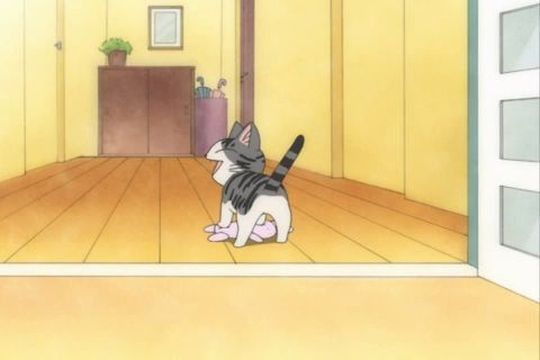
|
持って来い |
| Bring it back! | |
Difficulty
やすい - Easy to
やすい means simple or easy.Attached to a verb it means that the verb is easy to do.
にくい is an い-Adjective, so it can be conjugated.
ケーキは作りやすい。 Cake is easy to make.
東京から大阪には電車で行きやすいですよ。 It is easy to go from Tokyo to Osaka by train!
昨日の練習はしやすかった。 Yesterday's practice was easy to do.

|
刀は 折れやすい |
|---|---|
| Swords break easily. | |

|
だからこそ 操りやすい |
| That's why you're so easy to control. | |

|
僕らと 人は 干渉しやすい |
| We and humans are too easy to meddle with. | |
にくい - Difficult to
難い (にくい) means difficult.Attached to a verb it means that "it's difficult to Verb".
にくい is an い-Adjective, so it can be conjugated.
字が 小さいのでこの 本は 読みにくいです。 The type is so small that this book is hard to read.
ケーキは甘くなかったら、食べにくいです。 If cake isn't sweet, it is hard to eat.
日本語では話しにくいですが、頑張ってみます。 Japanese is difficult to speak, but I will try my best.

|
食べにくいからね |
|---|---|
| ...because they're hard to eat. | |

|
歩きにくいんだよ |
| It's difficult for me to walk. | |

|
言いにくいんだけど |
| This is extremely difficult for me to say, but... | |
づらい - Difficult to
辛い (づらい) also means "difficult to Verb" like にくい.づらい is more subjective and takes into account the speaker's own difficulties.
この 角度からは 見えづらい。 It’s hard to see it from this angle.
この 質問には 答えづらいです。 This question is difficult to answer.
この 本は 字が 小さくて 読みづらいです。 This books print is too small, it's difficult to read.

|
あ ッ もう やりづらい! |
|---|---|
| This is too hard! | |

|
生きづらい |
| It's hard to live! | |

|
食べづらいかな |
| That might be a little hard to eat. | |
Expresssion
かどうか - Wether or not
This phrase use to indicate "wether or not".彼が 今日 学校に 来るかどうか 知っていますか? Do you know whether or not he is coming to school today?
あのお 店のラーメンは 美味しいかどうか、わかりません。 I don't know whether (or not) the ramen at that shop is good.
このブランドは 有名かどうか 知っていますか? Do you know whether (or not) this brand is famous?

|
それが 可能かどうかは… |
|---|---|
| Whether that's possible... | |

|
行うかどうかだ |
| It’s to act or not to act. | |

|
うまいかどうかは 知らんが |
| I don't know if it's good or not. | |
となる - To be; to become
phrase used to indicate that something exists in a certain state after some change.私たちの 手助けとなるには、 彼は 仕事が 遅すぎる。 He works too slowly to be helpful to us.
数字は 合計230となる。 The figures add up to 230.
何とかなるだろう We'll make it.

|
xは4となる― |
|---|---|
| x becomes 4. | |

|
となると 非常口 |
| Then, it comes down to the emergency exit! | |

|
新世界の 神となる! |
| the god of the new world! | |
Particles
しか - (nothing) but
When しか is used after a noun, it means "nothing/nobody but " or "only .It's a is binding particle used to emphasize the noun that comes before it, and it always comes with a negative predicate and means "only" or "nothing but --."
この 村には 100 人しか 人がいない。 In this town, there are only 100 people.
この 話は、あなたにしか 話していない。 I haven't told this to anybody but you.
私は 野菜しか 食べません。 I only eat vegetables.

|
もうやるしかない |
|---|---|
| I have no other choice... | |

|
ごめん 大きいのしかなかった |
| Oh, I'm sorry. I only have a large bill. | |

|
FBと 私しか 知らない |
| Only FB and I know it. | |
Ending particles
だい
Interrogative sentence-ending particle used in informal male speech for wh-questions (i.e. who, what, when, where, why), as well as "how".It transforms a regular declarative sentence into a question, and should be pronounced with a rising intonation.
そいつは 誰だい。 Who's that?
なんだい? What is it?

|
どうだい |
|---|---|
| How is it? | |

|
これ 何だい |
| What is he? | |

|
それはなぜだい |
| And why would that be? | |
かい - Turns a sentence into a yes/no question
かい is used only for yes-no questions.Since かい is used in informal speech, preceding sentences must be in the informal form.
This is more casual Japanese and is most often used with children.
大丈夫 かい? You okay?
今年の 春は 暖かいね。 It's warm this spring, don't you think?
今朝は 飯を 食べたかい? Did you have a meal this morning?

|
大丈夫かい |
|---|---|
| Are you okay? | |

|
違わないかい |
| Is that correct? | |

|
お 前 泣いているのかい |
| Are you crying, dear? | |
Reason
なくて - Is not
"なくて" is the て-form of the negative "ない."It is often combined with the potential form of a verb, It is used in a structure like "verb, inf, negative + nakute + main clause".
In that case, the "なくて" phrase indicates a cause or reason for what is expressed in the main clause.
最初は英語が話せなくて困りました。 At first. I had trouble because I couldn't speak English.
そんなにいやなら、もう学校に行かなくていいです。 You don't have to go to school if you hate it so much.
うまく歌えなくてはずかしい思いをした。 I couldn't sing well and was embarrassed.

|
そうじゃなくて |
|---|---|
| That's not what I mean! | |

|
いないんじゃなくて 作らないの。 |
| I'm single because I want to be! | |

|
一人では 食べ 切れなくて |
| I can't eat it all by myself. | |
Verb
やる - Send; give; do
Just like する, やる is an extremely common, extremely flexible Japanese verb.It can be used with any of the following meanings:
1) to send/move someone/something to a far-off place
2) to give something (to someone/something of equal/lower status)
3) to perform an action or to act a certain way
4) to flow into something (*rarely used*)
5) when suffixed to the -masu stem of another verb, it may indicate that the action is directed towards something far away.
6) when suffixed to the -masu stem of another verb, it may also indicate the completion of an action, particularly when used in the negative form.
7) it may follow a verb in -te form, in which case, it either acts as a giving verb, or serves to strengthen the intention of the speaker.
妹の 誕生日に 小説をやるつもりだ。 I'm going to give a novel to my sister for her birthday.
明日、 一緒にサッカーをやりませんか。 Would you like to play soccer tomorrow?
次は… 絶対に 止めてやる I swear I'll stop it next time.

|
やるぜ |
|---|---|
| Let's go! | |

|
俺もやる? |
| Should I do one, too? | |

|
やるよ |
| Take this. | |
かかる - To take
かかる conveys the meaning of something taking time or money.The construction is かかる.
To make a question using かかる, you would add どれくらい or どのくらい in front, Note though, that since this word can be used with both time and money, chances are that there will be confusion if you don't specify the subject.
一 時間かかります。 It takes 1 hour.
五 百 円かかります。 It takes 500 yen.
東京 駅までどれぐらいかかりますか。 About how much (time/money) does it take to Tokyo station?

|
時間がかかると 思う |
|---|---|
| I think it'll take time. | |

|
金がかかるんだよ |
| Is expensive. | |

|
ありゃまだかかるな |
| I suppose they'll take a while still. | |
Auxiliary Verb
出す (だす) - To suddenly begin, to suddenly appear
出す (だす) means to take out, to put out.When attached to the stem form of a verb, it indicates that something has happened, appeared or changed position suddenly.
雨が 急に 降り出した。 It suddenly started raining.
彼は 店から 飛び出した。 He dashed out of the store.
彼を 呼び出しても 良いですか? Would it be alright if I called him?
Verb
Verb + 気 - Feel like doing (verb)
気 is used to convey that the subject feels like doing something, or has the will to do something.がする - To smell; hear; taste
Meaning: to smell; hear; or taste.いい 匂いがする。 It smells good.
血は、 鉄の 味がする。 Blood tastes like iron.
カレーのにおいがする。 I smell curry.

|
都会のニオイがしますよ |
|---|---|
| You smell of the city. | |

|
あっ いい 香りがしてきた! |
| Hey! It's starting to smell good! | |

|
何か 上で 音がしたな |
| I heard something up there... | |
から作る(からつくる) - Made from; made with
作る (からつくる) means to make, produce.Proceeded with either から or で, it means made from or with.
ガラスは 砂から 作られています。 Glass is made from sand.
バターは 牛乳から 作られています。 Butter is made from milk.
あんこは 小豆で 作る Anko is made from adzuki beans.

|
それ カメラから 作ったの? |
|---|---|
| Did you make it out of parts from th' camera? | |
Structure
のは - It is ~ that ~; the one who ~ is ~...
A structure that indicates new, important information by placing it between and the copula.They can be translated by "the one who ..." or "that which …" in english.
この 仕事をするのは 私だ。 I am the one who does this job.
太一くんと 話をするのは 楽しい。 Talking with Taichi is fun.
それを 買うのはだめだ。 Buying that is useless.

|
謝るのは 私だ |
|---|---|
| I'm the one who has to apologize. | |

|
勝つのは 私だ |
| I will be the one to win. | |

|
悪いのは 誰だ? |
| Who is bad? | |
Unsorted
なら - Speaking of ~
なら is a particle is used to mark a topic.Usually, the topic marking particle is は, but when you want to expand on a topic that you have just talked about, you can use なら as a topic marking particle to emphasize the topic.
It corresponds to "speaking of ---" in English.
君なら、できる。 As for you, you can do it.
日本語のことなら、先生に教えてもらった方がいい。 As for Japanese, you should have the teacher teach you.

|
なら ご 安心を |
|---|---|
| Then let me reassure you: | |
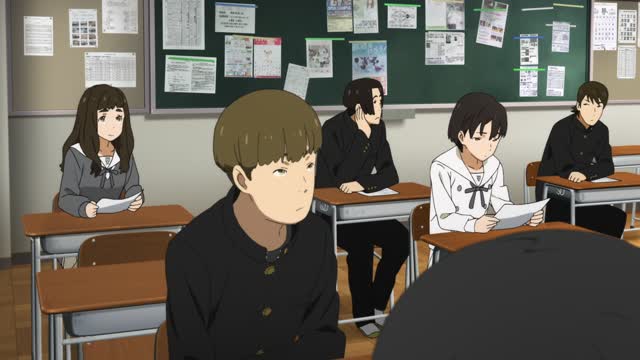
|
まあ それなら |
| - Well, in that case... - Yeah. | |

|
なら 僕に 任せろ |
| In that case... I'll do it. | |
ずに - Without doing somehting
ずに is used as an adverb meaning "without doing something".It attaches to the Stem form of a verb.
彼は 寝ずに 勉強した。 He studied without sleeping.
彼は朝ごはんを食べずに仕事に行きました。 He left for work without eating breakfast.
彼は 何も 言わずに 去ってしまった。 He left without saying anything.

|
走らずにだよ。 |
|---|---|
| Without running! | |

|
走らずにだよ。 |
| Without running! | |
だけで - Just by doing ~~
Expression used to indicate a minimum requirement.It follows nouns, adjectives, verbs in plain form.
見ているだけです。 I'm just looking.
パーティーに行くだけで楽しい。 Just going to a party is fun.
顔だけで、彼はいい人と分かった。 I could tell he was a good person just by his face.

|
今の 君だけでいい |
|---|---|
| The present you is fine with me. | |

|
私と 石上 君だけで |
| Just the two of us. | |

|
歩いてるだけでも? |
| Just for walking around? | |
だけでなく - Not only - but also
Expression that indicates that the item it follows is an insufficient explanation.“A だけだなく B” usually translates as “not only A, but also B”.
肉だけでなく、 野菜も 食べなさい。 Eat not only meat, but also vegetables.
私だけでなく、私の友達も日本語が喋れる。 Not only me, but also my friends can speak Japanese.
海は綺麗なだけでなく、温かい。 The ocean is not only beautiful, but also warm.
それぞれ - Each; respectively
It's a noun meaning "each" or "objectively" when you refer to two or more people/things.It may also be used as an adverb, in which case it means "one-by-one" or "respectively".
それぞれ 名前を 教えて 下さい。 Please tell me each of your names.
お 兄ちゃんと 流川 君でそれぞれ 30 点ずつ Big brother and Rukawa-kun, both will get 30 points.
それぞれ 全然 違うんですから All of them are completely different.

|
それぞれ 忙しいみたいだ |
|---|---|
| I guess they're all busy doing their own thing. | |

|
立場それぞれ 人それぞれ |
| Different people with different views. | |

|
それぞれ 全然 違うんですから |
| All of them are completely different. | |
おかげ - Thanks to
Used to expressed gratitude to something or someone when things turn out as desired.君のおかげで、私は幸せ者になった。 Thanks to you, I have become happy!
勉強のおかげで、試験を合格した。 I passed the test thanks to studying.
お 前のおかげだよ そっちこそ… It was all thanks to you.

|
先生のおかげです |
|---|---|
| Because of you, Mr. Hayashida. | |

|
あの 人のおかげね |
| And it's all thanks to him. | |

|
これも あなたのおかげ |
| I have you to thank in part. | |
Conjunction
それでも - But; nevertheless; in spite of that
Conjunction used to affirm the sentence that precedes it as true, and introduce new contradictory material in the sentence that follows it.タバコは体に悪いと言われている。それでも、止めにくい。 It is said that smoking is bad for you and yet it is tough to quit.
高いのに、それでも買うつもりですか。 It is expensive and yet you are still planning on buying it?
このコーヒーは甘いですが、それでも砂糖を加える。 This coffee is sweet but nevertheless, I will add sugar.

|
それでもダメ |
|---|---|
| And those don't help? | |

|
それでも 行くの |
| And we're going in spite of it all. | |

|
けどそれでも 僕は… |
| But... even so... I... | |
Conjunction
それと - And; also; in addition; as well
Conjunction used to introduce an additional item or statement in spoken Japanese.It is often used when the speaker wants to add an item or statement which she/he has forgotten to mention.
ああっ 事故か? それとも… An accident? Or...
それと あと… ありがと。 Also, thanks.
それと こいつもね And that goes for him, too.

|
それと こいつもね |
|---|---|
| And that goes for him, too. | |

|
それとも そっちか? |
| Or is it you? | |

|
まあね それとさ あ? |
| Kind of. And another thing... Huh? | |
それに - In addition; moreover; furthermore
Conjunction used to introduce an additional item or statement.Although it can be used to join nouns directly, it is usually used to combine clauses (along with the particle "し") or sentences.
運動は楽しいです。それに体にいいです。 Exercise is fun. In addition, it's good for you.
このアニメはとても 人気がある。それに、 音楽がいい。 This anime is very popular. In addition, it has good music.
これはとても 美味しい、それに 値段もいい。 This is very tasty, and the price is also good.

|
それに この 雨… |
|---|---|
| And this rain... | |

|
それに 旅の 途中だ |
| And besides, we're in the middle of a trip! | |

|
それに 女と 戦う 趣味はねぇ |
| Besides, I don't like fighting girls. | |
それも - In addition
Conjunction that is used to add more specific information to something that has already been said.Implies that the item/clause that precedes it and the item that follows it are of equal importance or relevance.
あっ… それも あるわ 正直ね Well, that’s one of the reasons.
いや それも やめてくれ No. That won’t work either.

|
それも、 一日も早く |
|---|---|
| And we must do it as soon as possible. | |
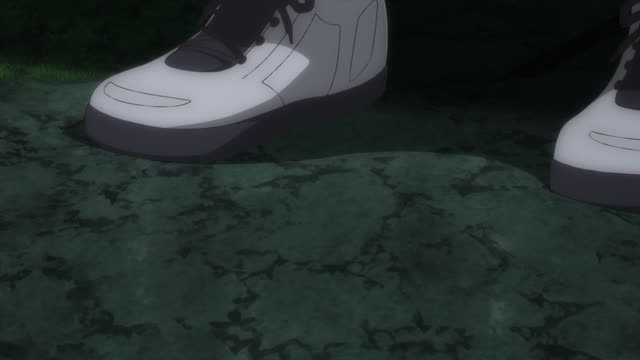
|
それも 今 後悔してる |
| And I regret that right now, too. | |
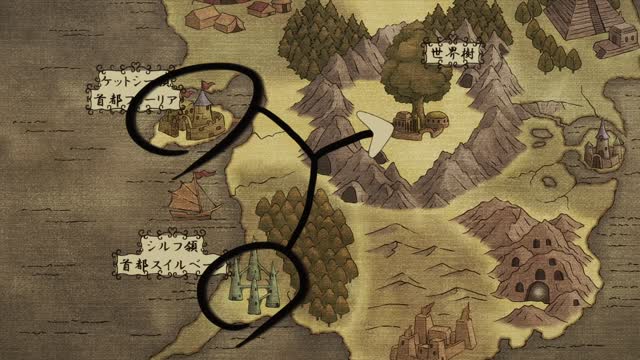
|
それも 可能な 限り 早く |
| And as soon as possible. | |
Adverbs
ただ - Only; just; simply; that's all
Adverb that emphasizes that nothing exists/happens other than that which is explicitly stated.It is often used in combination with the "だけ" particle.
私はただ 彼女と 話したかっただけです。 I simply wanted to talk to her.
私 達はただの 友達です。 We are just friends.
ただ 聞いてみただけです。 I just wanted to ask.

|
ただの 紙だ。 |
|---|---|
| Oh... It's just paper... | |

|
その 回答はただ 一つ |
| There is only one answer! | |

|
ただ 従え |
| Simply obey. | |
つまり - That is to say; namely; in other words; what i mean is
Adverb used to summarize what has been mentioned in the previous clause or sentence, or to express this information more succinctly.It may also be used simply to add stress to the statement that follows it.
彼は金がある。つまり 金持ちなんです。 He has plenty of money. What I mean is, he's loaded.
つまり 何が 言いたいのですか。 In short, what is your point?
そがつまり 、 相棒なんだよ That's what it means to be partners.

|
つまり 暗殺だ |
|---|---|
| In other words: an assassination. | |

|
ふむ つまり… |
| So what you're saying is... | |

|
つまり 20 年 後 |
| In other words, 20 years later. | |
やっと - Finally, at last, barely
Adverb that indicates that something occurs, but requires a significant amount of time, or numerous obstacles must be overcome.It may also express the nuance that something is barely adequate.
最後のテストがやっと 終わった。 I've finally finished the last of my tests.
やっと のことで、 彼女に 会えた。 At long last, I was able to meet her.
やっと 帰ってきた。 You're finally back.

|
やっと 飯だ |
|---|---|
| Finally, time for a meal. | |
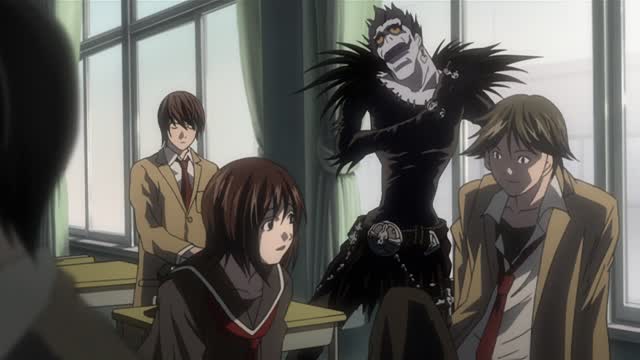
|
やっと 終りか |
| It's finally over. | |

|
やっと 来たのか |
| It's about time. | |
やっぱり - As expected
This adverb is used when a situation conforms to previously formed expectations, what is universally accepted as the norm, or when a repetition of a past experience occurs.There are at least three other variations of this word, as can be seen below:
やはり
やっぱり
やっぱ
やっぱし
やはり 東京の 夏は 暑いですね。 As expected, summer in Tokyo is hot!
ほら やっぱり … See? I knew it
やっぱり あんたたち だった のね So you were the ones behind this!

|
やっぱり 祐一 君だ |
|---|---|
| I knew it was you! | |

|
やっぱり 子供ですわ |
| He is a child after all. | |

|
やっぱりてめえか |
| It was you, after all?! | |
初めて - First time doing something
Adverb used to express that it is the subject's first time to experience something.Although it is normally used as an adverb preceding another verb, it can also be used as a noun, or an adjective when followed by the particle の.
初めて にしてはいいんじゃない Not bad for your first try.
こんなの 初めて … 変だよ! I've never experienced this. It's weird!

|
初めて 食べた。 |
|---|---|
| I've never had this before! | |

|
初めて 見た |
| I've never seen it before. | |

|
初めての 言葉 |
| Words I’ve never used... | |
どうも - I don't know why but; i tried but; for some reason
Adverb with several different meanings.It can be used to indicate:
a) that a desired result does not come about no matter how hard one tries;
b) that the reason for something is unknown;
c) a strengthening of words of apology or thanks.
When used as a standalone word, it's an expression of thanks.
あの 映画のラストはどうも よく 分からなかった。 I didn't really understand the end of that movie.
どうも コンピューターの 調子が 悪いようだ。 It seems that something is wrong with the computer.
どうも ありがとうございました。 Thank you very much.

|
どうも 妙だ |
|---|---|
| It's certainly strange. | |

|
どうも 最近 夢見が 悪いな |
| I've been having some bad dreams lately. | |

|
どうもご 馳走さまでした |
| Thank you very much for the food. | |
きっと - Surely; undoubtedly; almost certainly; most likely
Meaning: surely; undoubtedly; almost certainly; most likely.彼女はきっと 来ます。 She will certainly come.
明日、きっと 雨が 降る。 I'm sure it will rain tomorrow.
きっと 雪が 降るでしょう。 It will probably snow.

|
きっと 来るよ |
|---|---|
| He'll definitely come. | |

|
きっと こちら |
| It's definitely this way! | |

|
きっと 何かあるんだと 思う |
| There must be something here. | |
Suffix
さ - -ness; -ly
さ is a suffix.When you attach it to a noun, it turns it into an adjective.
For い-Adjective, drop the い and さ.
For な-Adjective, add さ after the adjective.
何て 広さだ What a huge place...
高さの 利が 出た His height made a difference.
牛の 美しさが 分からんとは! Why can't you understand the beauty of cows?

|
バレーボールは 高さが 必要 |
|---|---|
| Height is needed for volleyball. | |

|
あなたの 弱点は 甘さ |
| Your weakness is your naïveté. | |
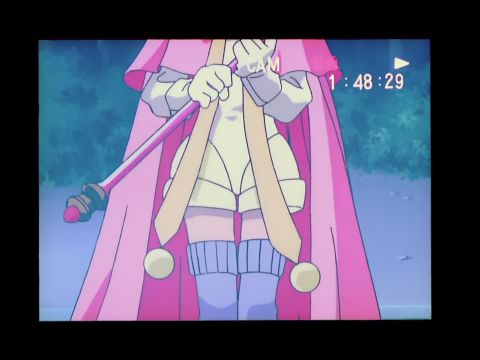
|
かわいさ さく 裂ですわ |
| You really are bursting full of cuteness! | |
ずつ - A piece, each; by, at a time
Suffix that that indicates equal distribution of quantity.It may also follow other quantity-related particles such as "くらい".
1 匹ずつか One by one.
子供たちはクッキーを5 個ずつ 食べた。 The children ate five cookies each.
彼の 病気は 少しずつ 良くなった。 His sickness got better little by little.
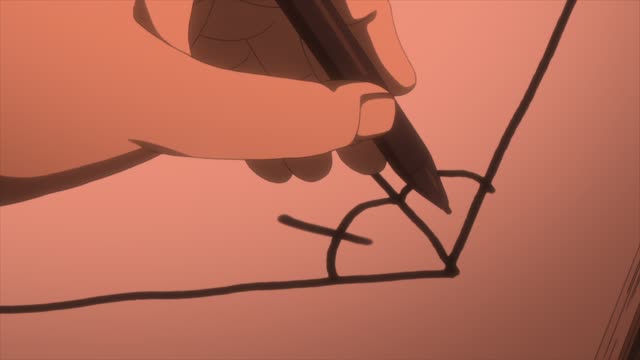
|
ちょうど 60 度ずつ |
|---|---|
| They formed roughly sixty-degree angles each. | |

|
そう 1 匹ずつ 倒すんだ |
| Right, I can get them one by one! | |

|
みんな 一本ずつ 引いてくれ |
| Everyone grab one each. | |
っ放し (っぱなし, っはなし) - Continue, leave
Auxiliary used in spoken Japanese to indicate that something has been left in an undesirable state.It attaches to the -masu stems of verbs.
っ放し converts verbs to nouns.
To use っ放し as an adverb, it should be followed by に.
To use っ放し as a verb, it should be followed by a form of にする.
その 赤ちゃんはもう 10分 近くも 泣きっぱなしだ。 That baby has been crying for almost ten minutes.
誰かがそのドアを開けっぱなしにした。 Someone left the door open.
ライトをつけっぱなしにしないで。 Don't leave the light on.
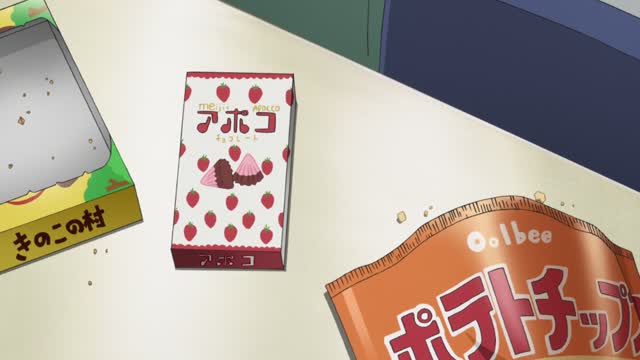
|
お 菓子 出しっ放しに… |
|---|---|
| I left snacks out... | |
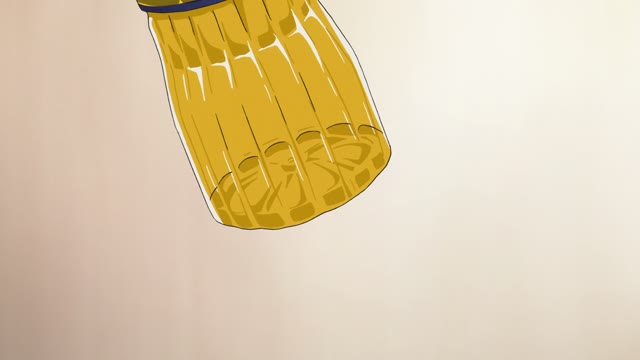
|
ああ 持たせっ 放しだった |
| Oh, I've had you holding onto that all this time. | |

|
携帯の 電源 入れっ 放しは 駄目でしょ |
| You can't leave your phone on. | |
振り (ぶり) - For the first time in...
Attached to a measurement of time it takes on the meaning of "first time in (the measurement of time)".いさしぶり is a greeting you use when you haven't seen someone in a long time for example.
彼に 会うのは 半年ぶりです。 It's been six months since I met him last.
今朝一 ヶ月ぶりに 雨がふりました。 It rained for the first time in a month this morning.
武さん、 久しぶりですね。 Takeshi, it's been a while.

|
ああ、 月 君 久し振り |
|---|---|
| Sure. Light, I haven't seen you around in a while. | |

|
久しぶりの 収入だ |
| First reward we picked up in a long time. | |

|
久しぶりだ こんな 味 |
| It hasn't tasted this good in a long time. | |
Time
おきに - Repeated at intervals, every~
This is used following a measurable noun (minutes, hours, days, weeks, months, distance, etc..)電車は 5 分おきに 走っています。 The trains run every five minutes.
このバスは 15 分おきに 出ている This bus leaves every 15 minutes.
1 時間おきにダウンタウン 行きの 電車が 来ます。 There's a train to the city every hour.

|
きっかり1 時間おきに一 人ずつ… |
|---|---|
| One at every hour... | |
Decision
ことにする - To decide on
This is used to express what one has decided on of their own will.Add it after the short form present tense of a verb to say that’s what you’ve decided on.
To use with a noun, remove the こと
ことにしている means that you have decided to do something as a regular practice"
家を 買うことにした。 I decided to buy a house.
本を かくことに した! I’ve decided to write a book!
1 年 休学することにしました。 I decided to take a one-year leave from school.

|
見なかったことにしましょう |
|---|---|
| Let's pretend we never saw this... | |

|
ええ 行くことにします |
| All right, I will. | |

|
わたし 今夜 発つことにしたの |
| I've decided to go away tonight! | |
ことになる - It has been decided that..; It turns out that..
This is used to express something that has been decided or determined by factors outside of one’s own resolve.Though sometimes it can be an indirect way to say something that may indeed be one’s own resolve.
If you want to express something that has been determined by one’s own resolve, you can use the similar grammar point ことにする instead.
This grammar point often uses the past version of なる to express that something has already been decided.
アメリカに 行くことに なった! It’s been decided: I’m going to America!
日本に かえる ことに なった。 It’s been decided that I will go back to Japan.
来月、 帰国することになりました。 I must go back to my country next month.

|
困ったことになったよ |
|---|---|
| This puts me in a tough spot. | |

|
厄介なことになったな |
| I got myself involved in some bad business. | |

|
ヤバいことになってんぞ。 |
| This is bad. | |
Interjection
それが - Well, despite what you might think
Interjection that signals that the speaker is going to provide an unexpected response to a question.それが もう 覚えてなくて… The thing is, I don't remember at all.
どうだった? それが、いまいちだったんだ。 How was it ? Well, it wasn't so great actually.

|
それがまだ |
|---|---|
| Actually, not yet... | |

|
それがいいんじゃない |
| But that's what's great about it. | |

|
それが 決定的なことに… |
| But then something happened to make it official... | |